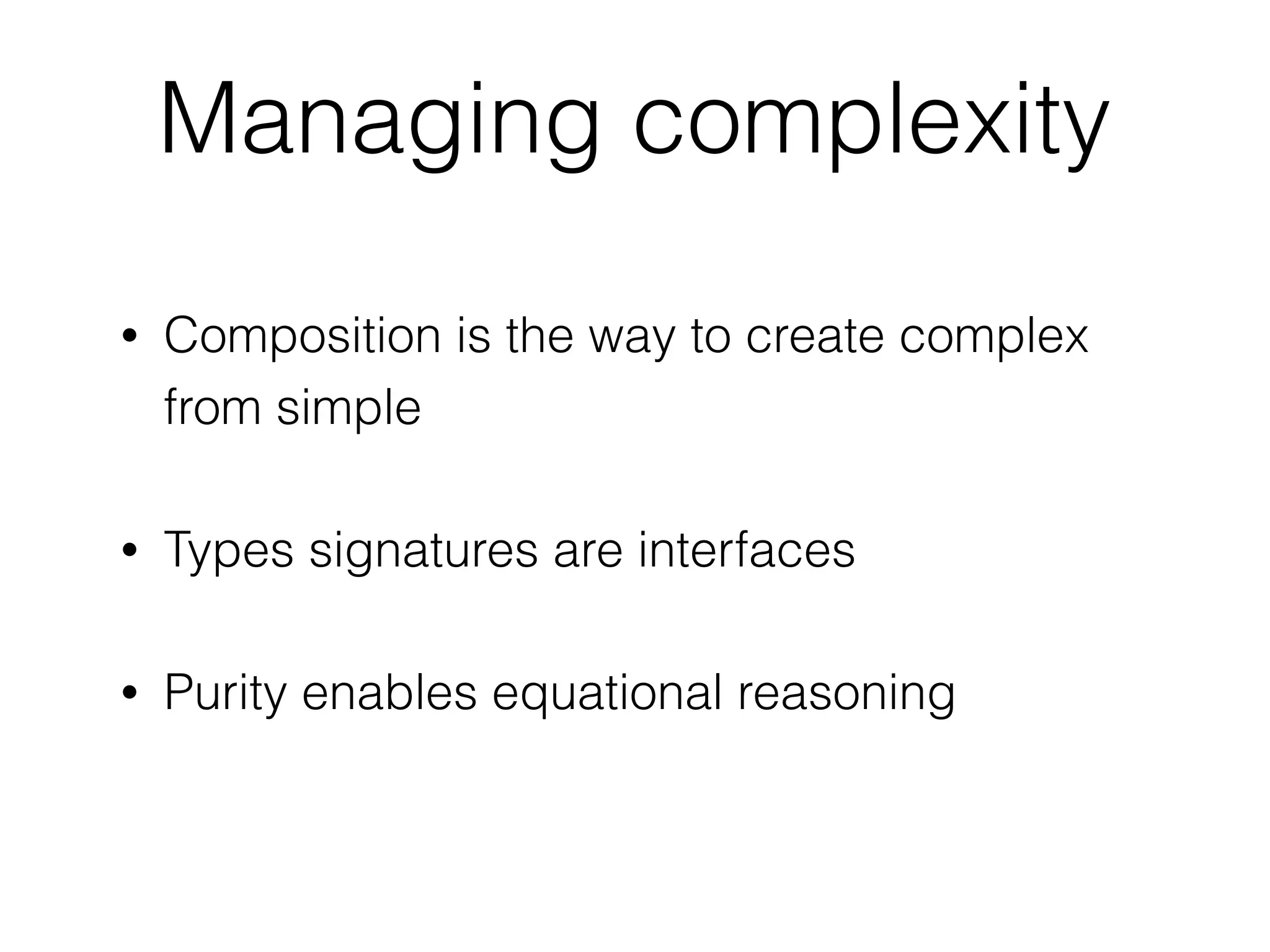The document discusses functional programming in PHP, focusing on concepts such as pure and impure functions, function composition, and higher-order functions. It illustrates how to implement mathematical functions in code, highlights the benefits of using pure functions, and explains topics like currying and function composition. The document provides code examples to demonstrate these concepts and their practical applications.
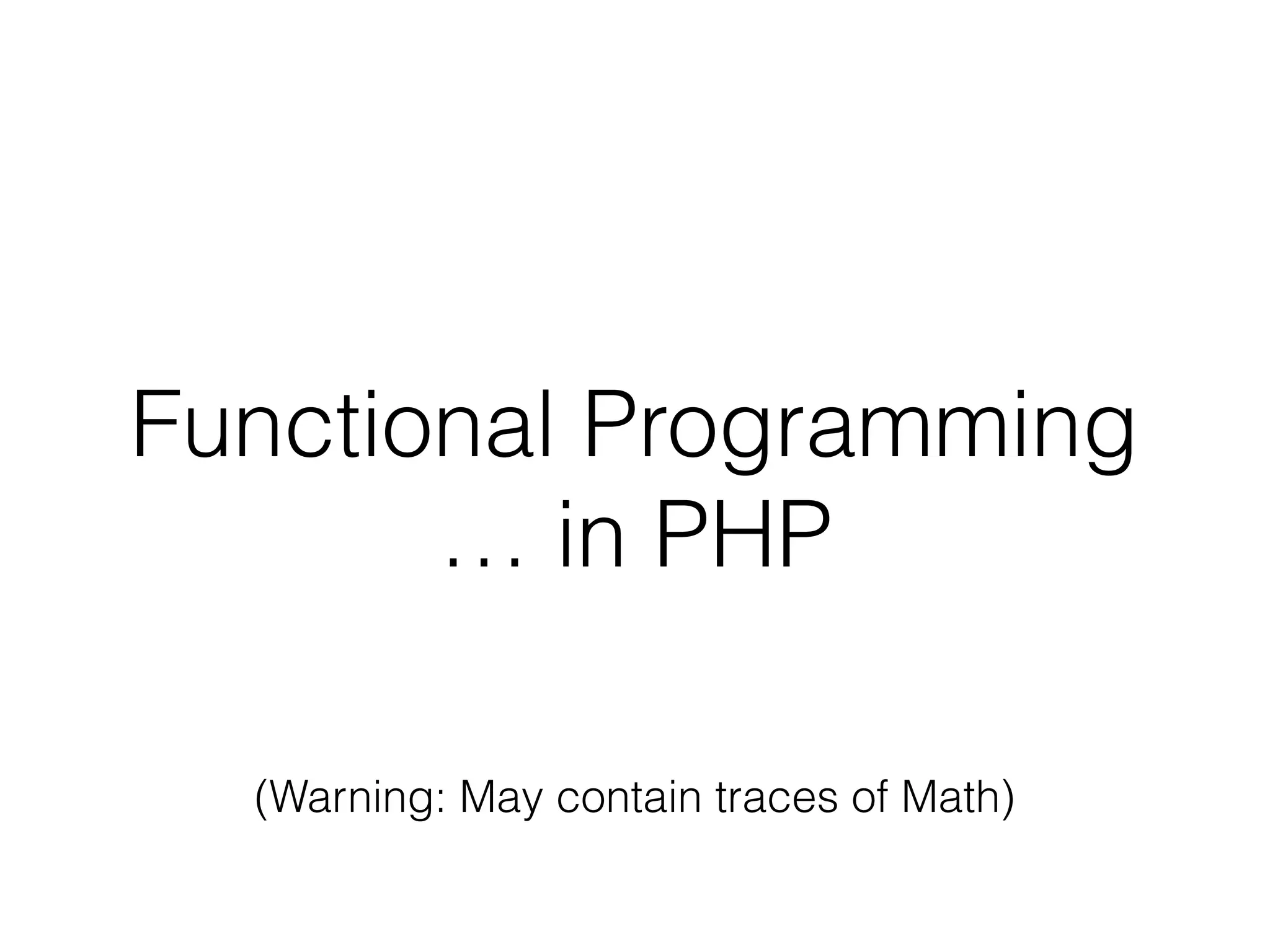
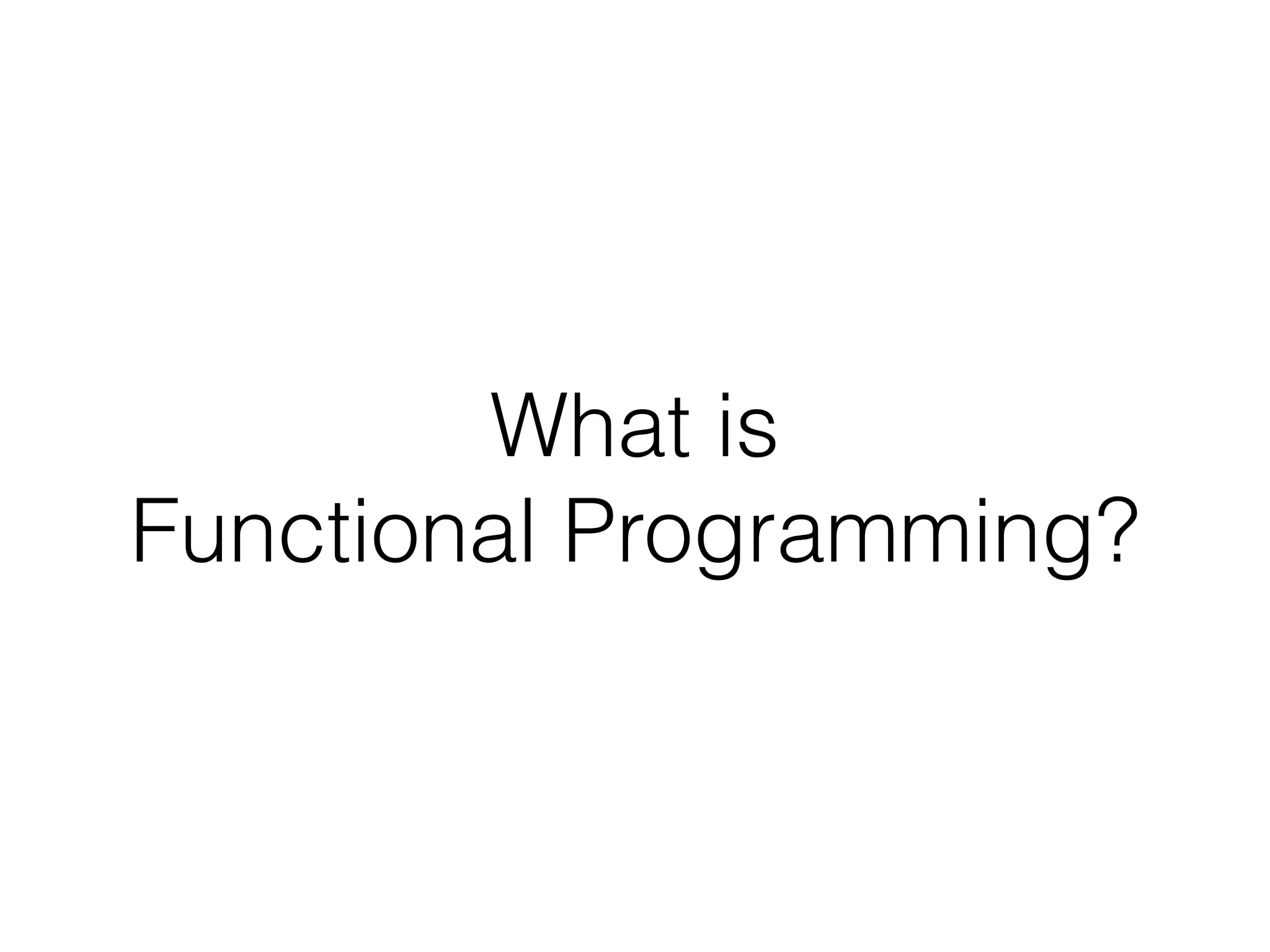
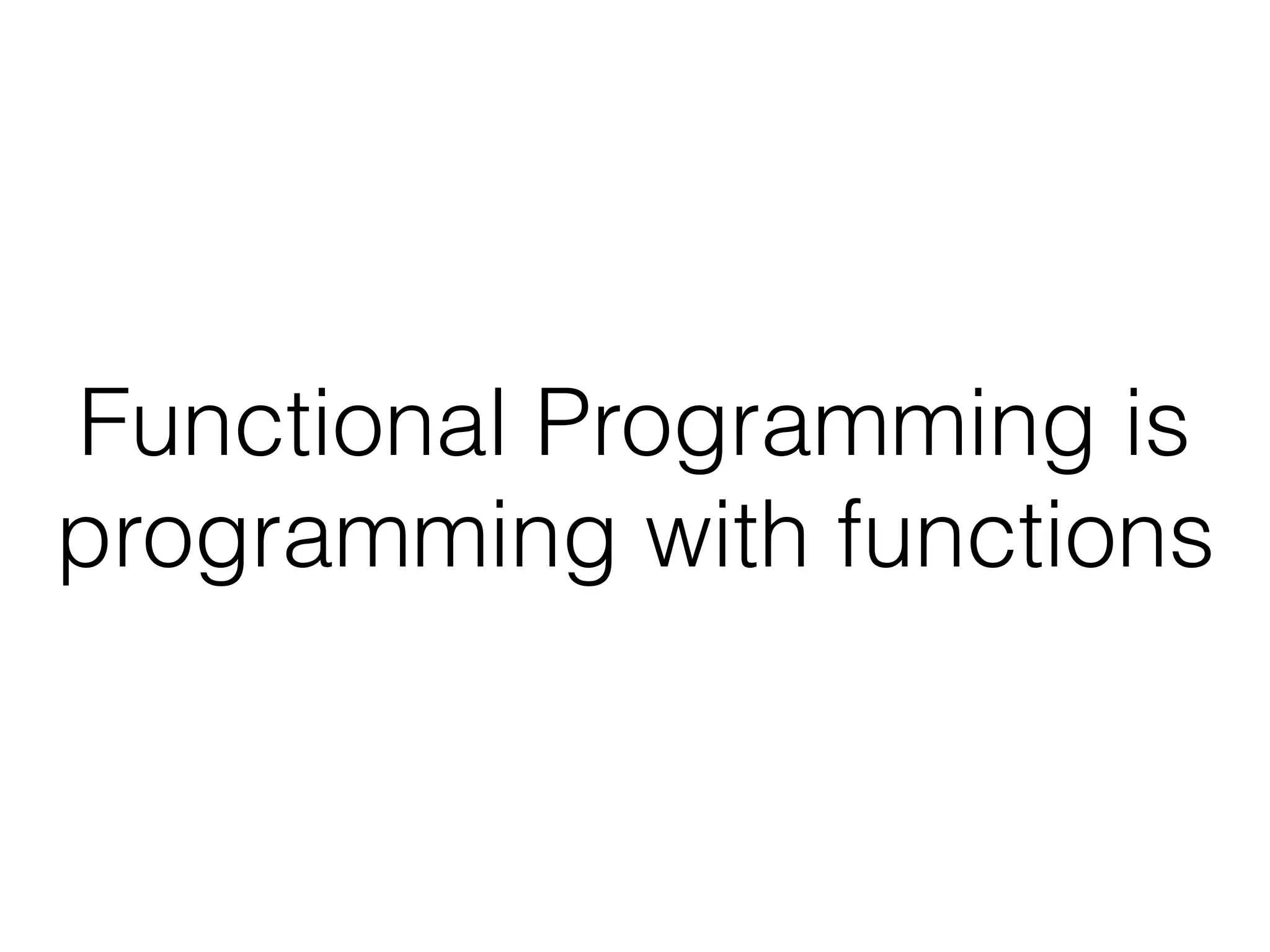

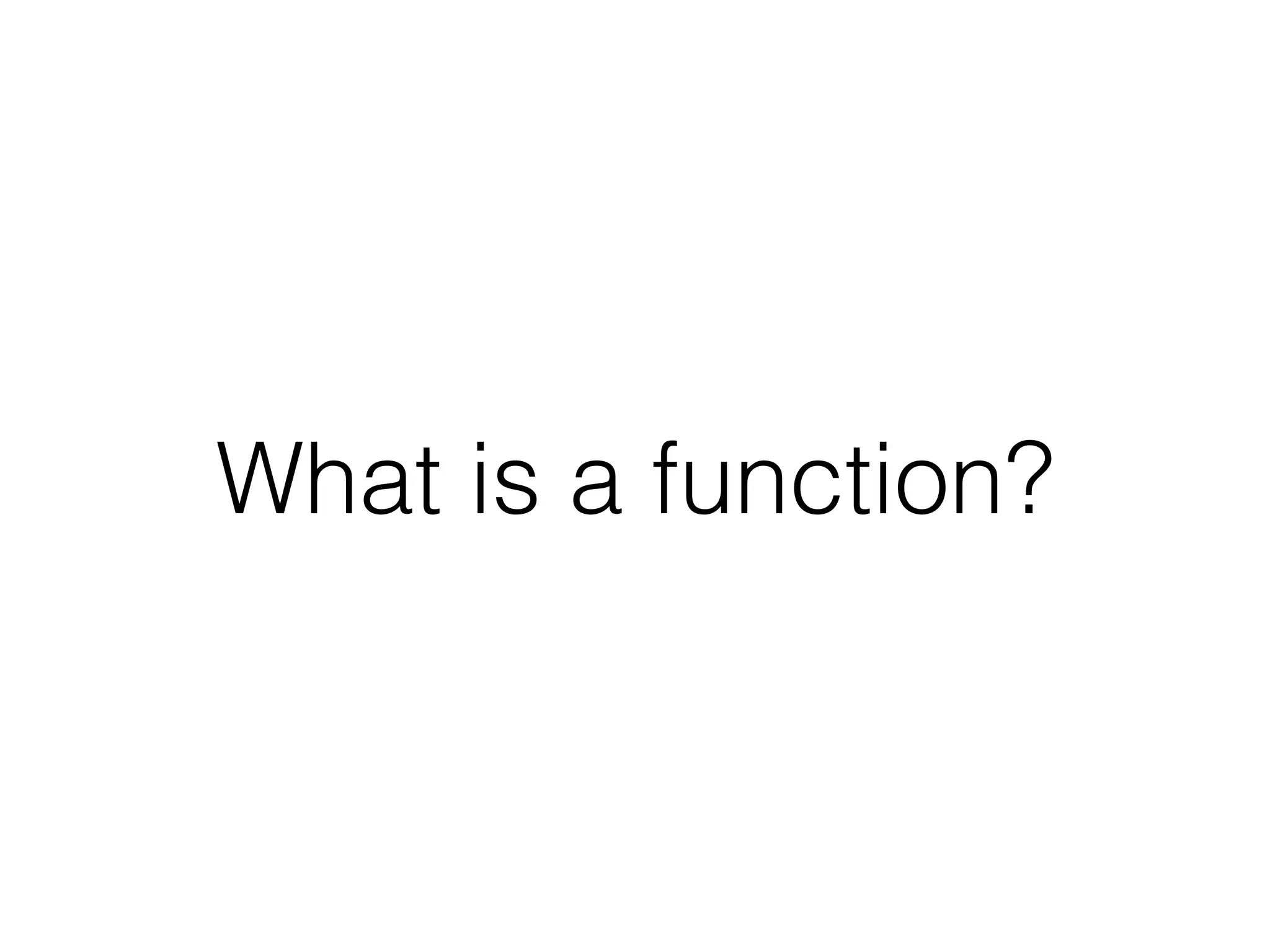
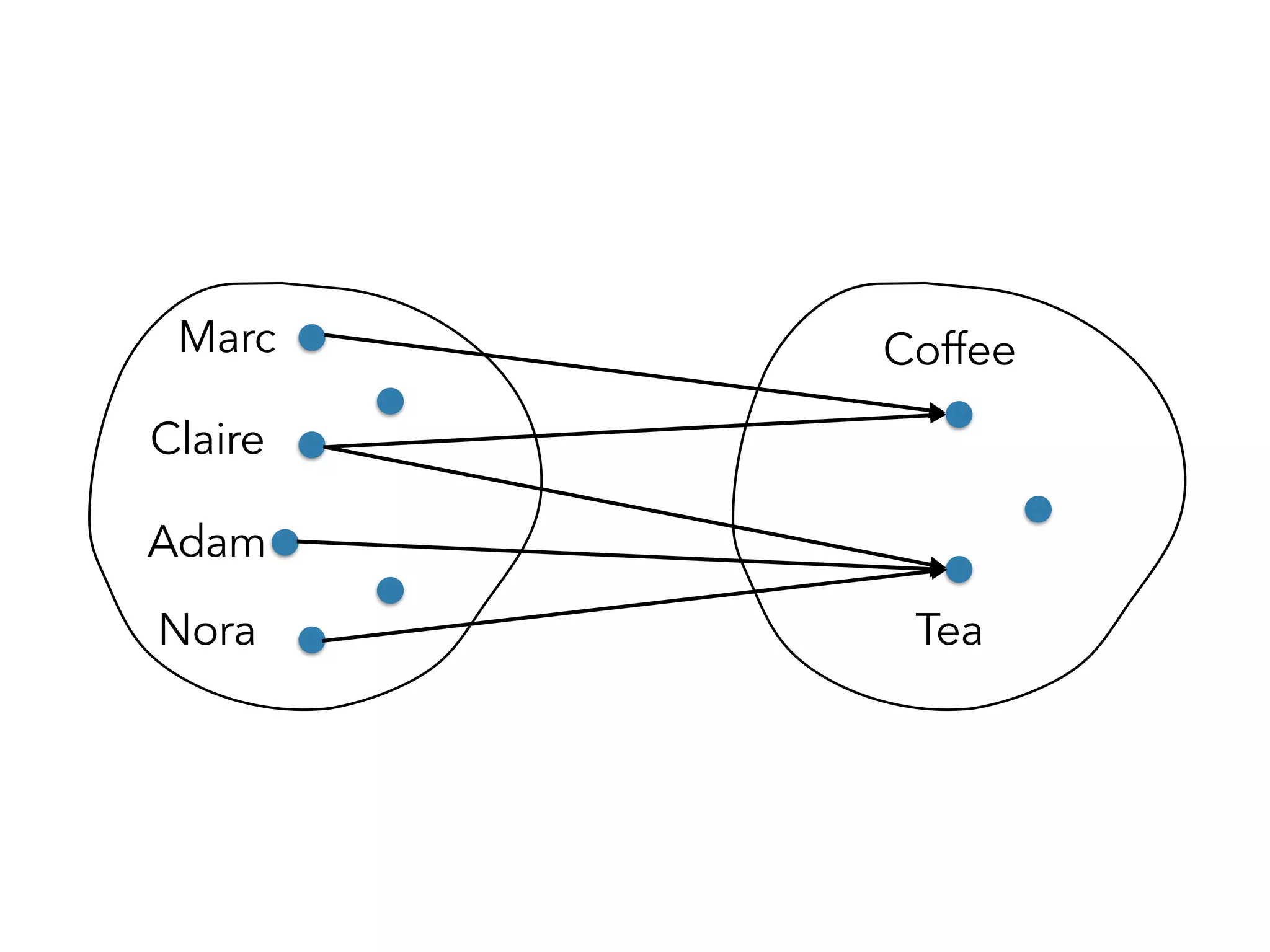
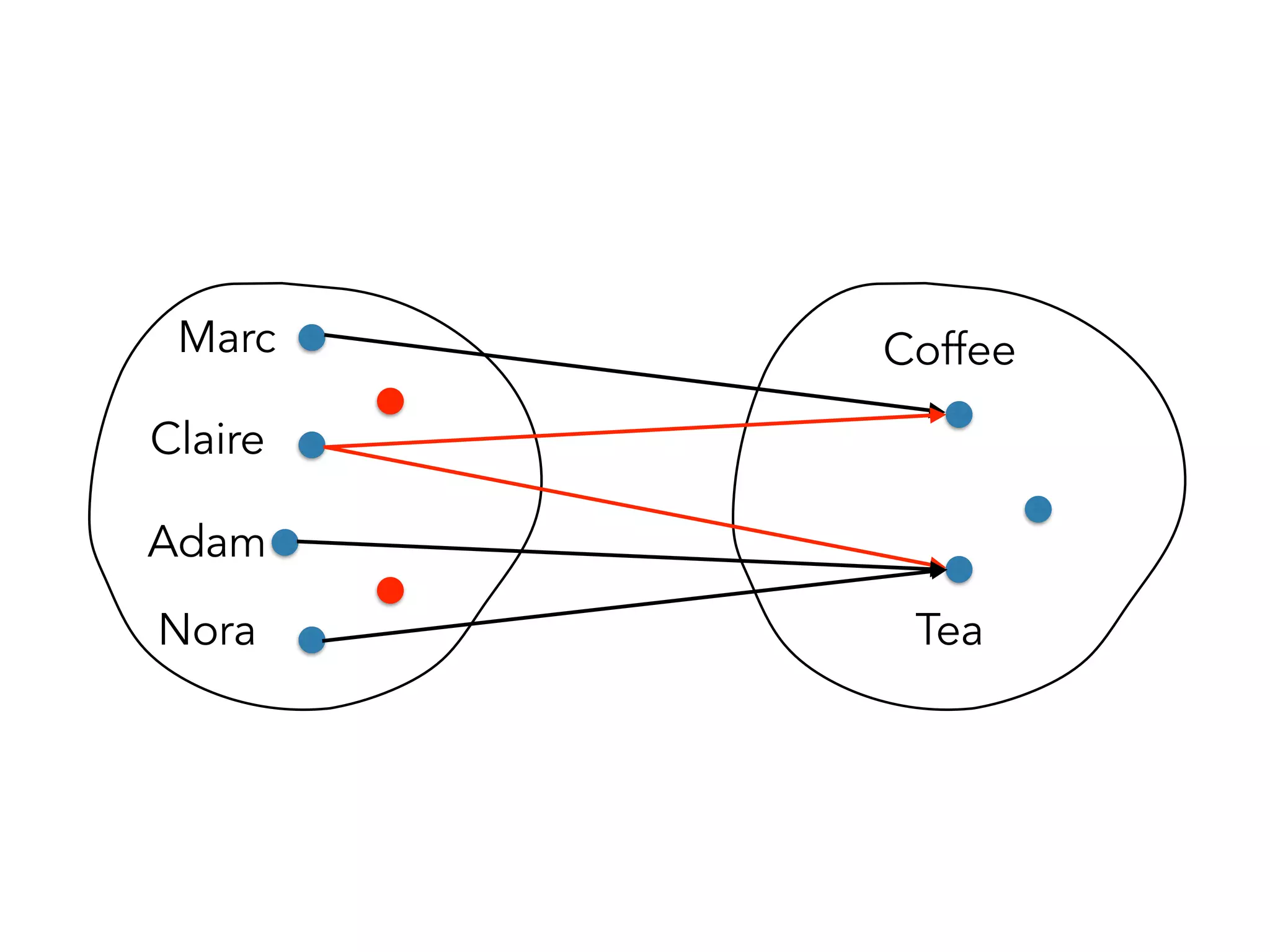
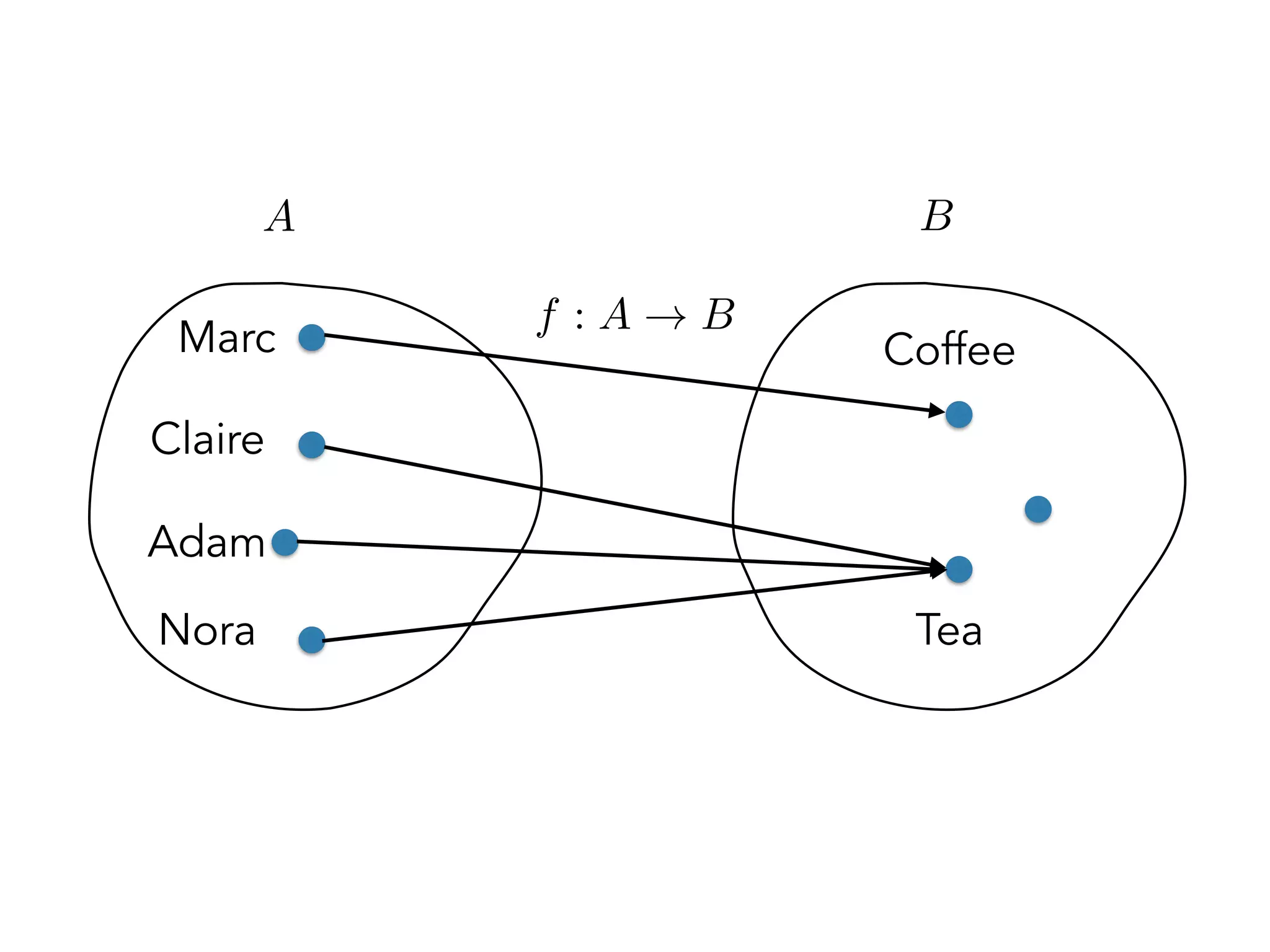
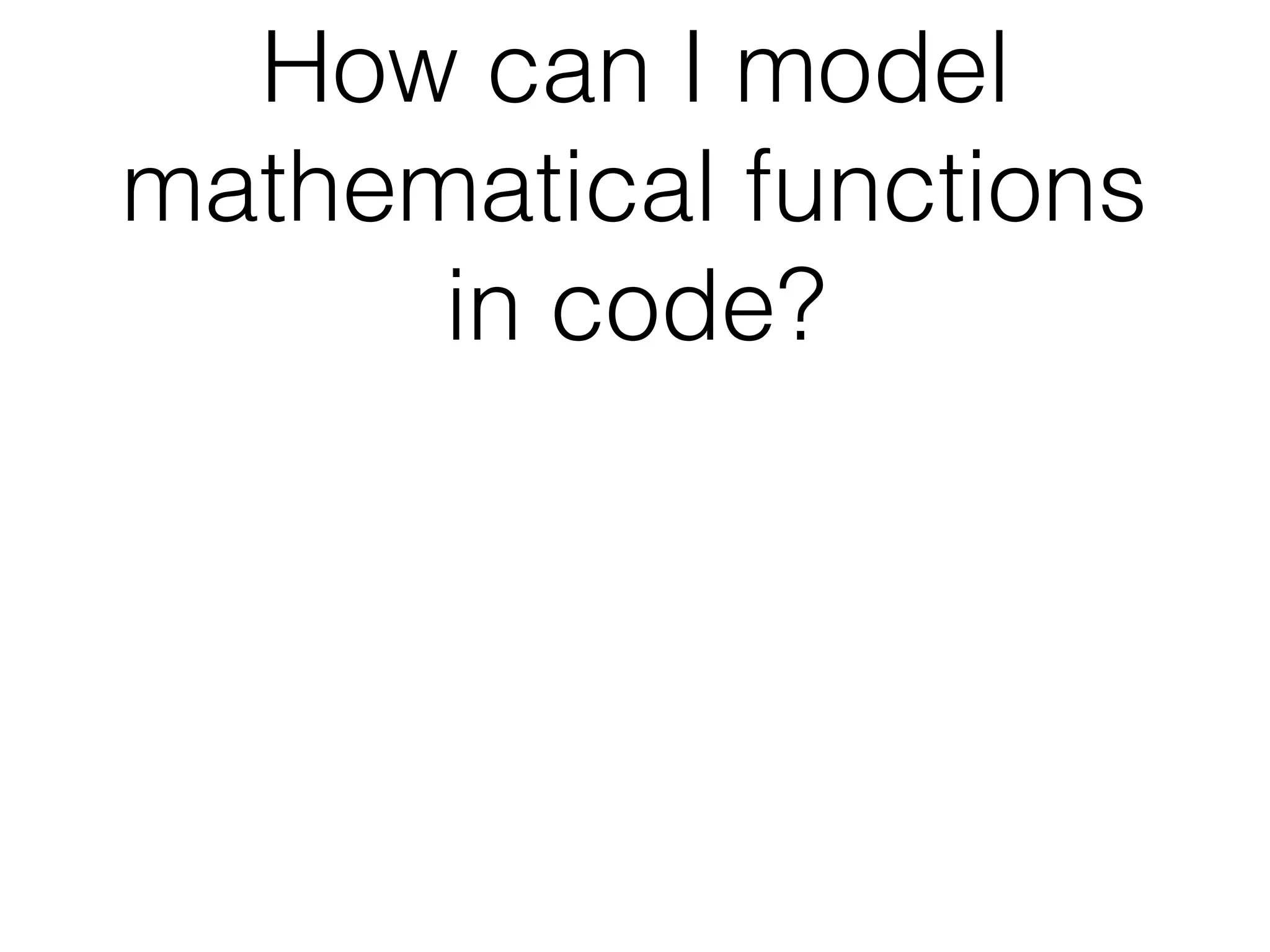
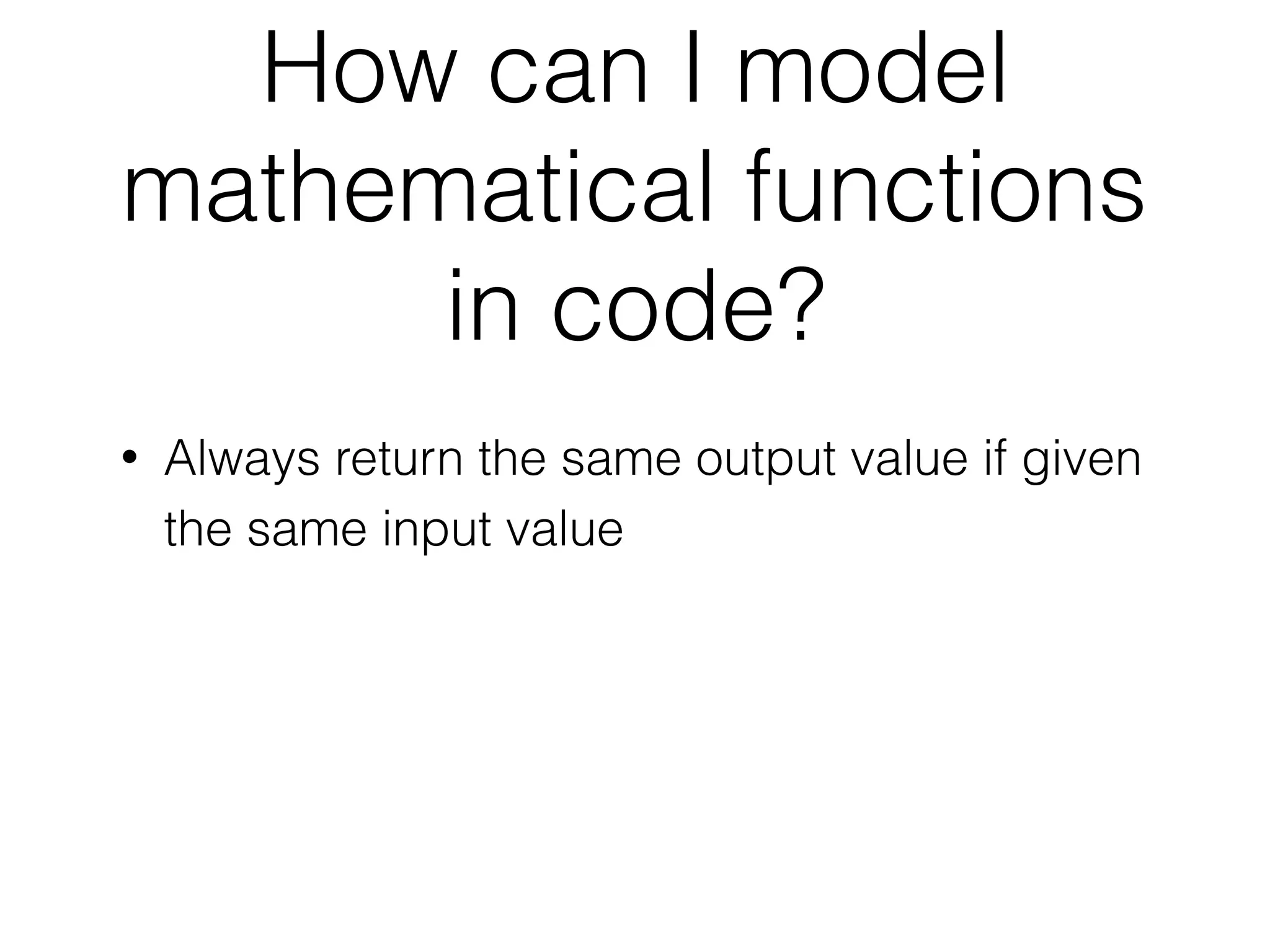
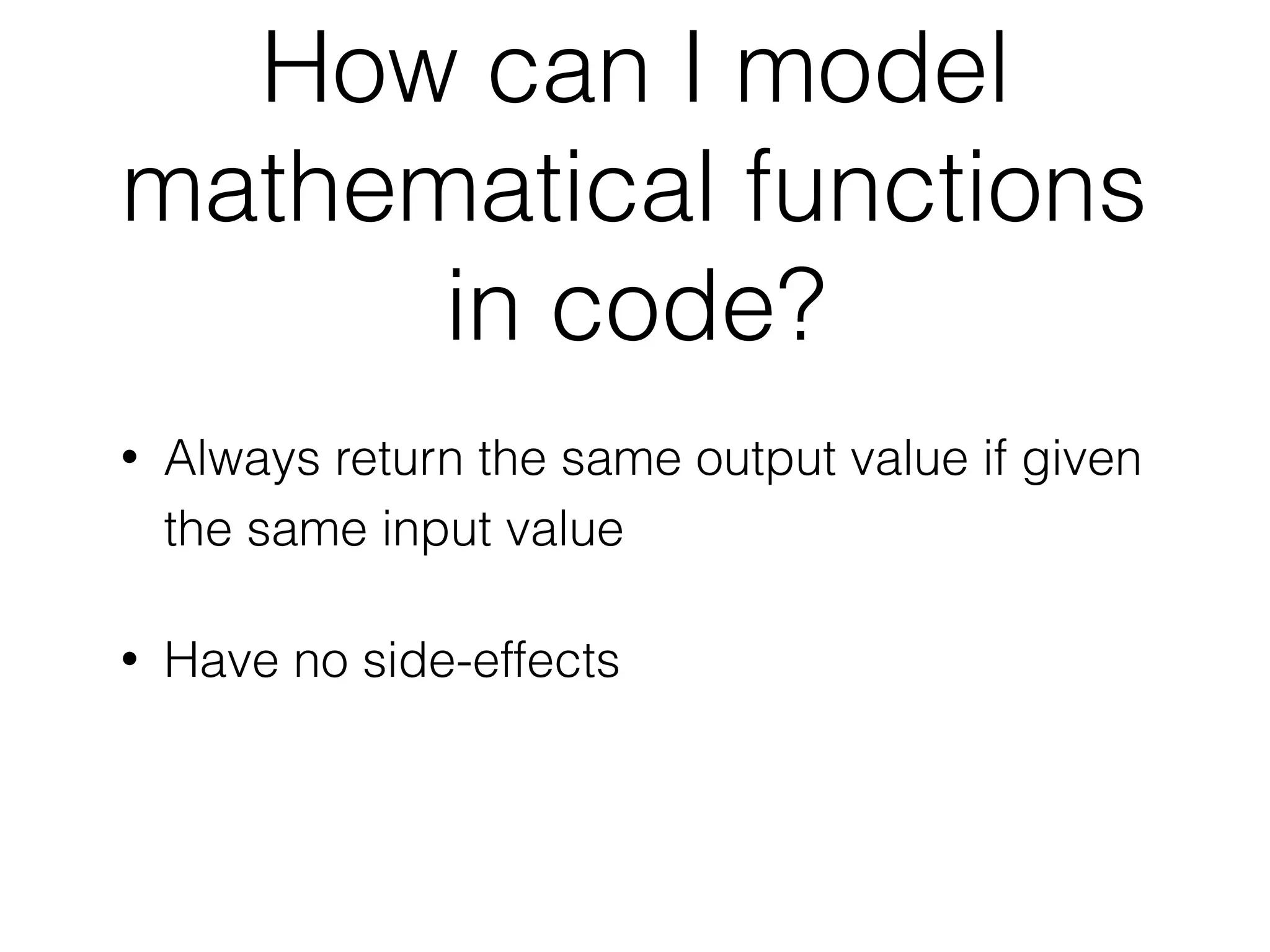
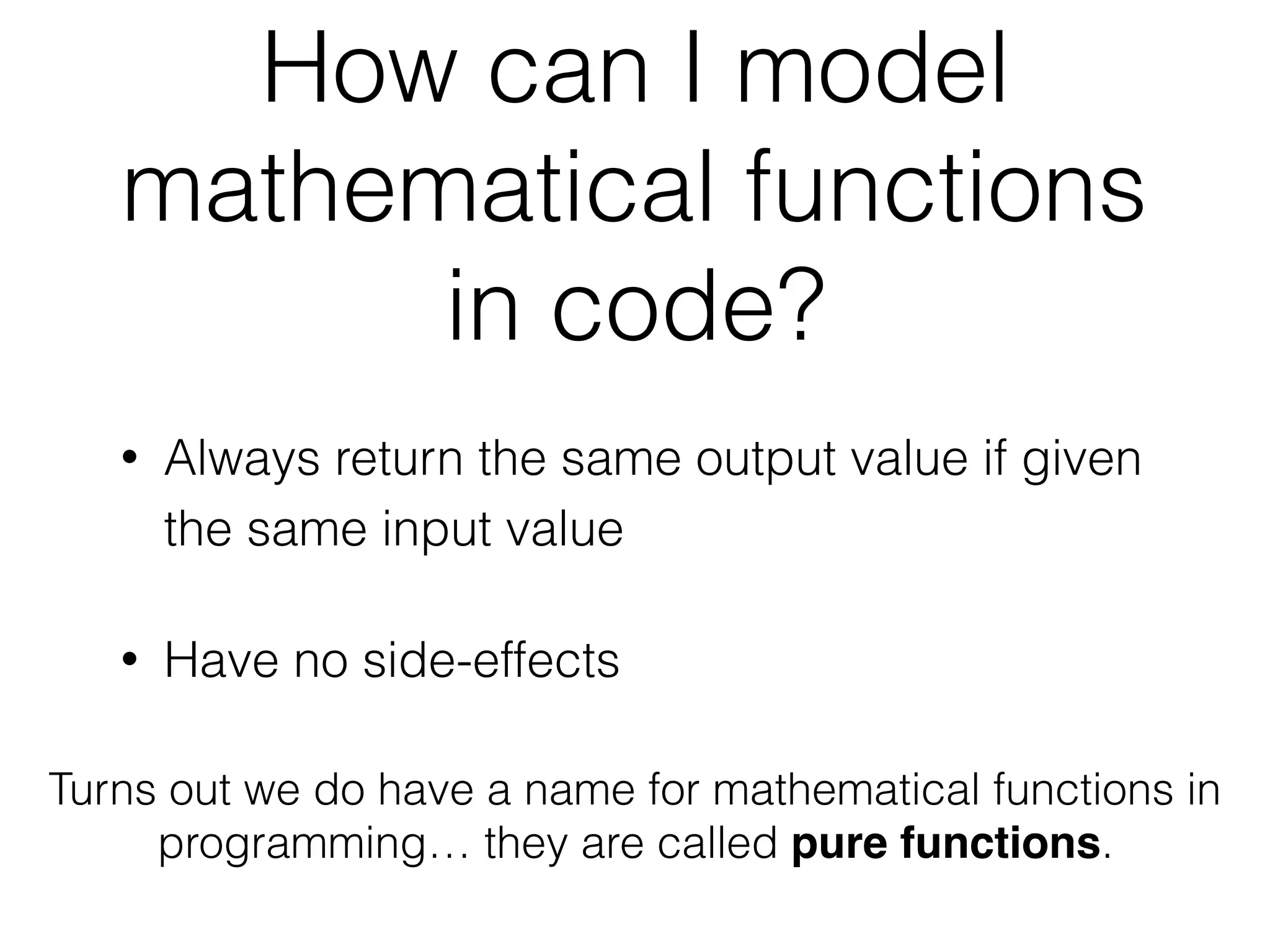
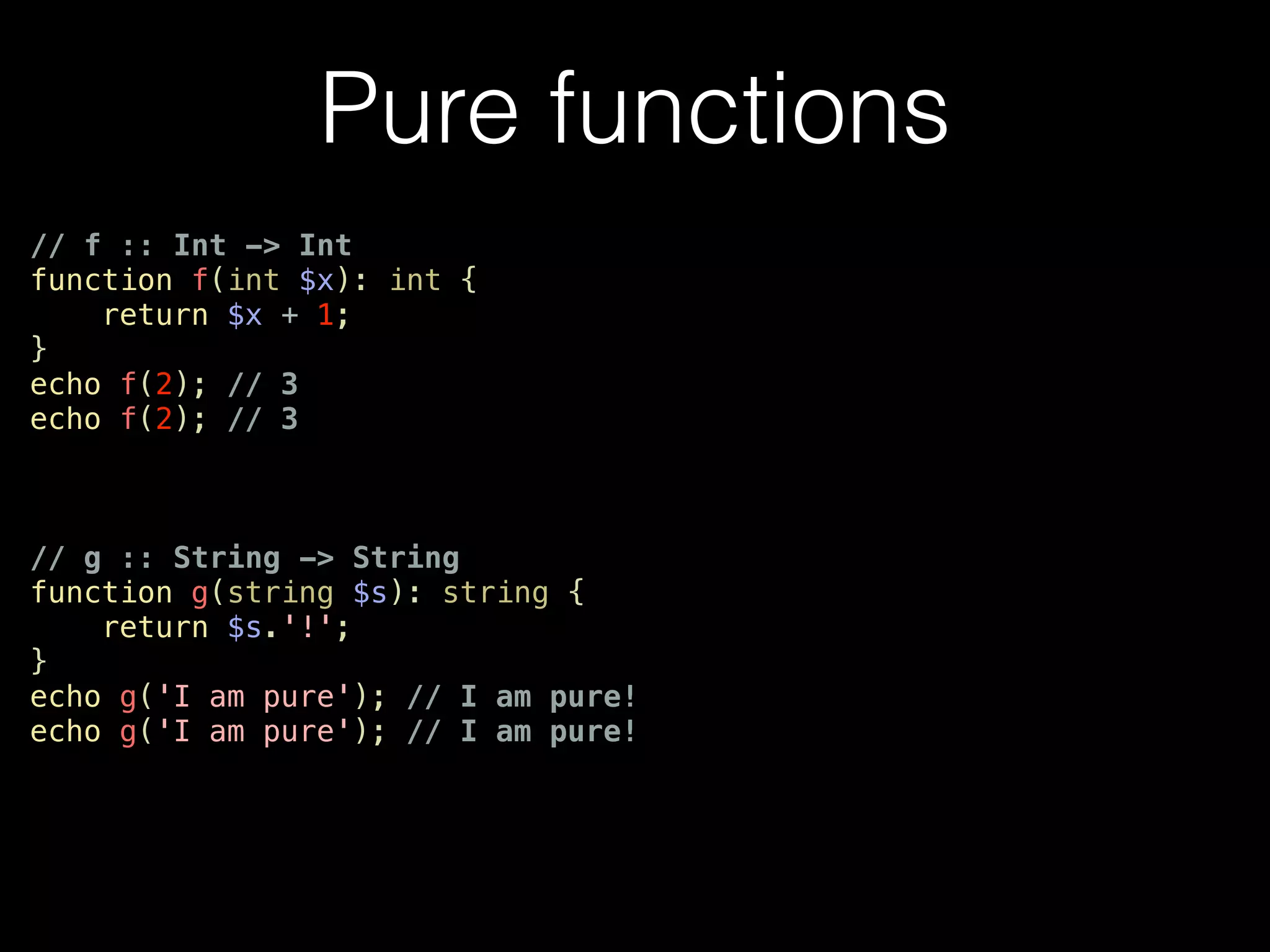
![// f :: Int -> Int
function f(int $x): int {
return 1;
}
echo f(4); // 1
echo f(4); // 1
// g :: String -> Bool
function g(string $s): bool {
return $s[0] === 'P';
}
echo g('Pure'); // True
echo g('Pure'); // True
echo g('Impure'); // False
echo g('Impure'); // False
Pure functions](https://image.slidesharecdn.com/keynote151216-161221233845/75/Functional-Programming-in-PHP-14-2048.jpg)
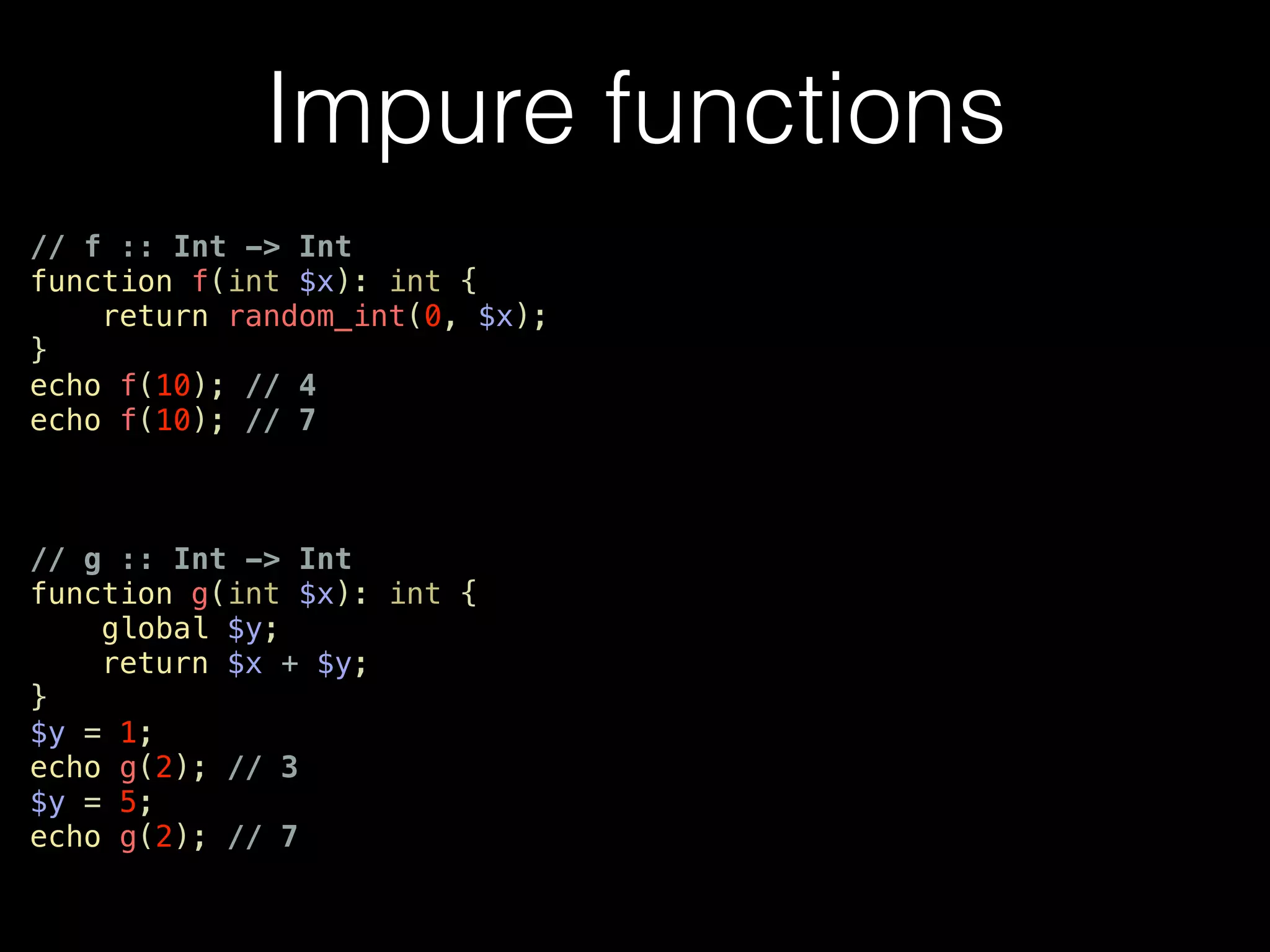
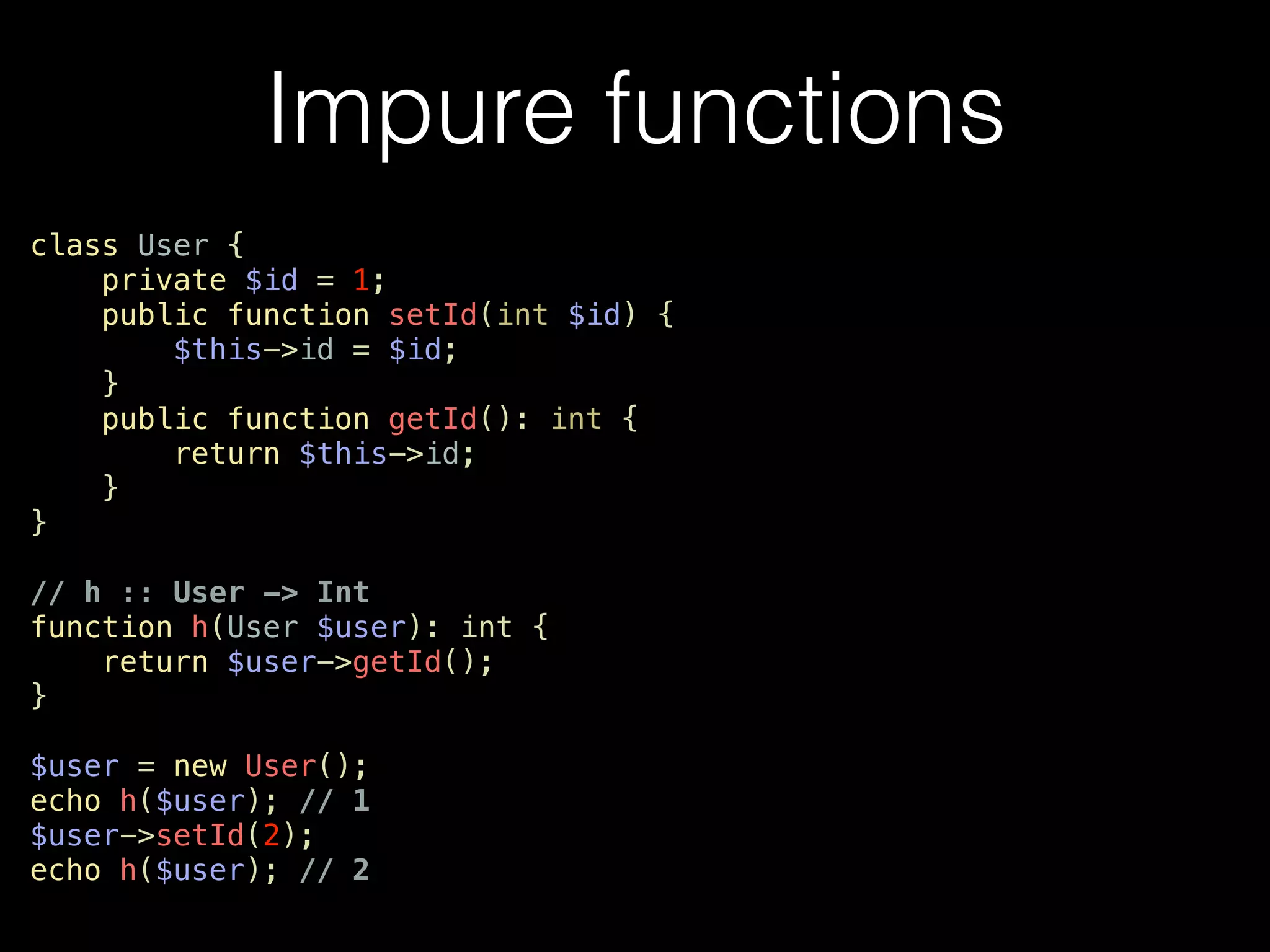
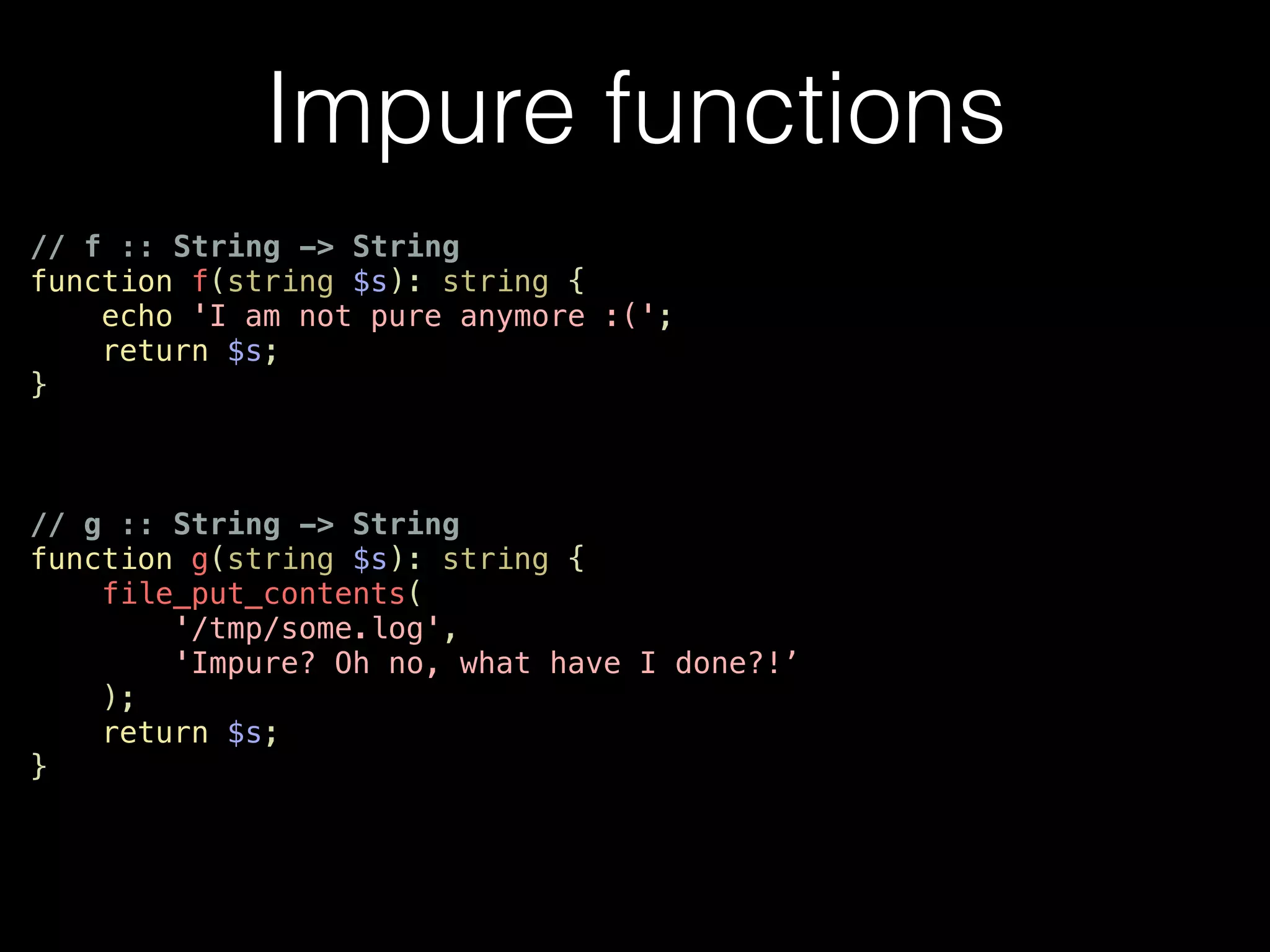

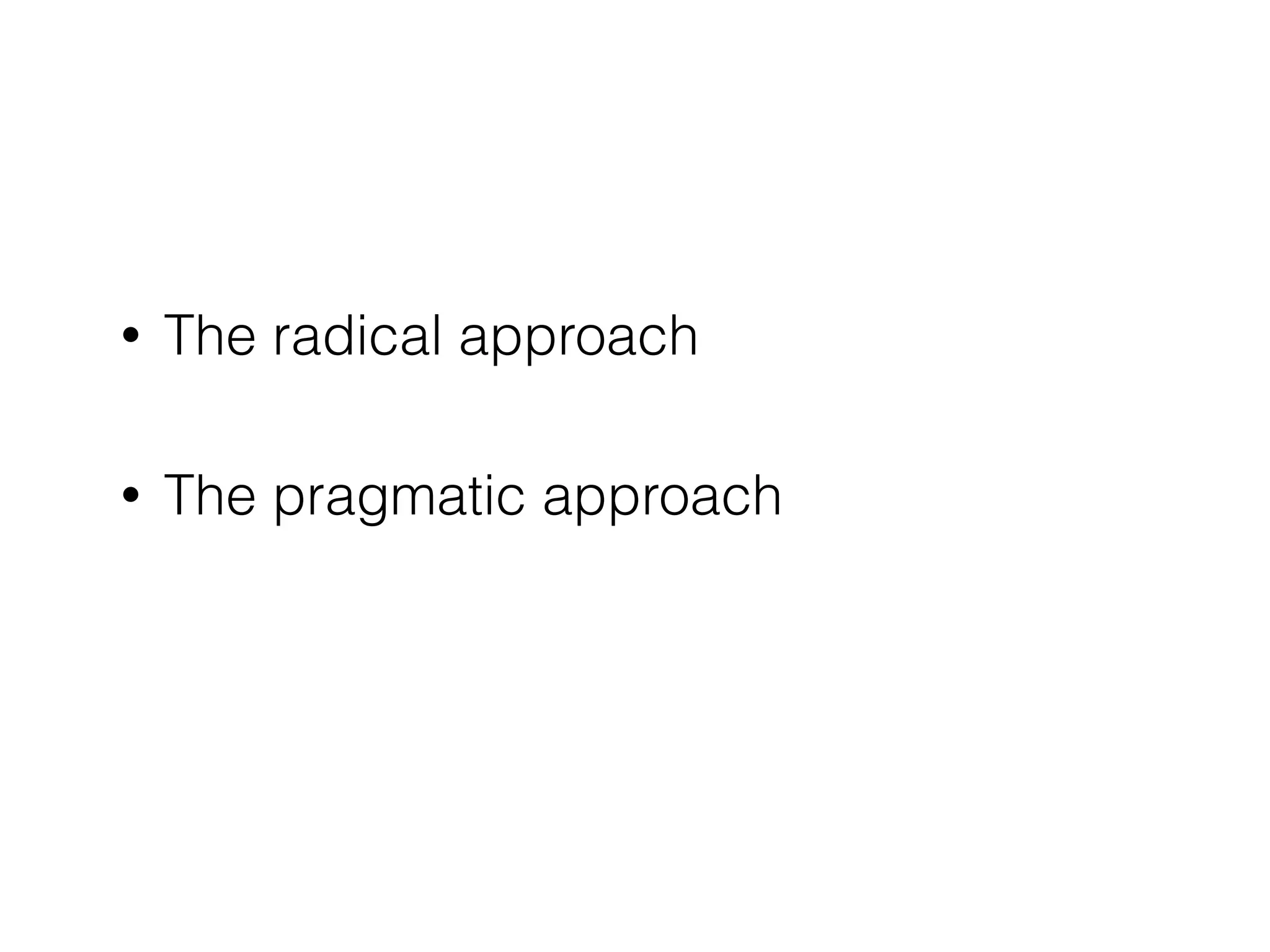

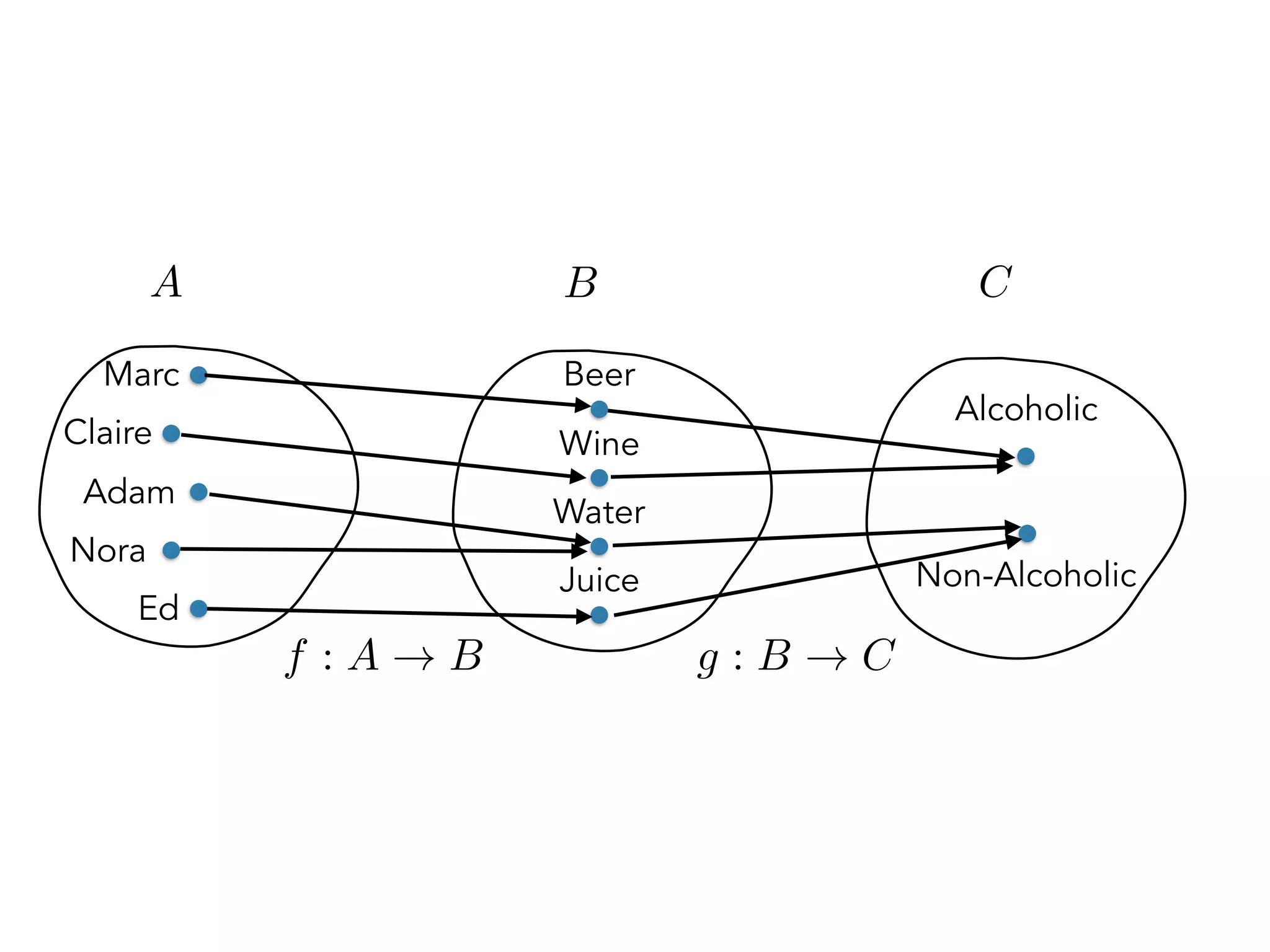
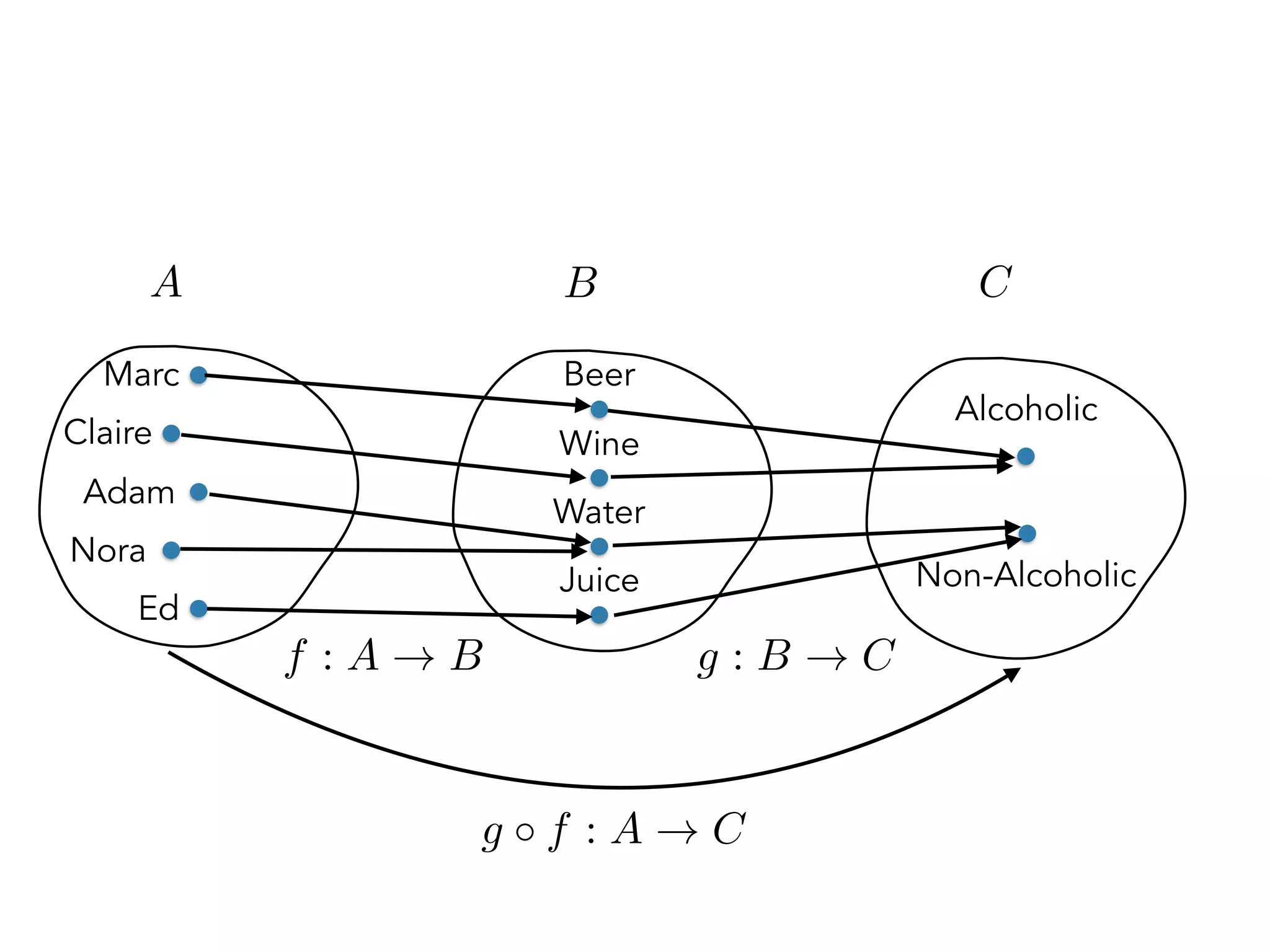
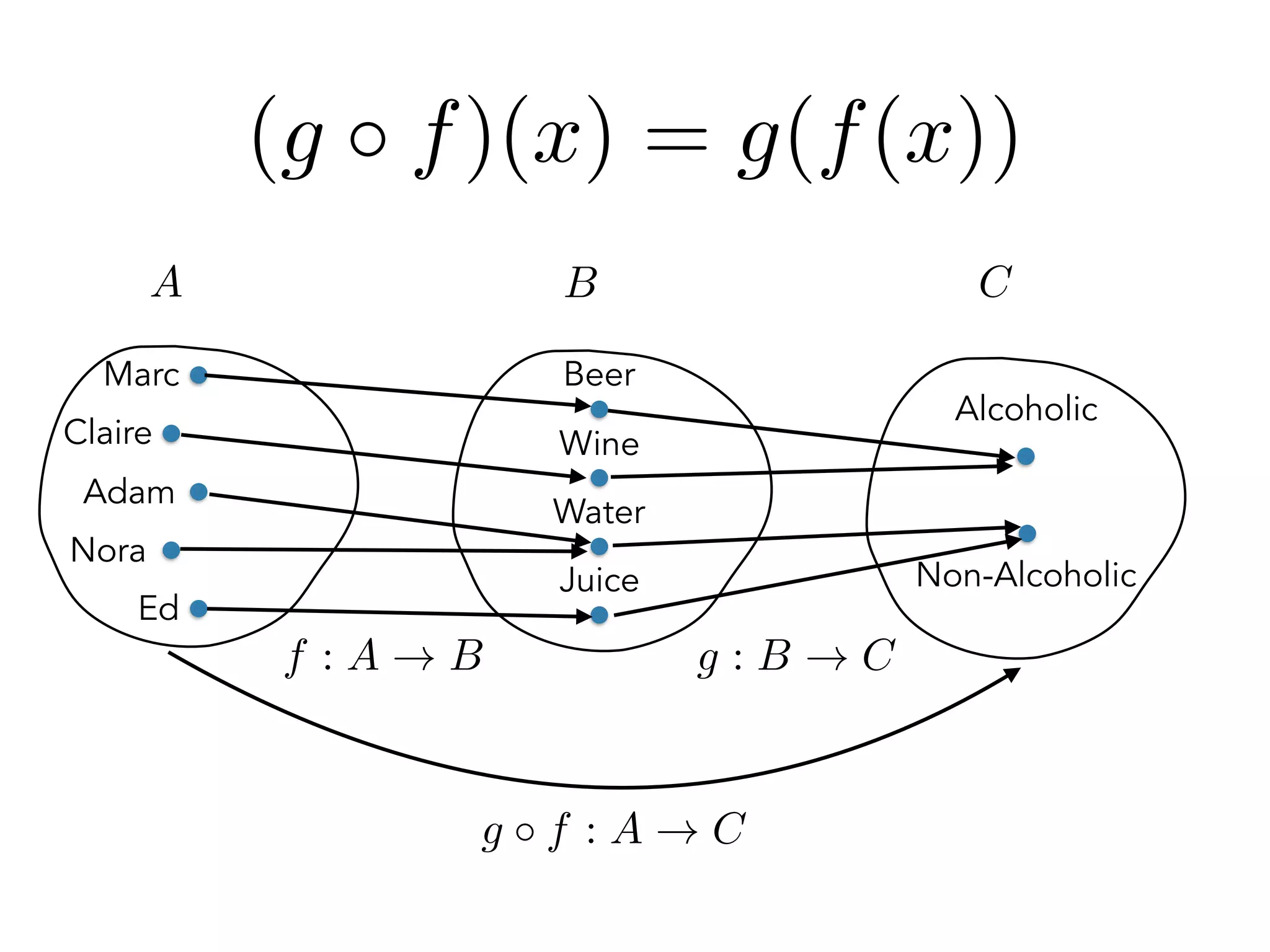
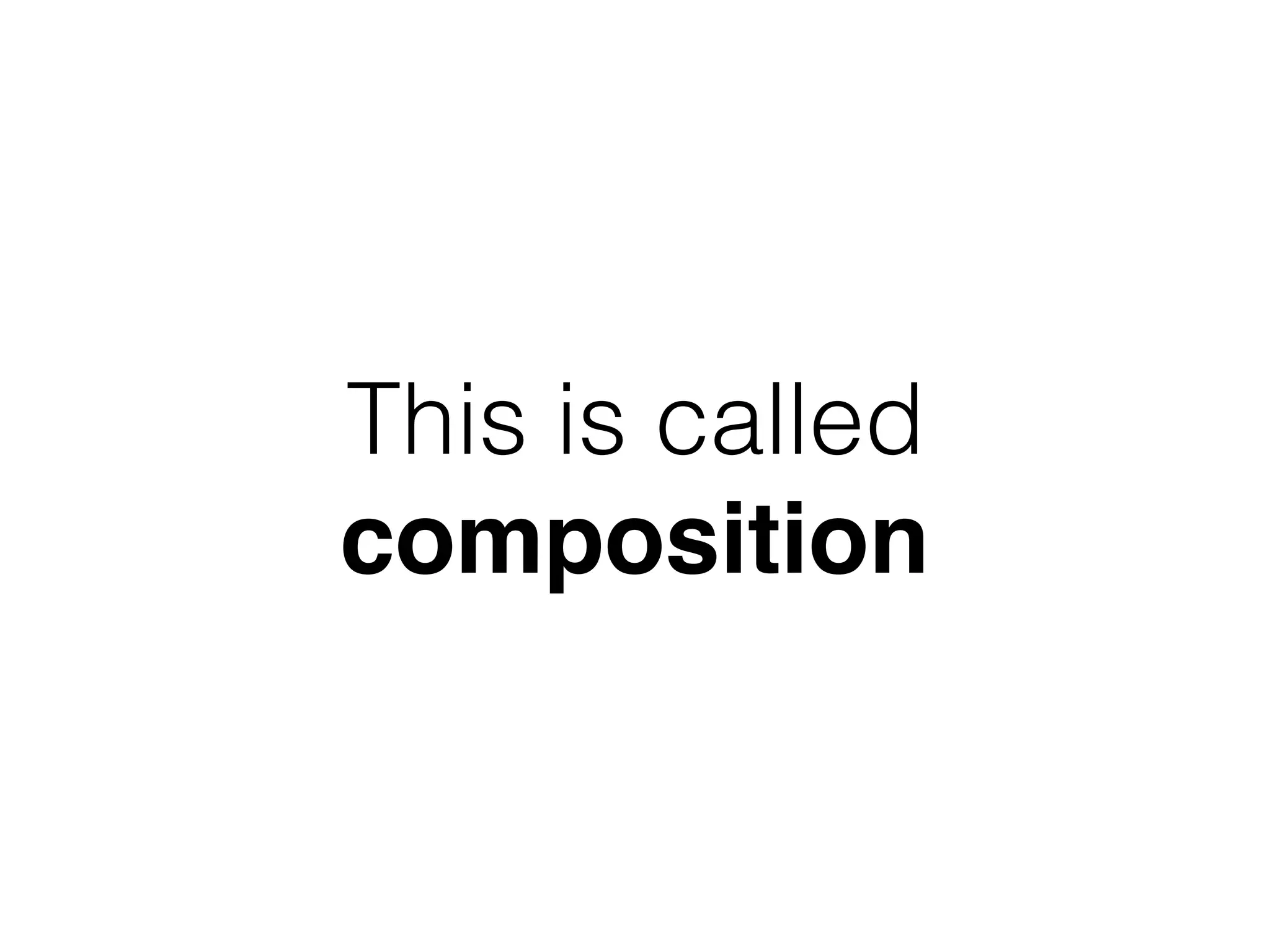

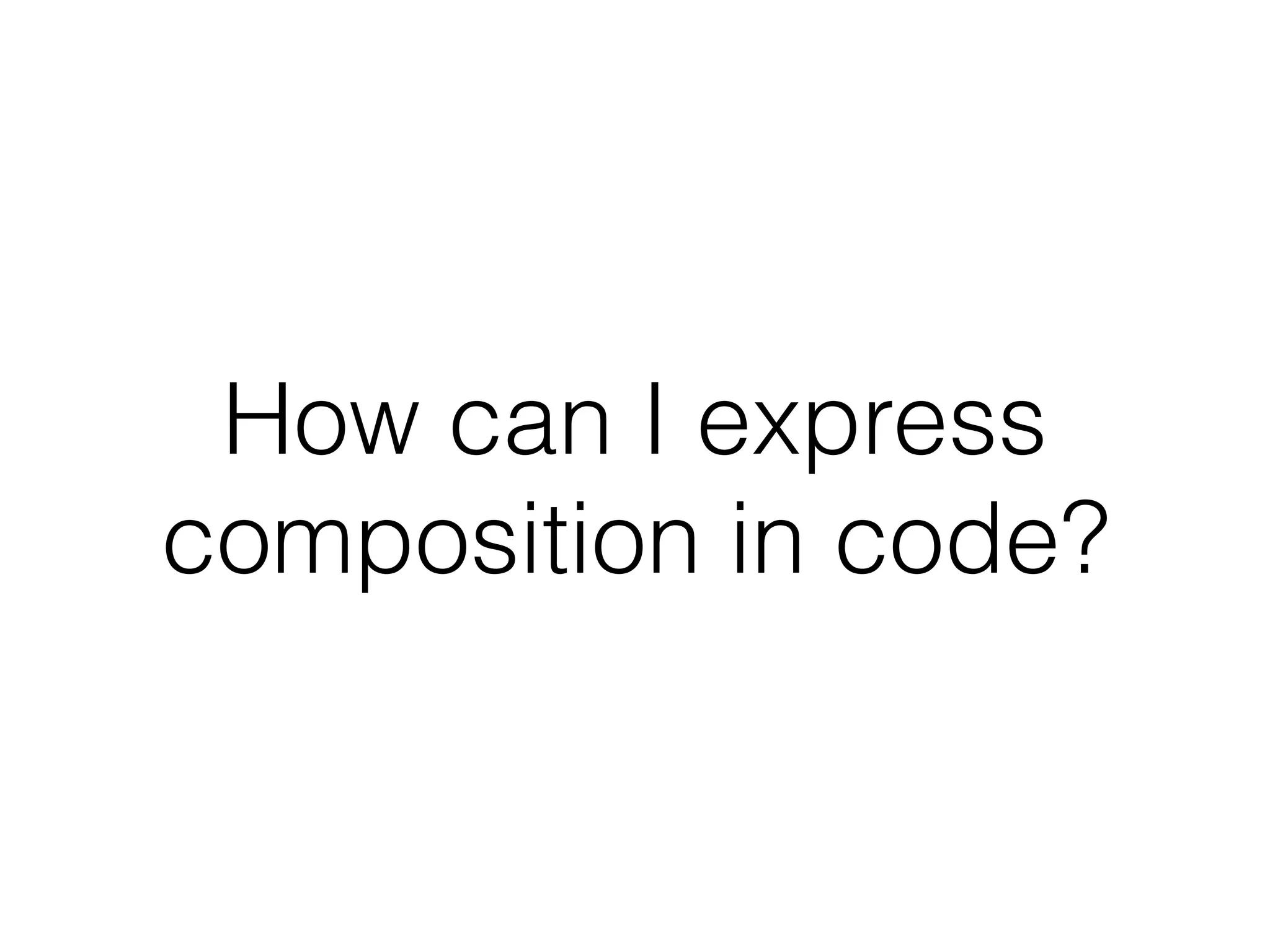



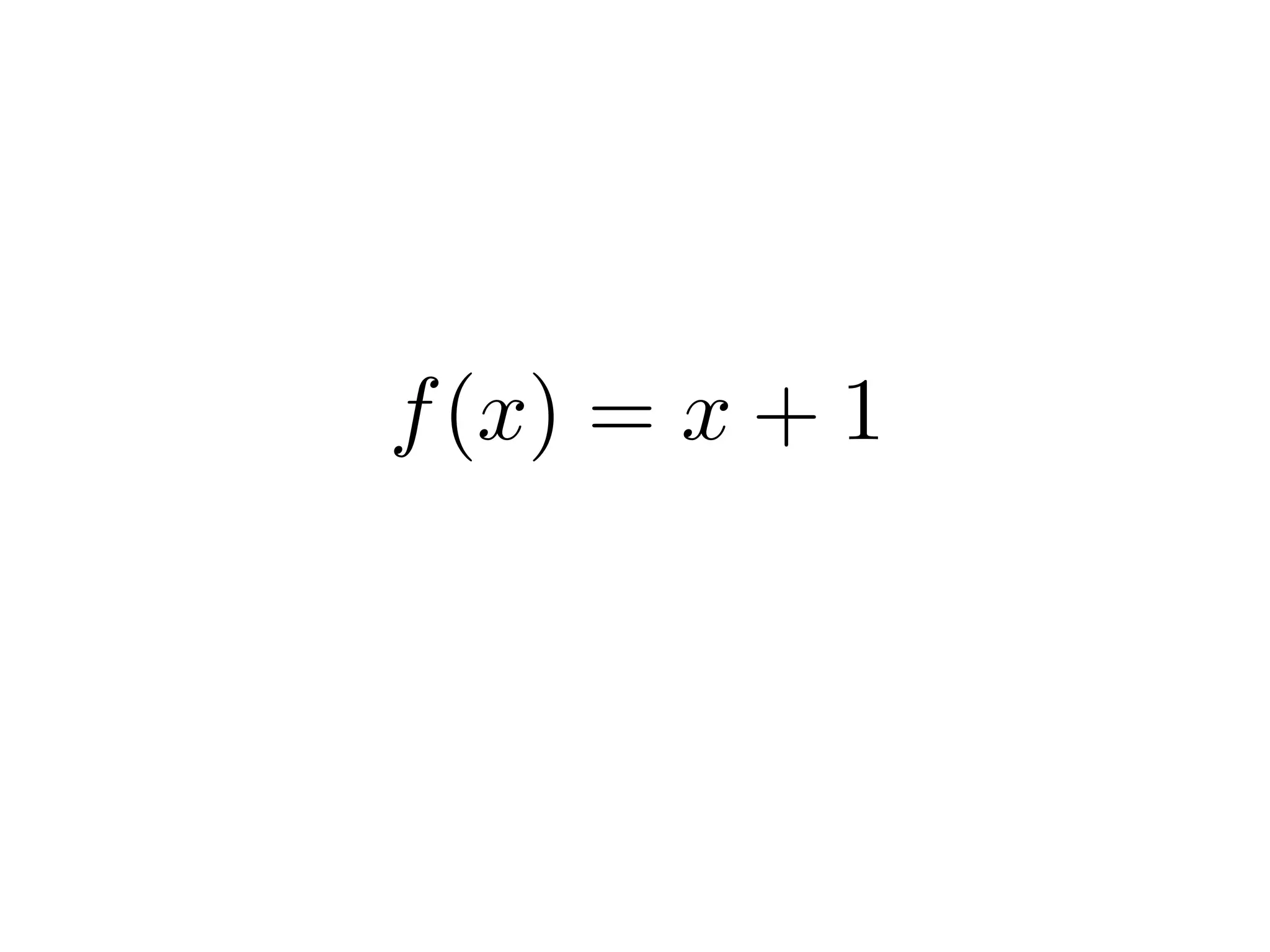
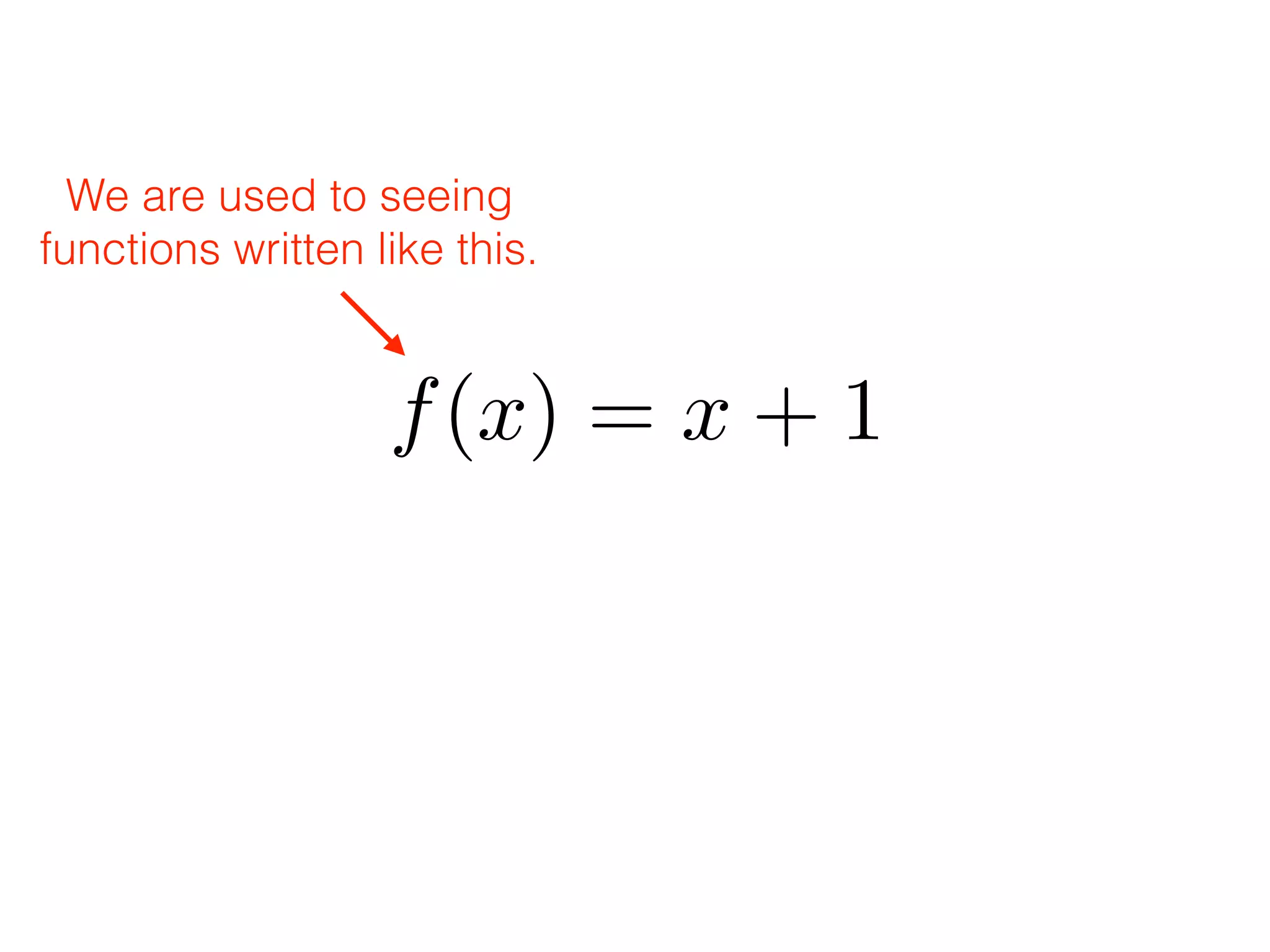
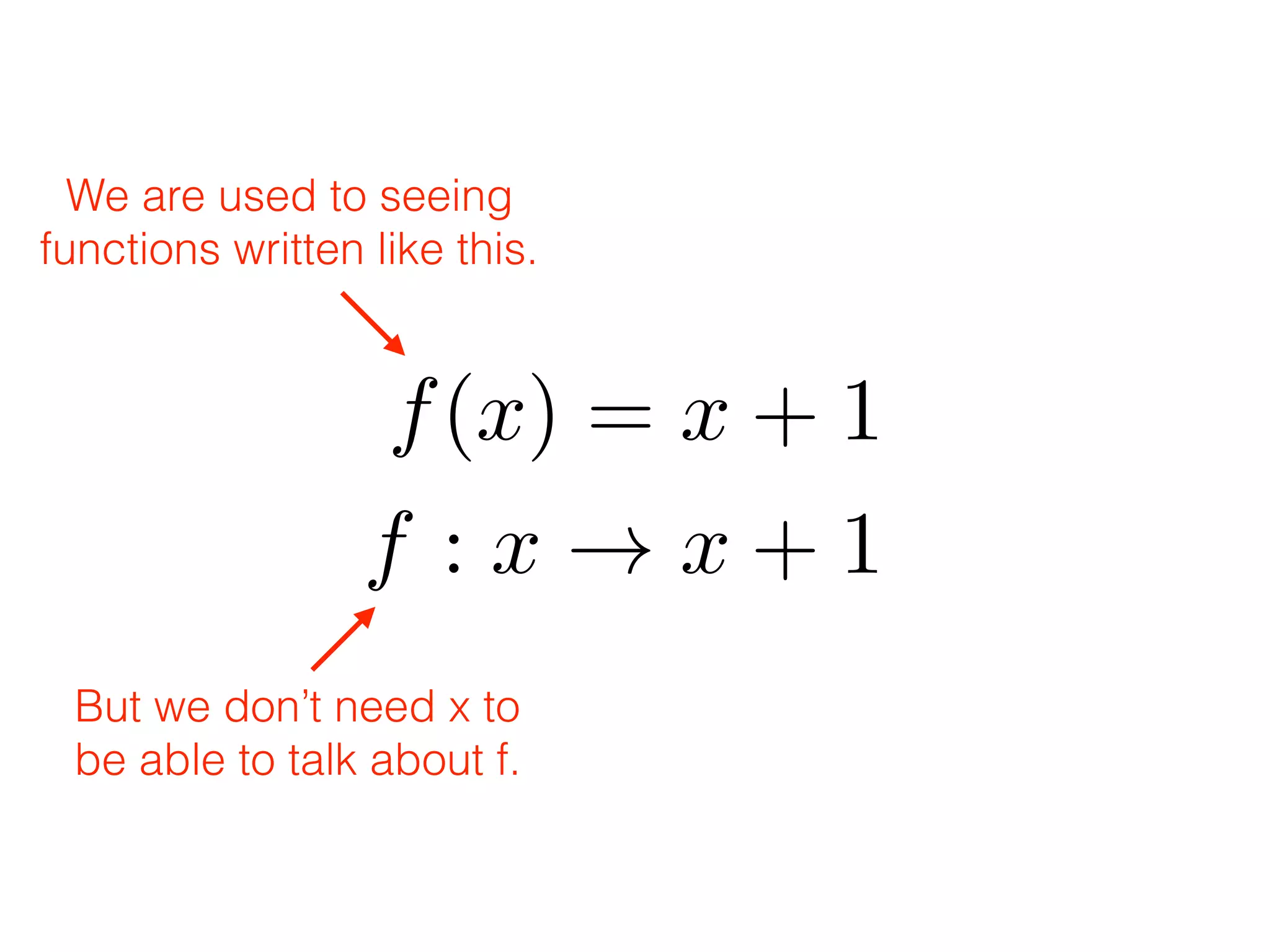
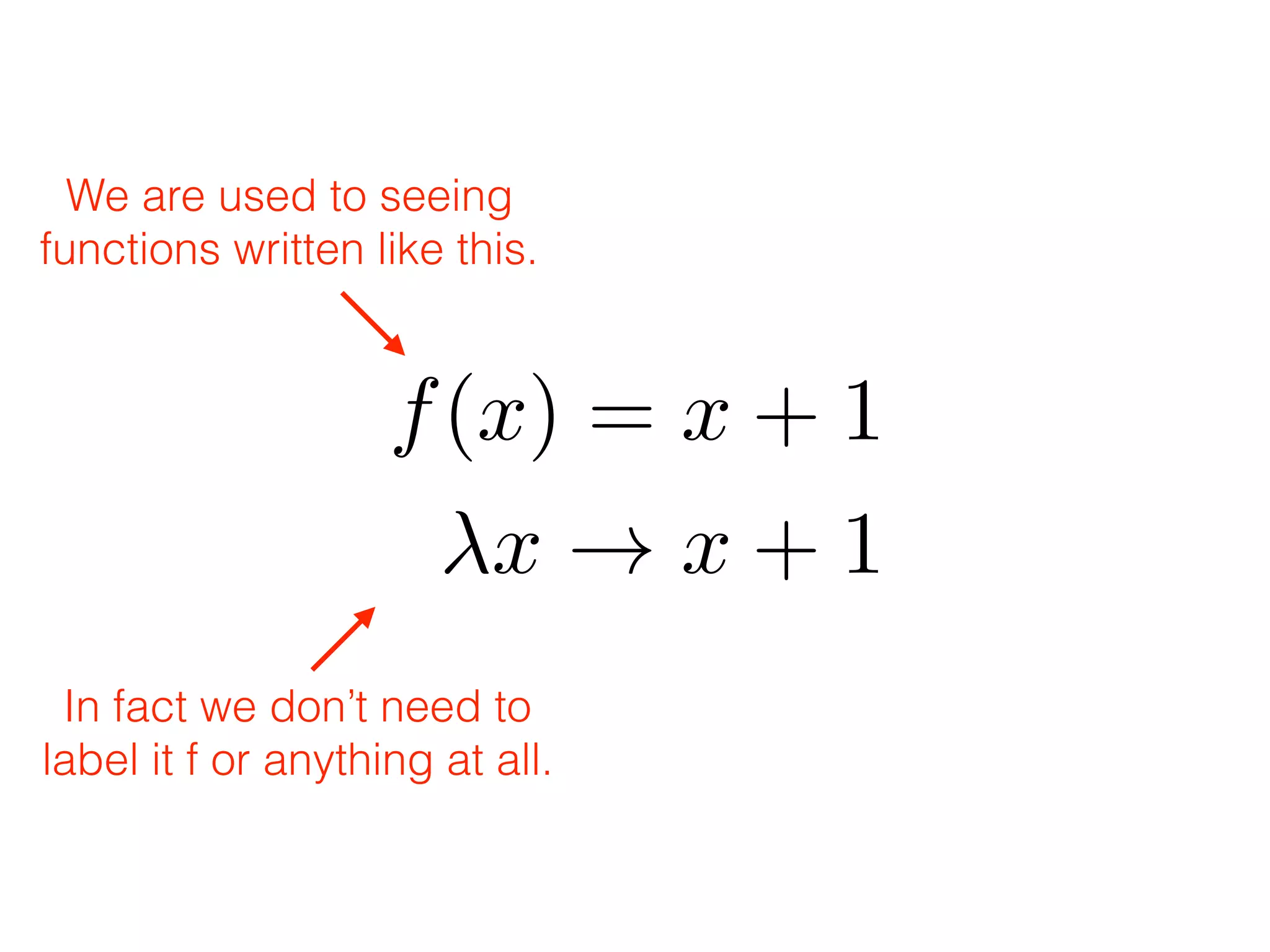
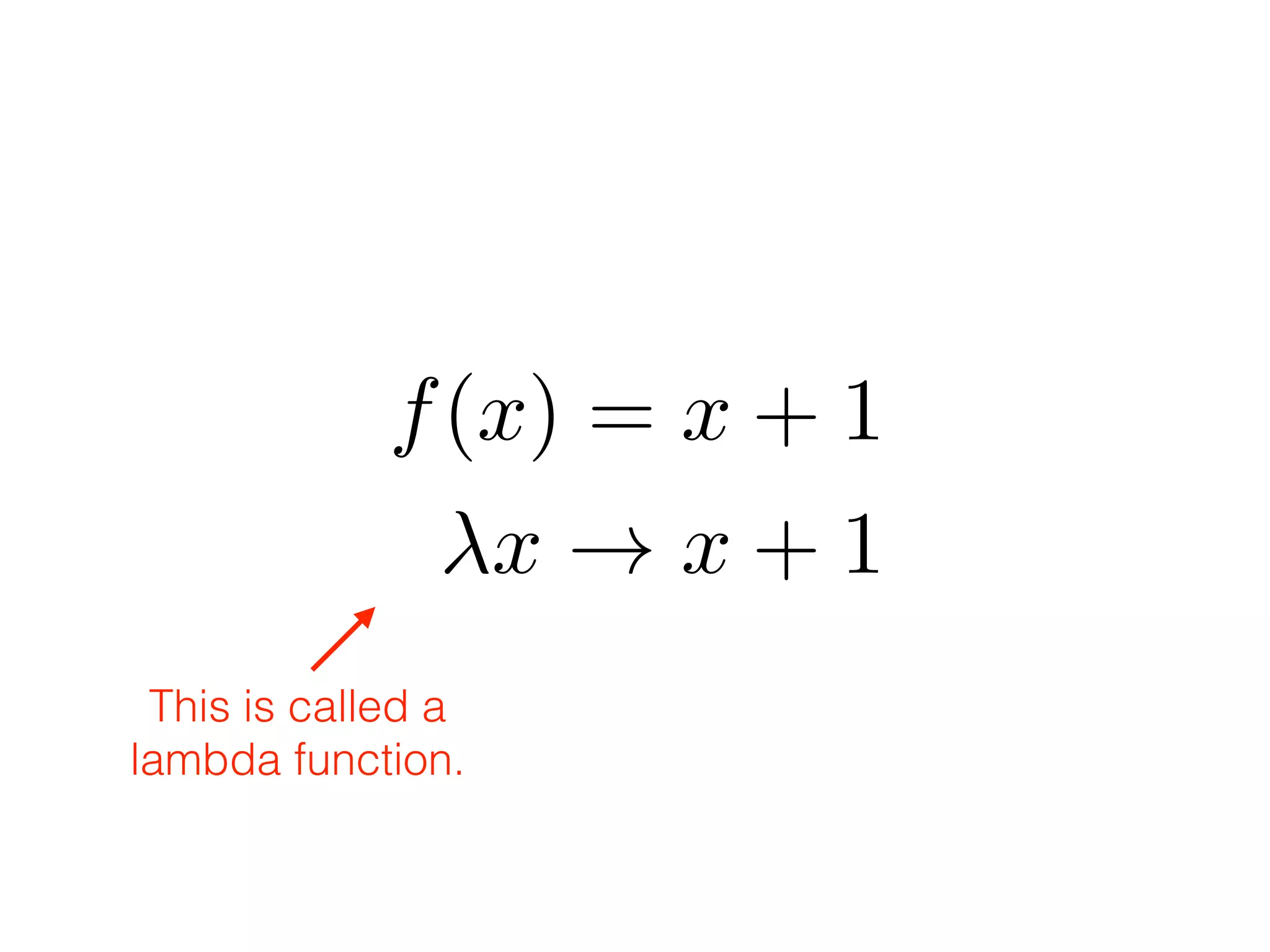
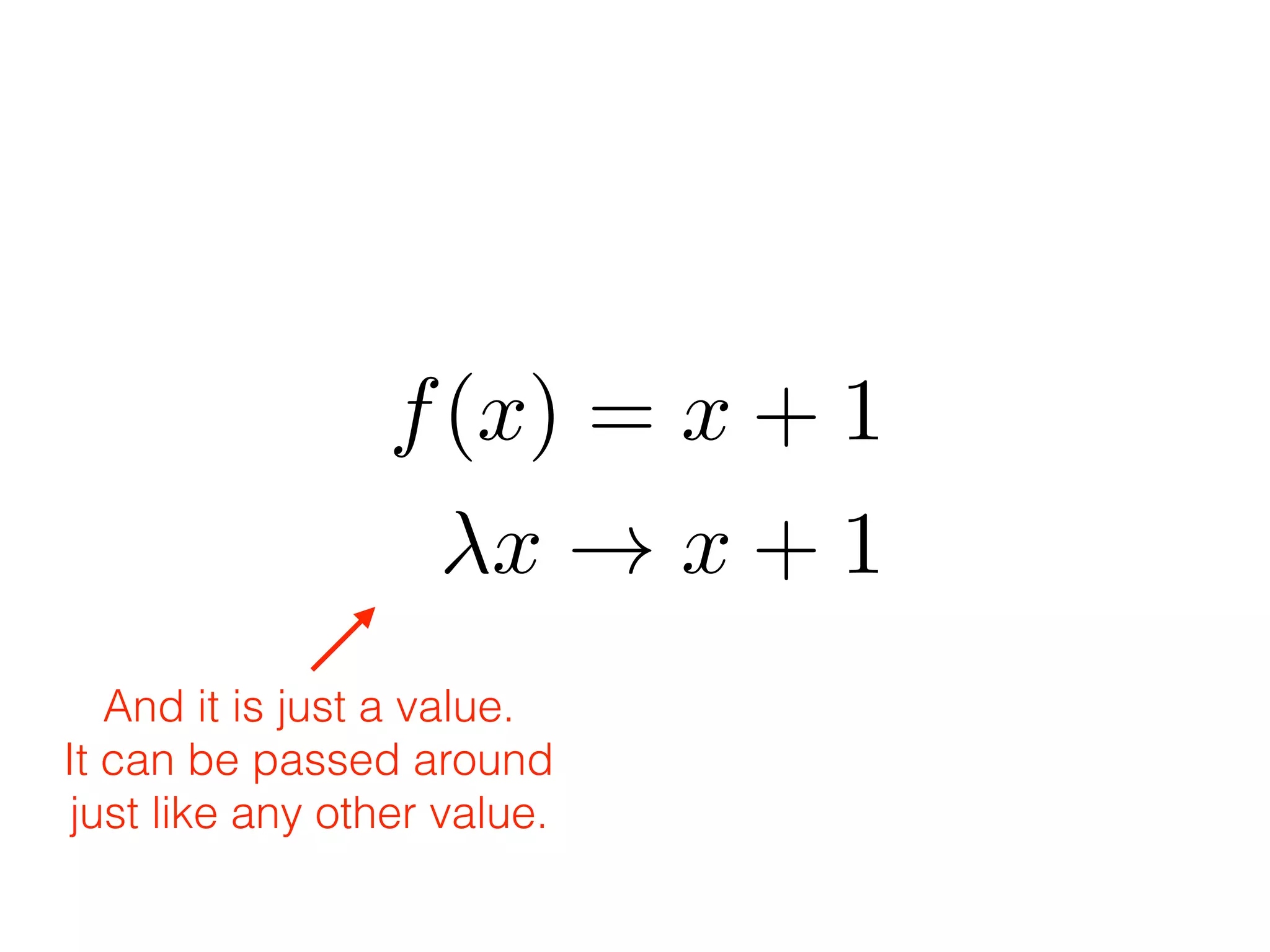
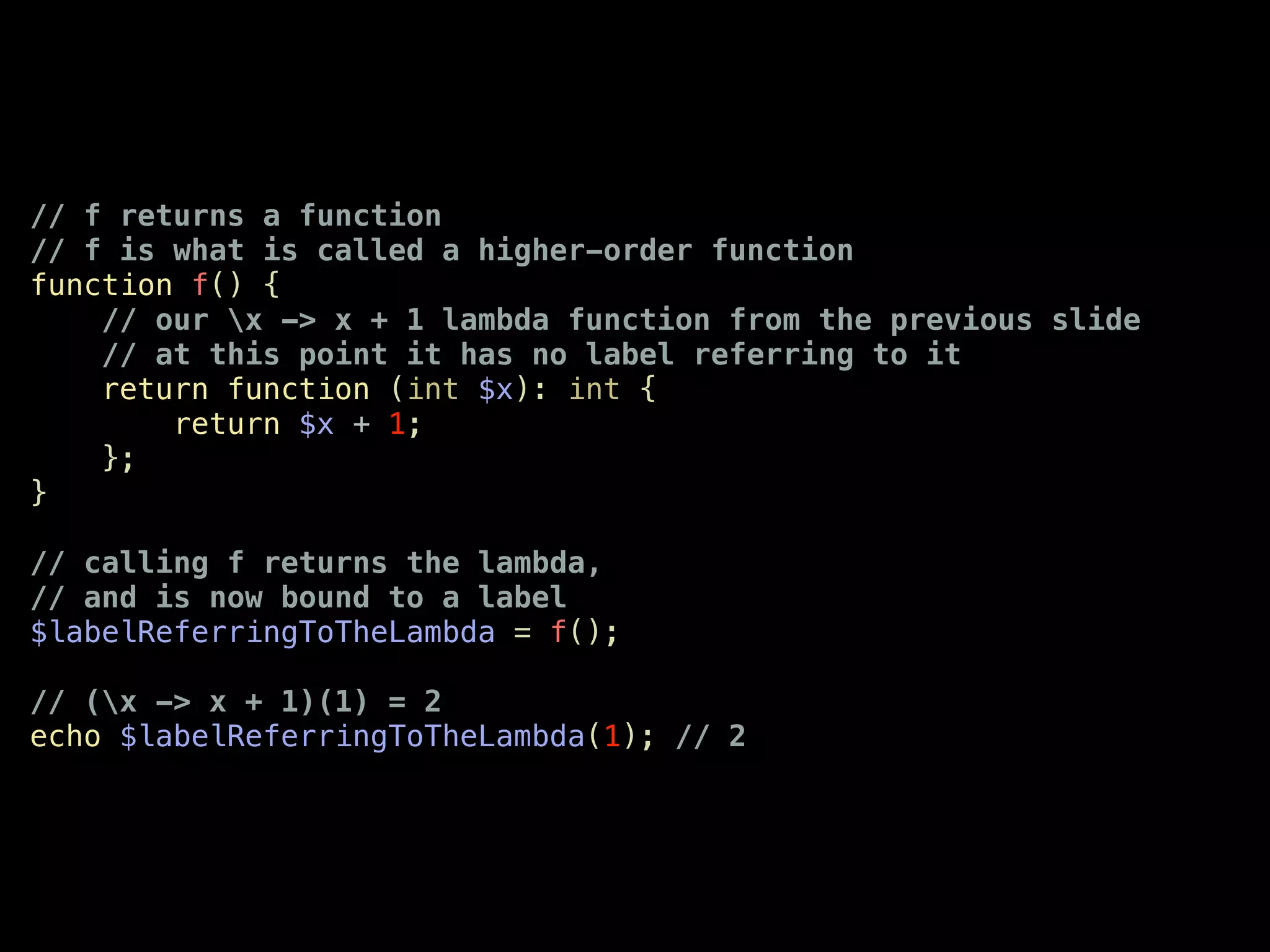
![// array_map() is also a higher-order function
// because it operates on functions.
// In this case the input function is again
// our friend: x -> x + 1
$a = array_map(
function (int $x): int { return $x + 1; },
[1, 2, 3, 4, 5]
);
print_r($a); // [2, 3, 4, 5, 6]](https://image.slidesharecdn.com/keynote151216-161221233845/75/Functional-Programming-in-PHP-37-2048.jpg)

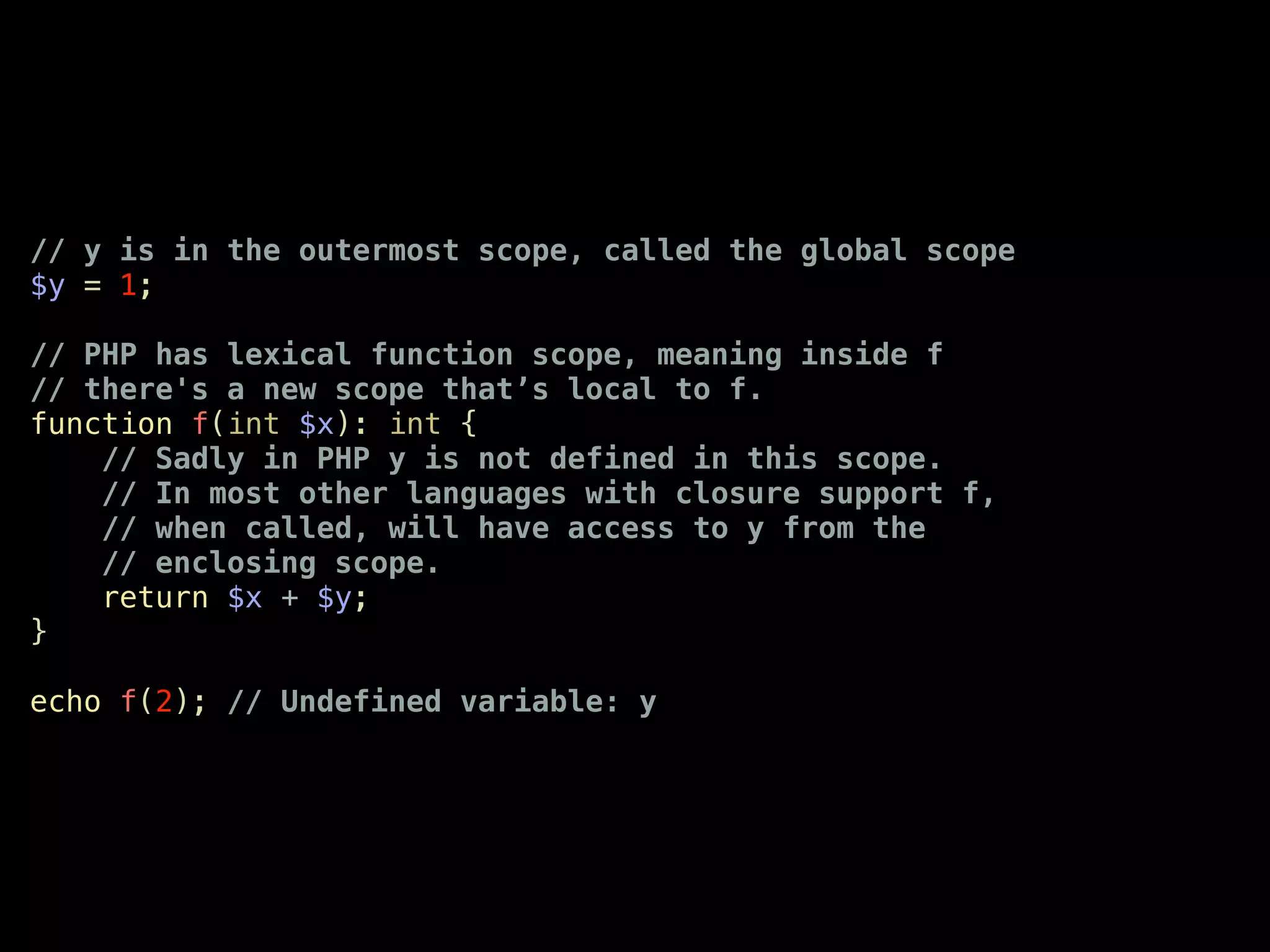
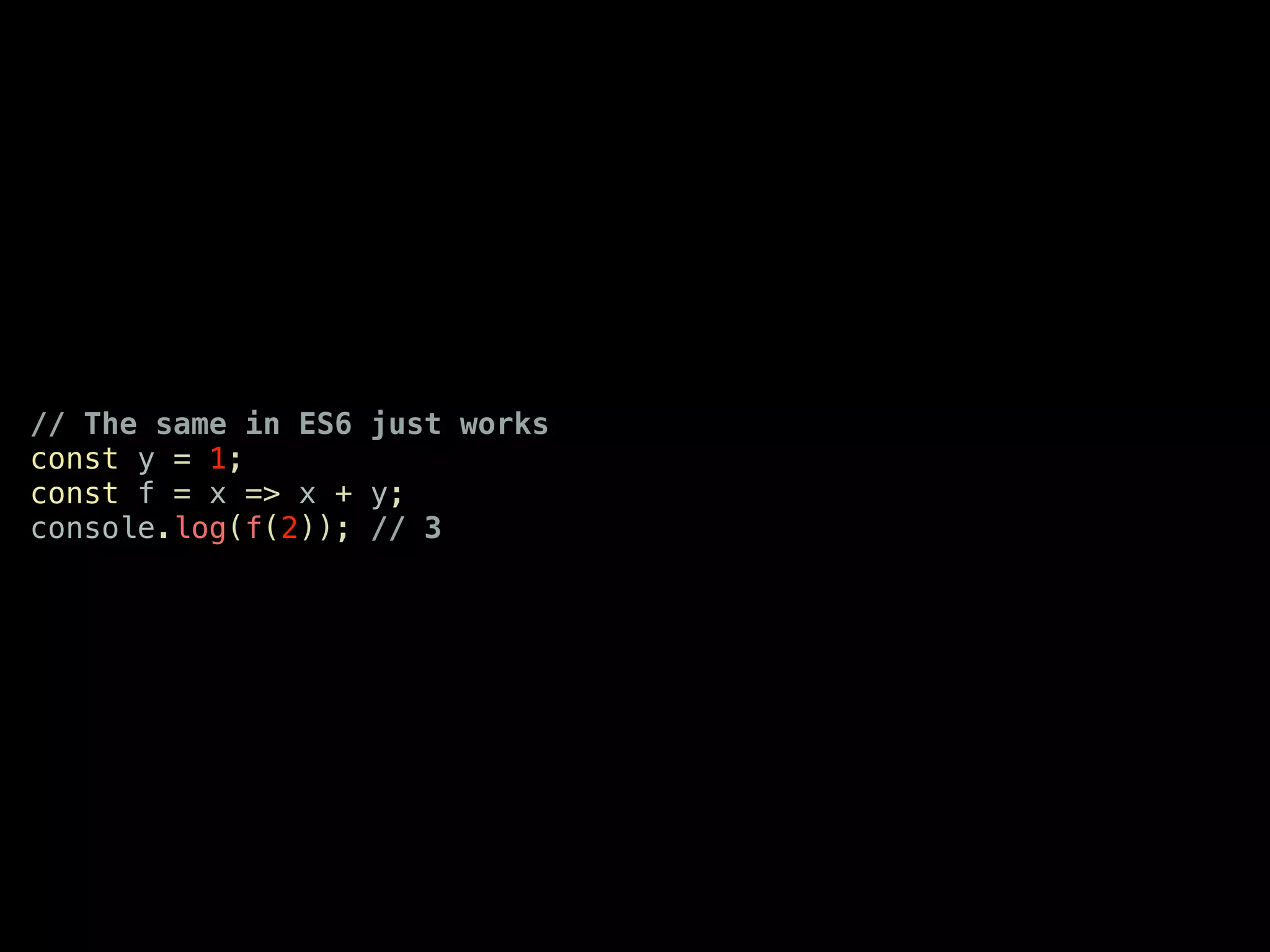
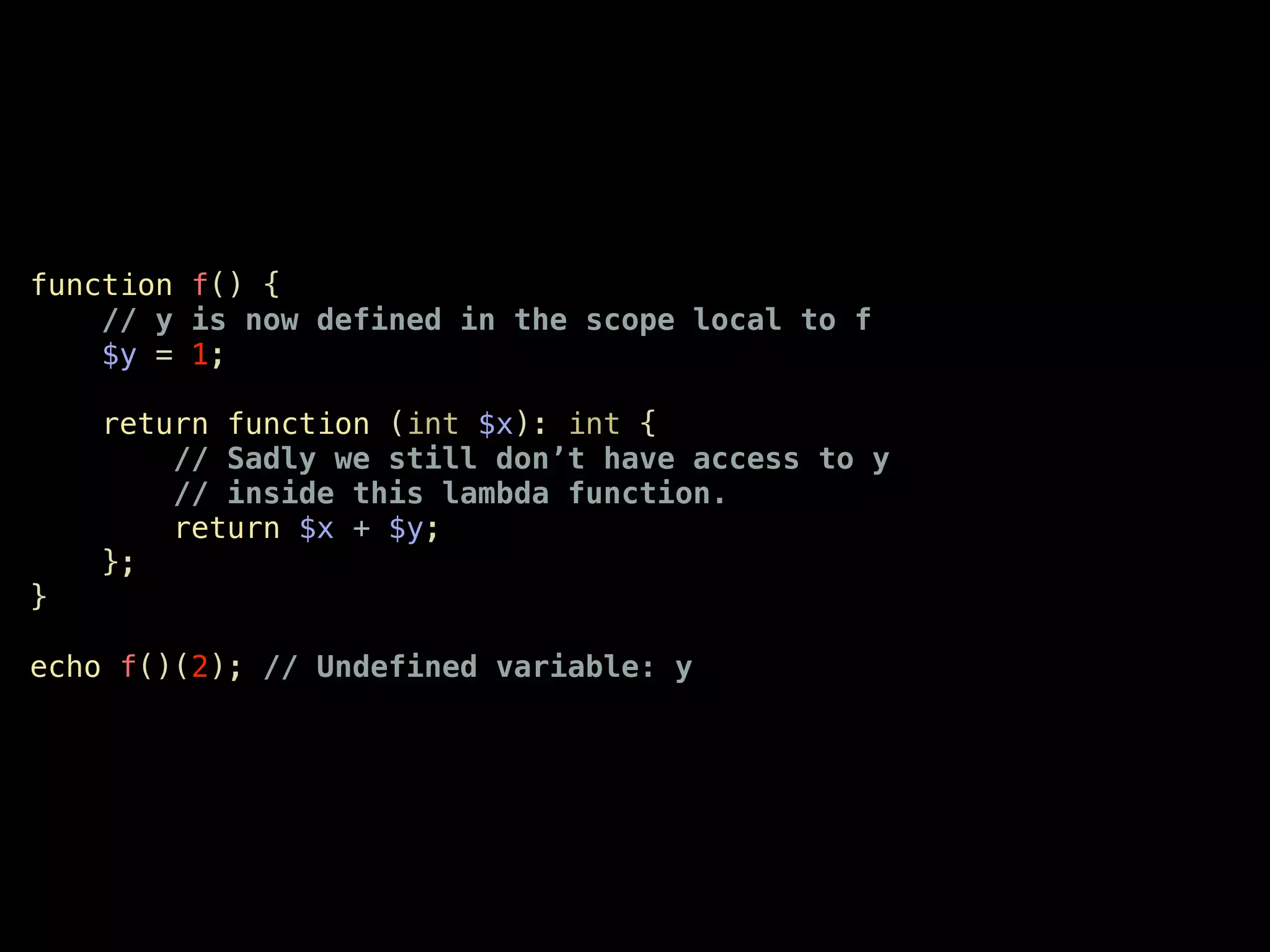
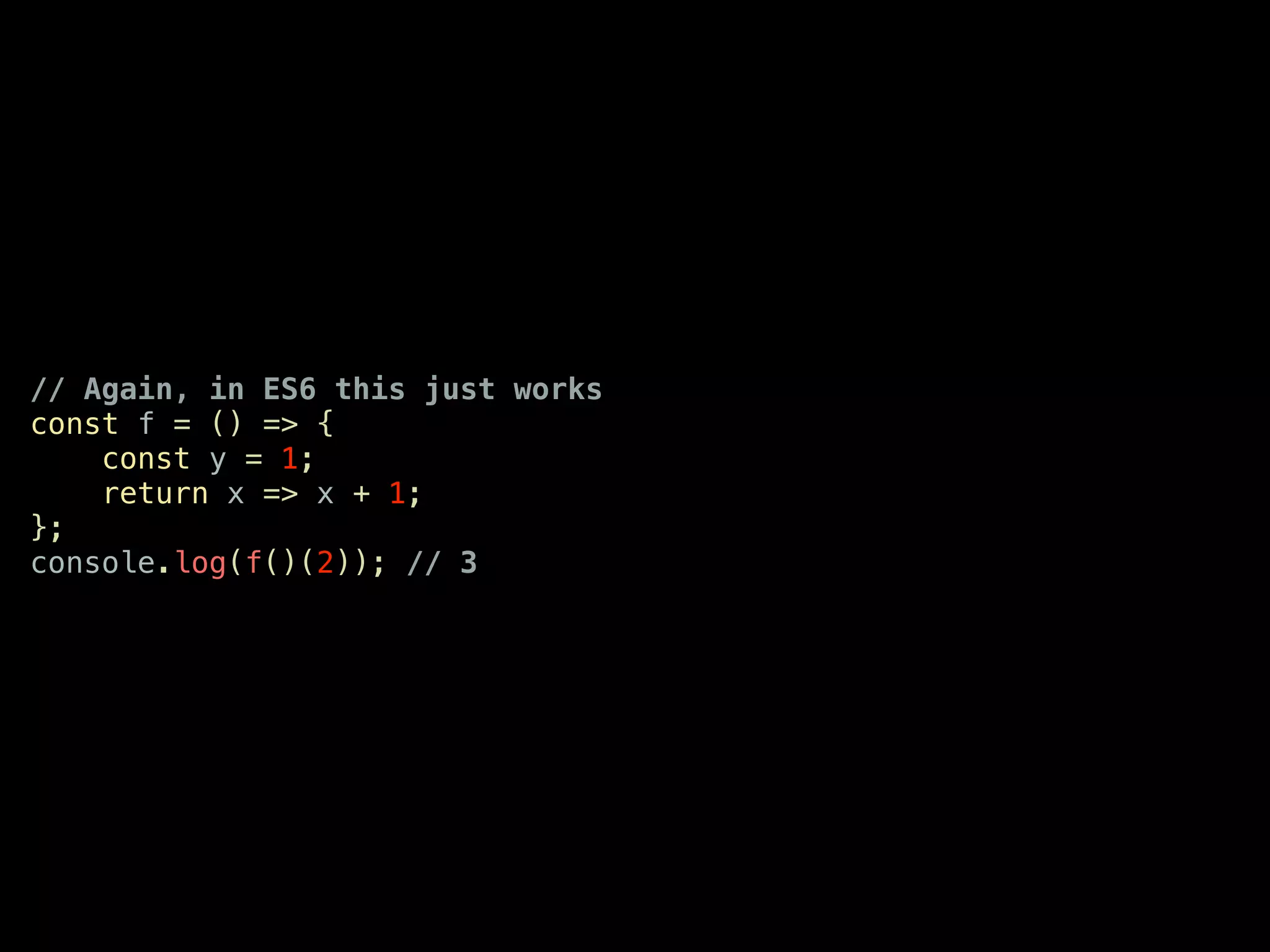
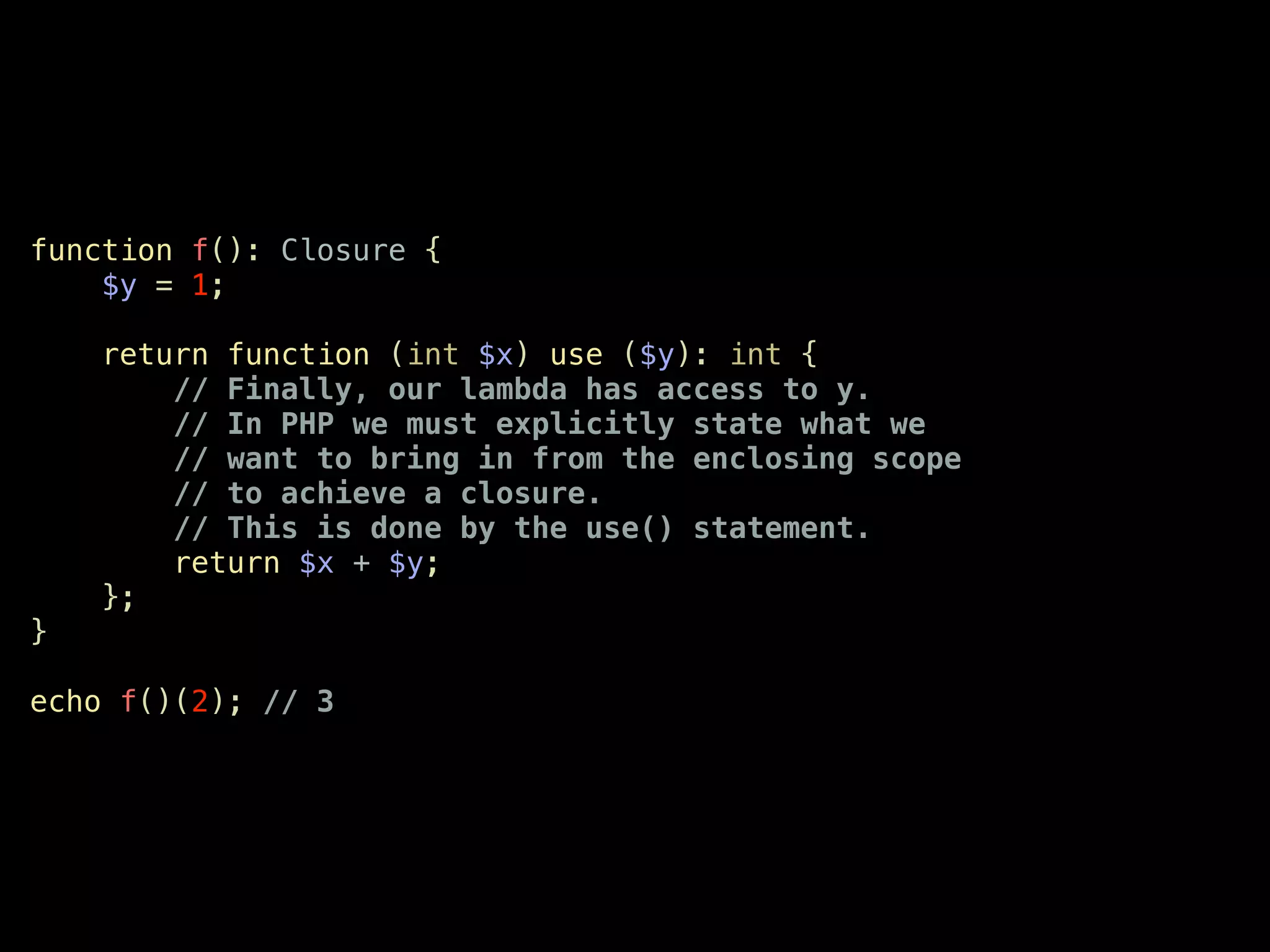
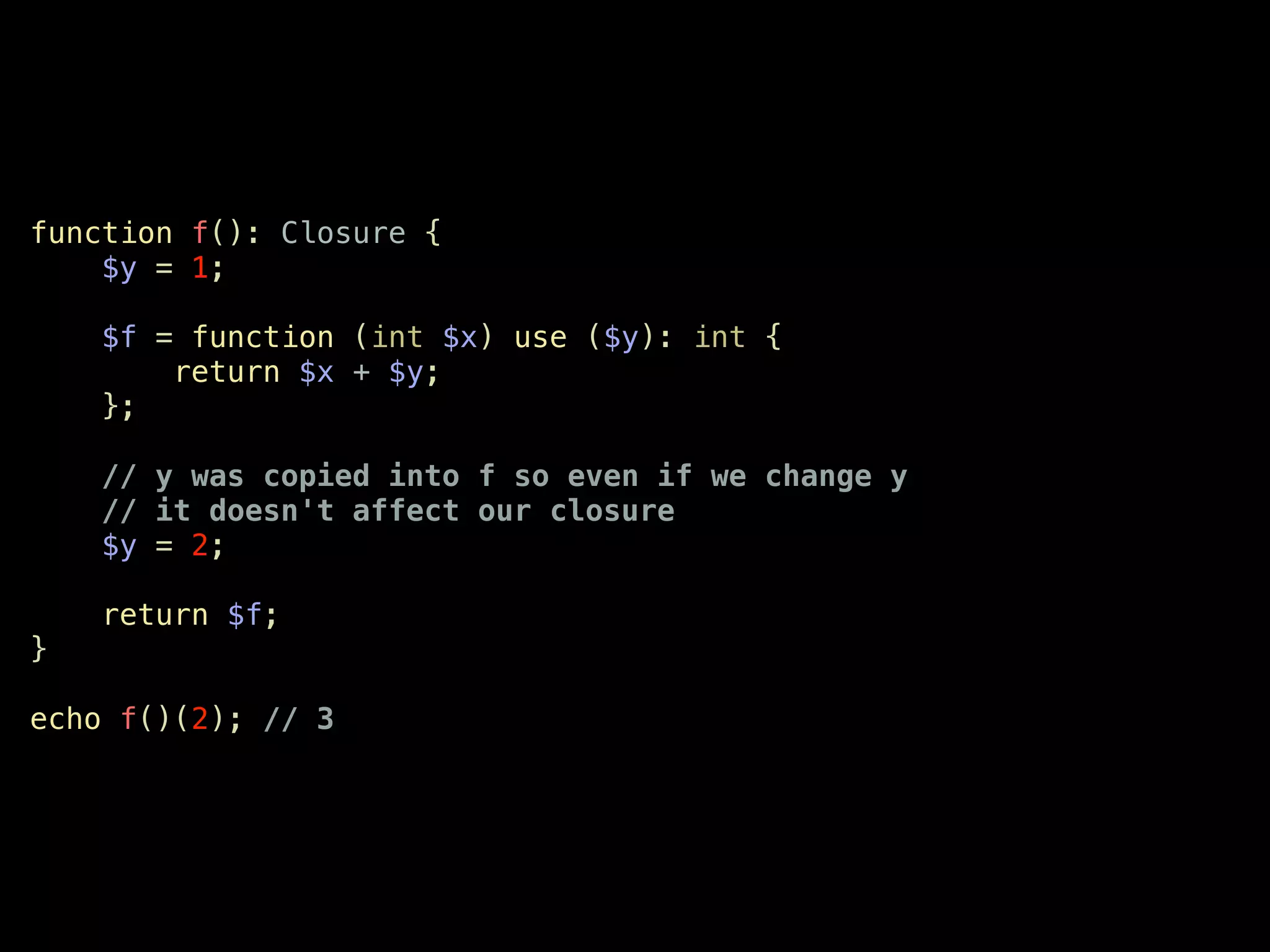



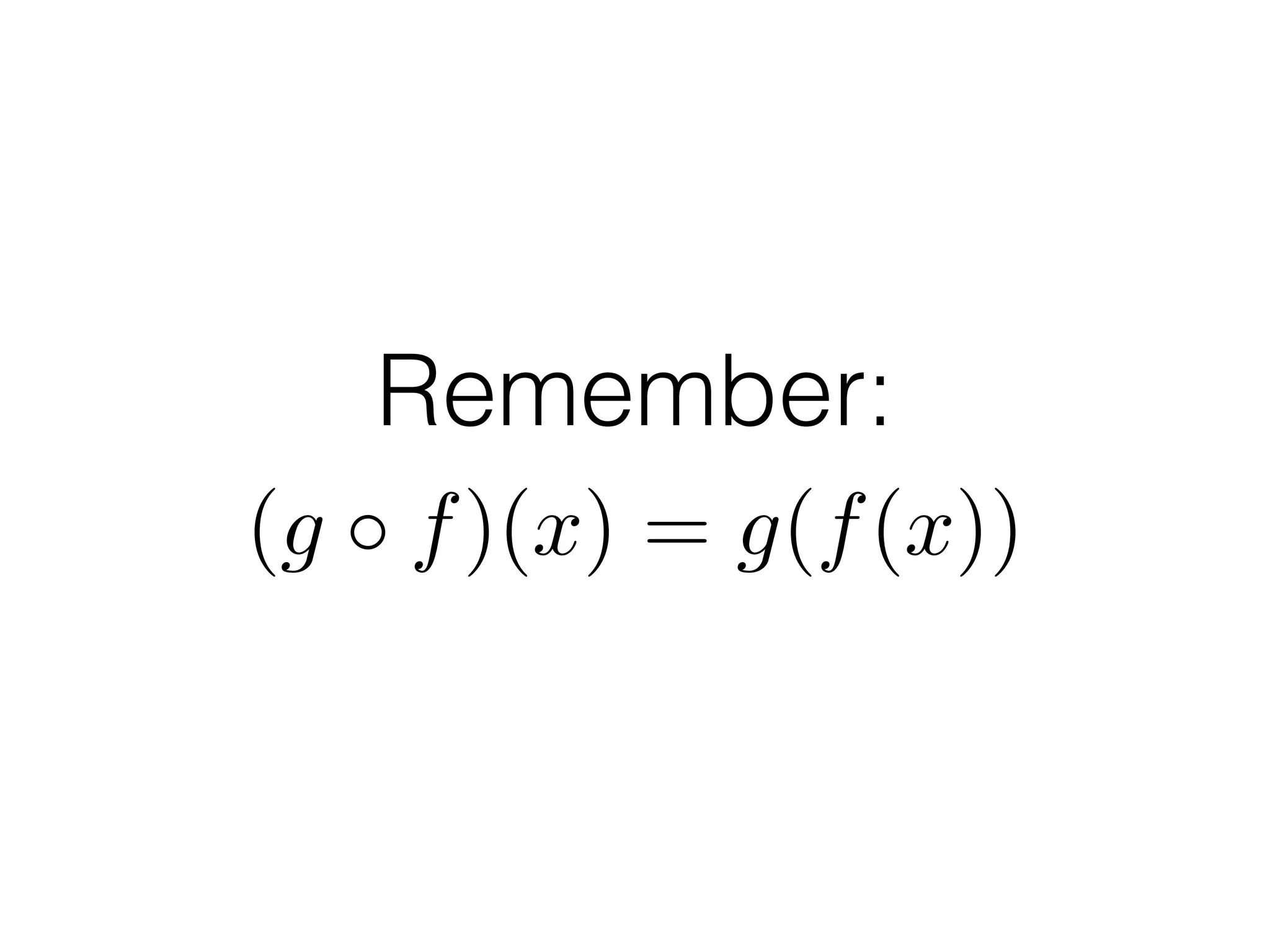
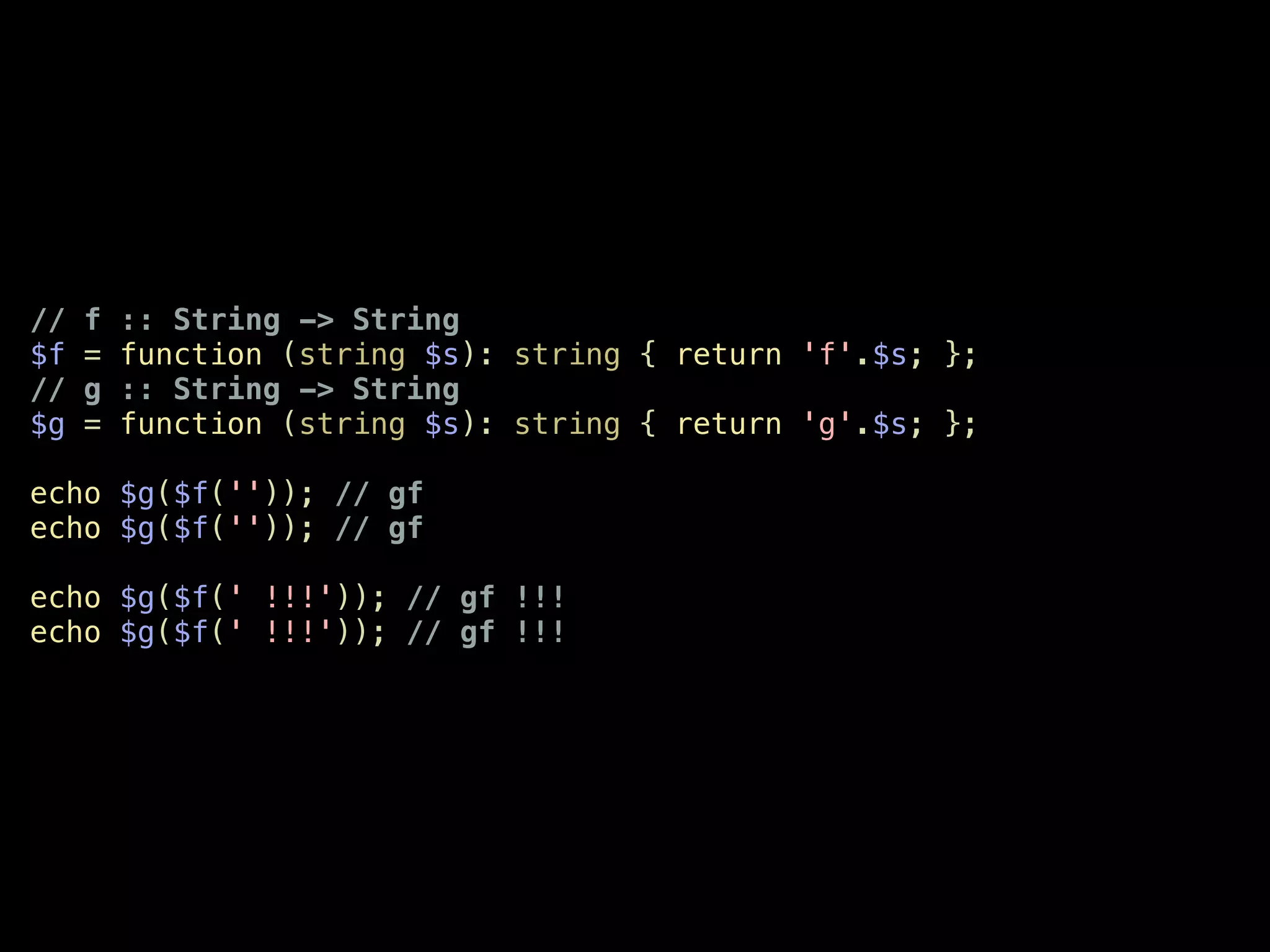
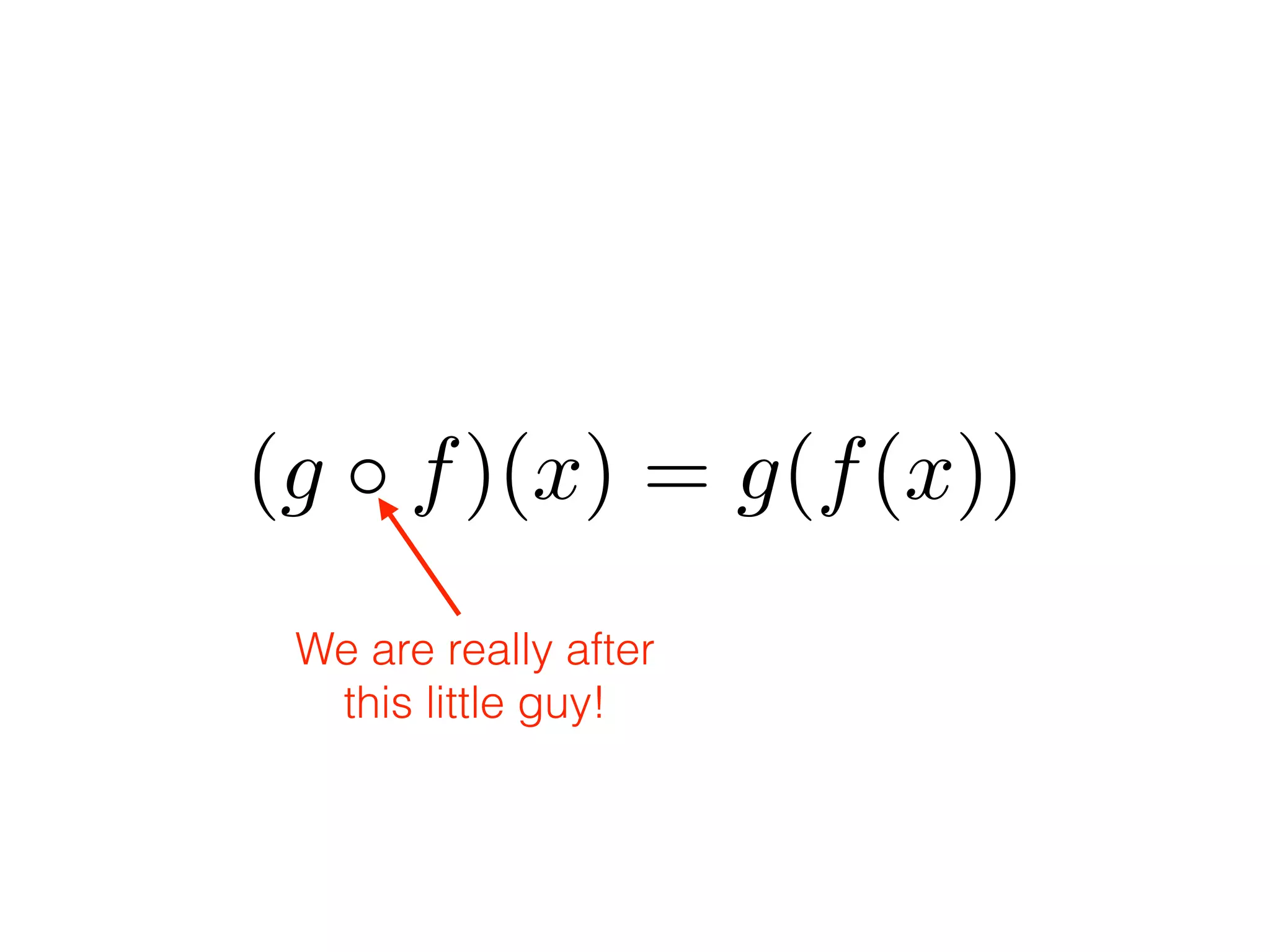
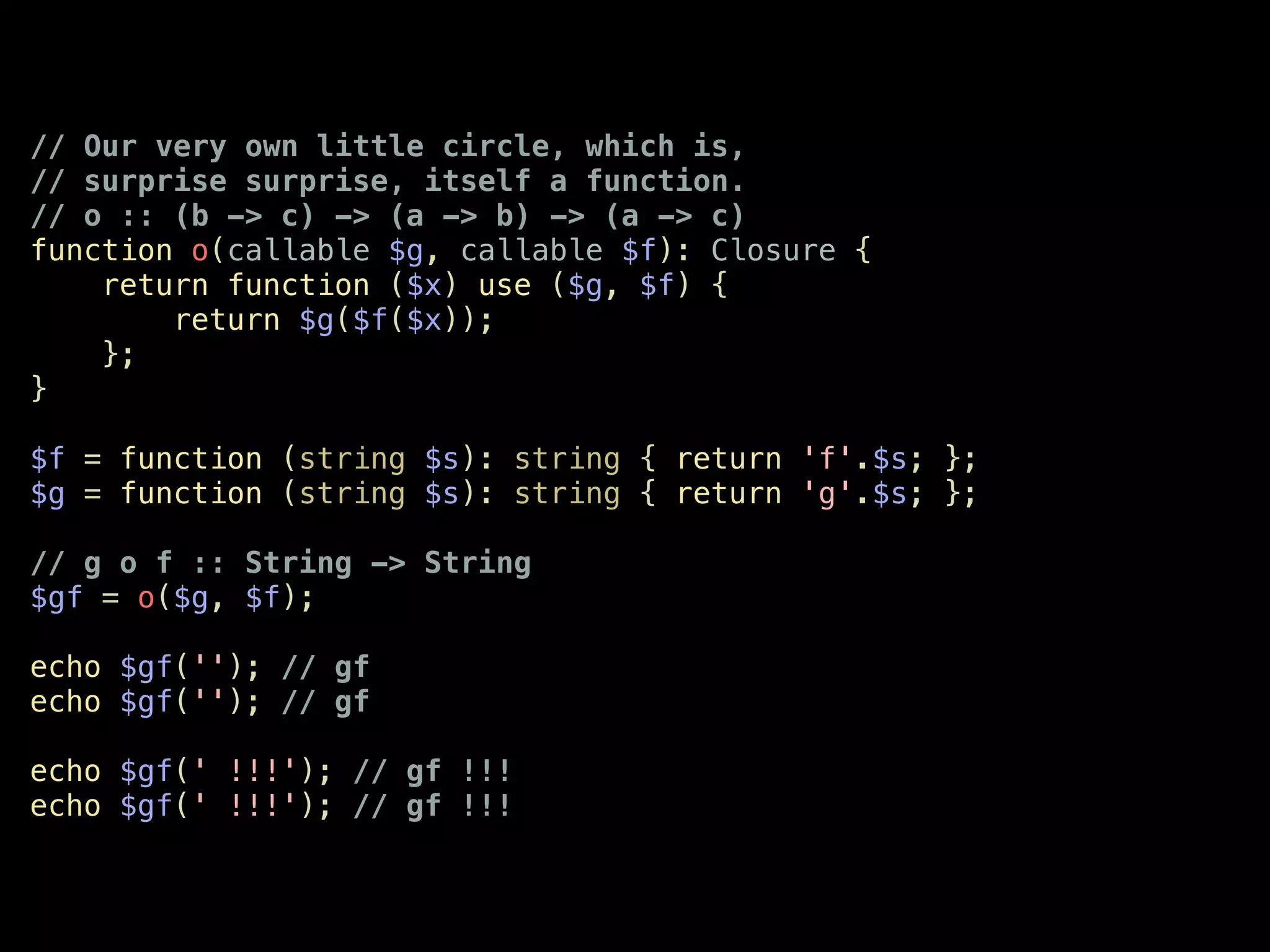
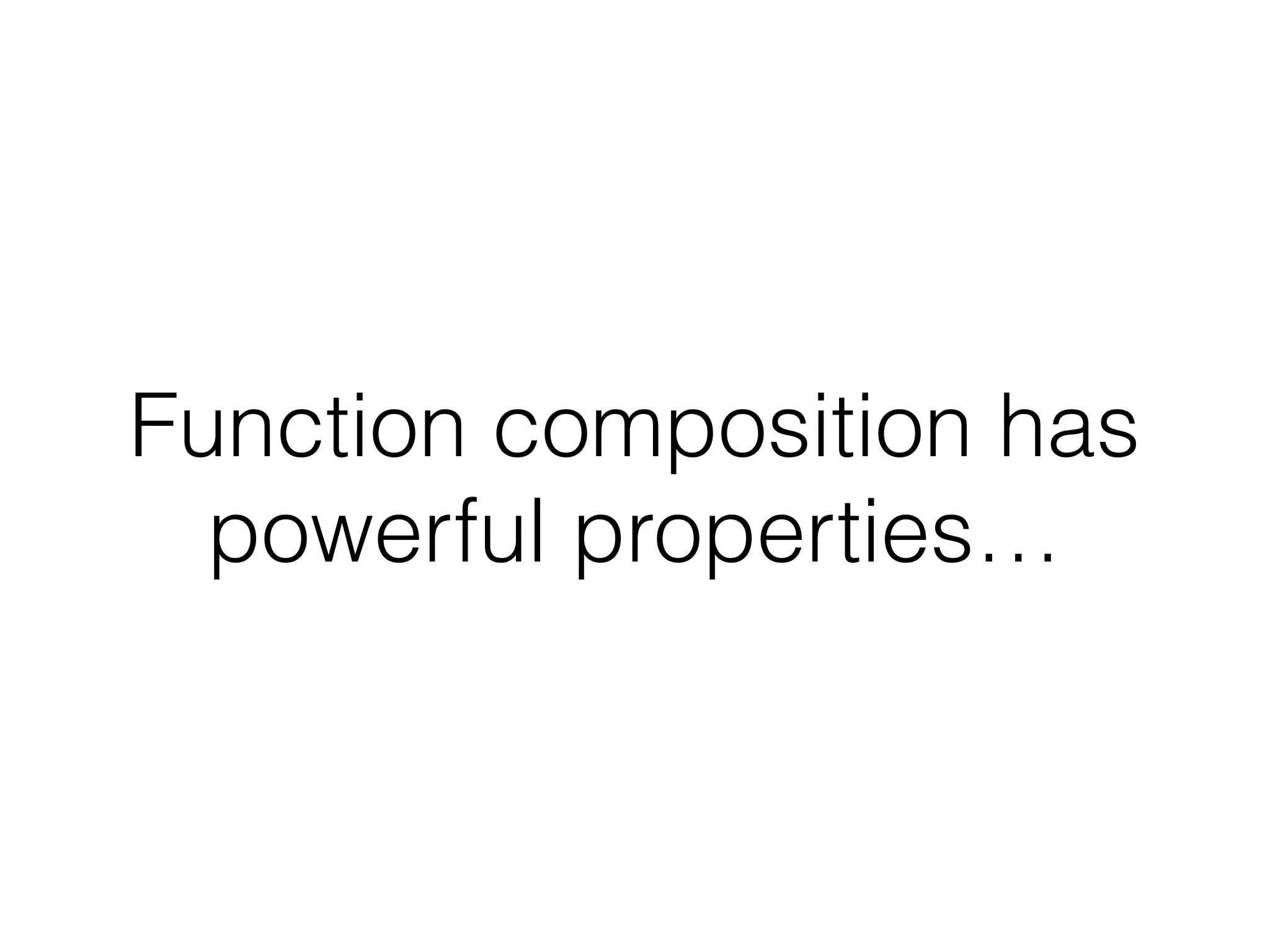
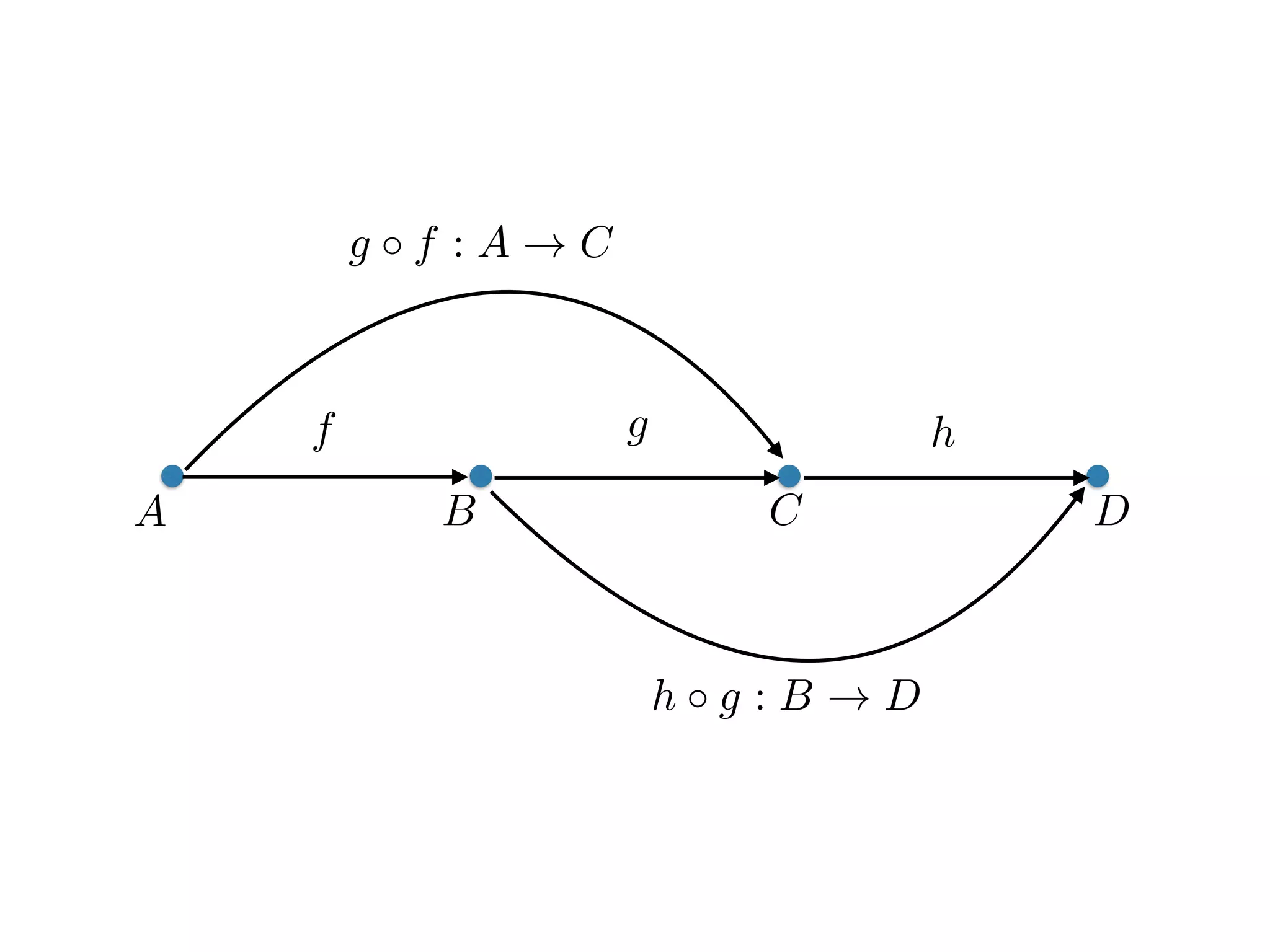
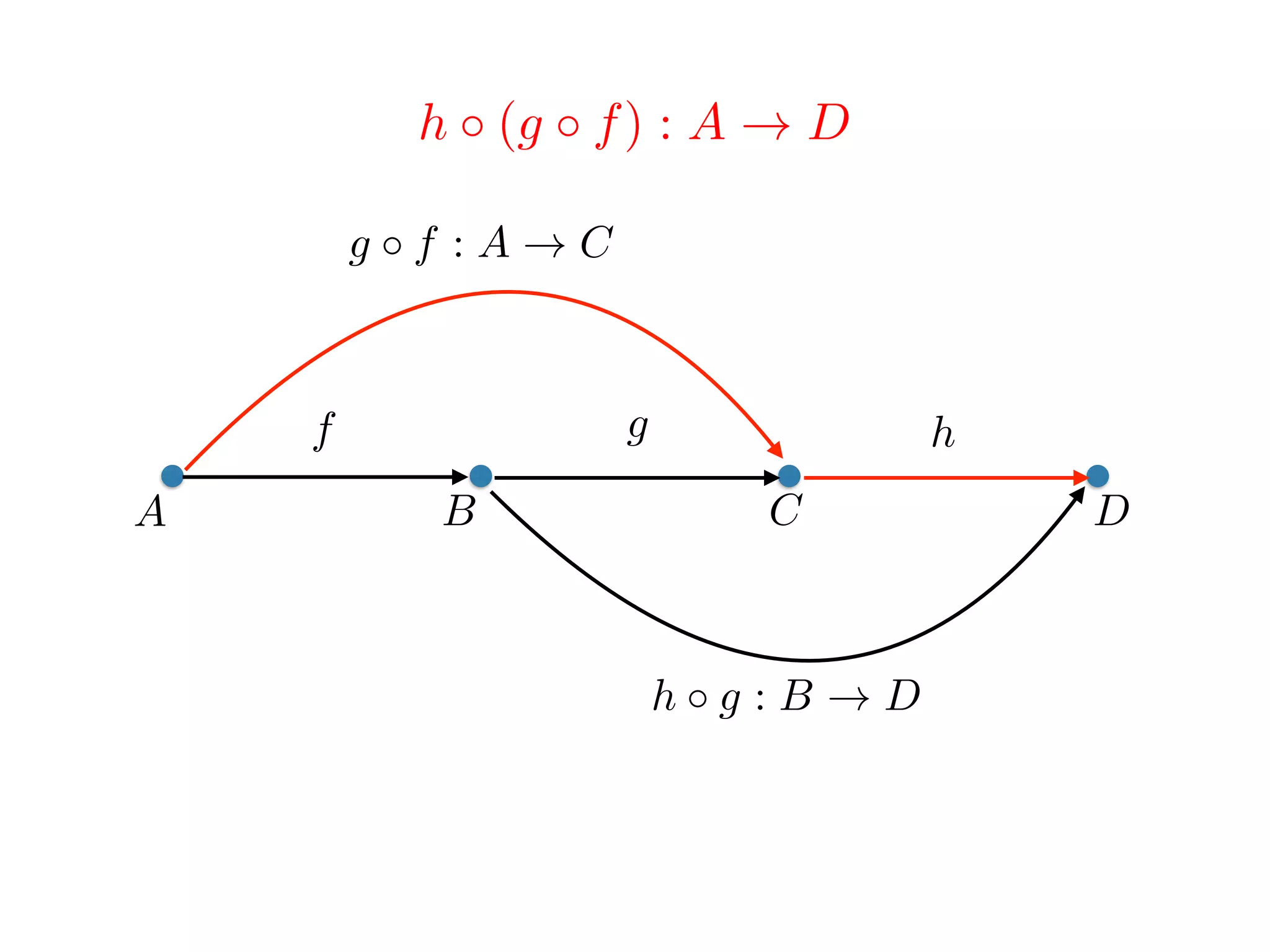
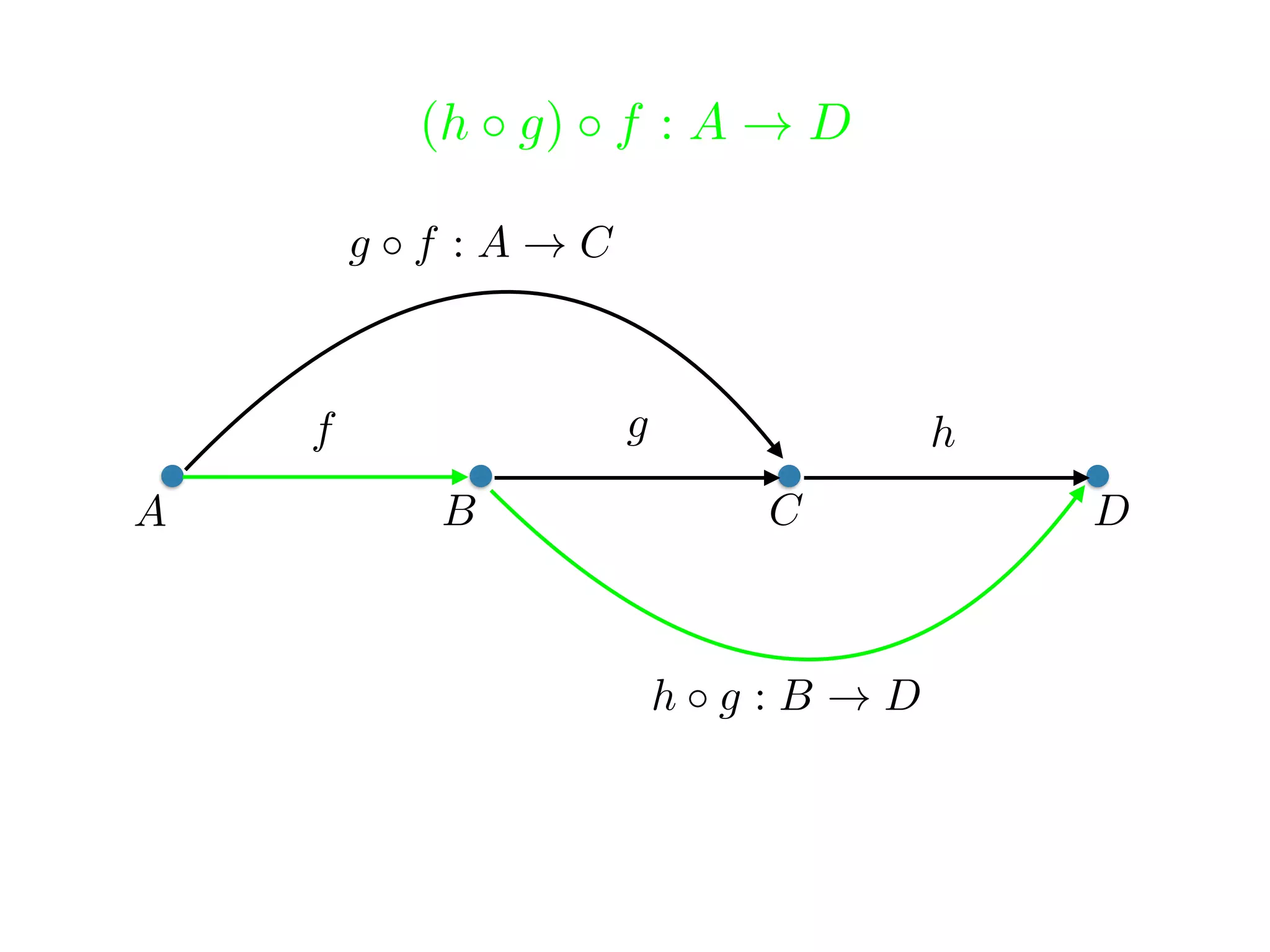
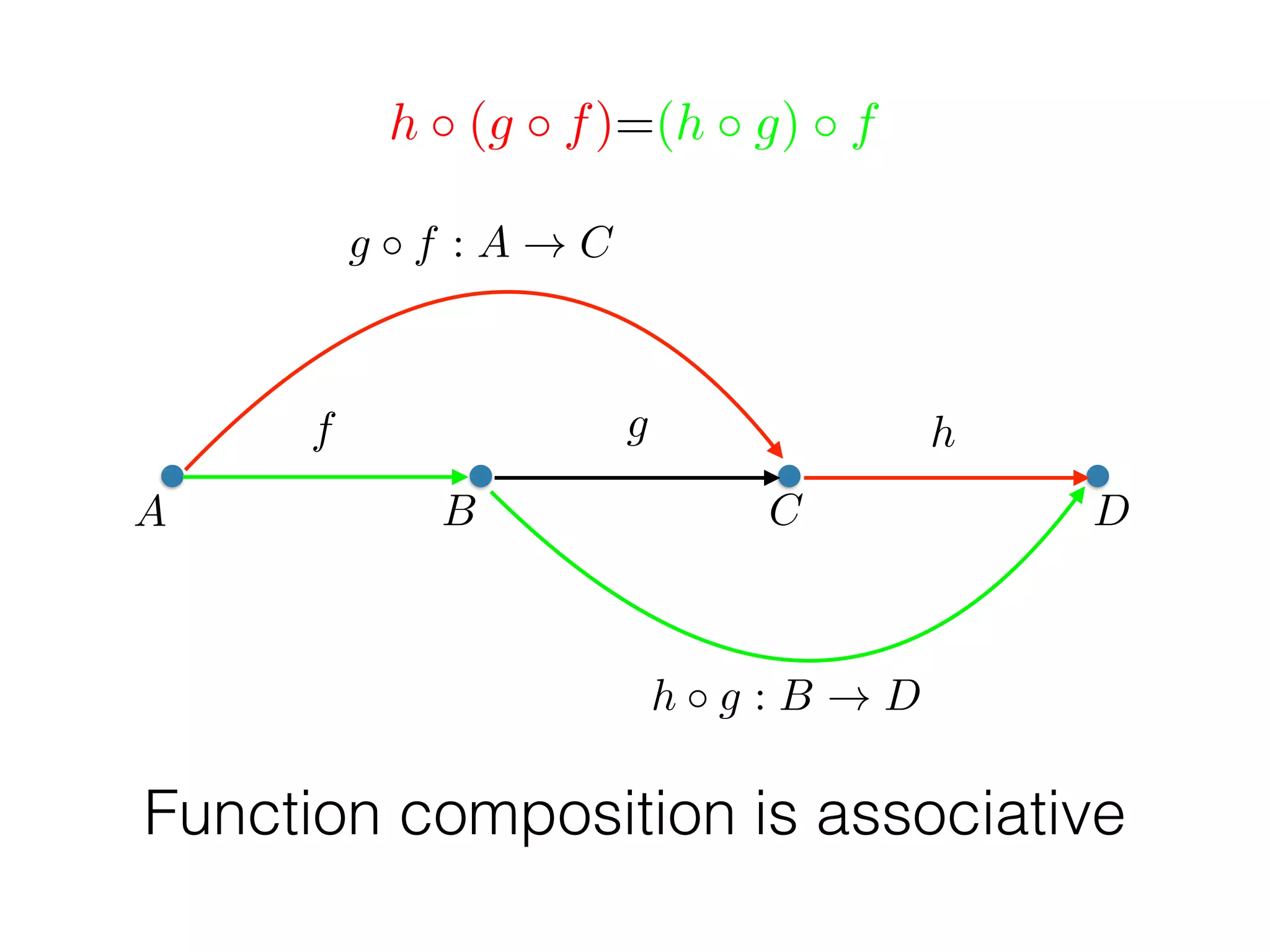
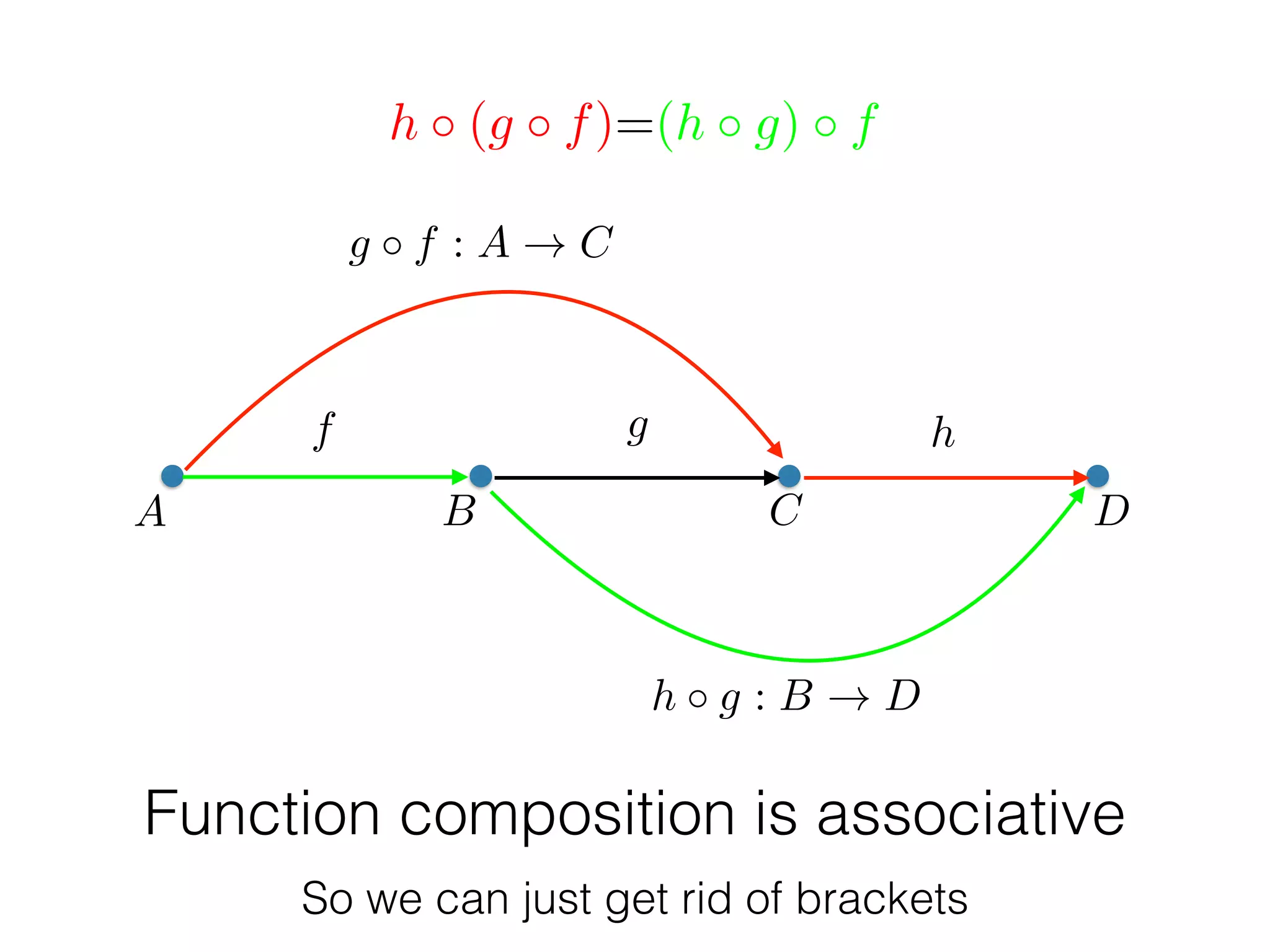
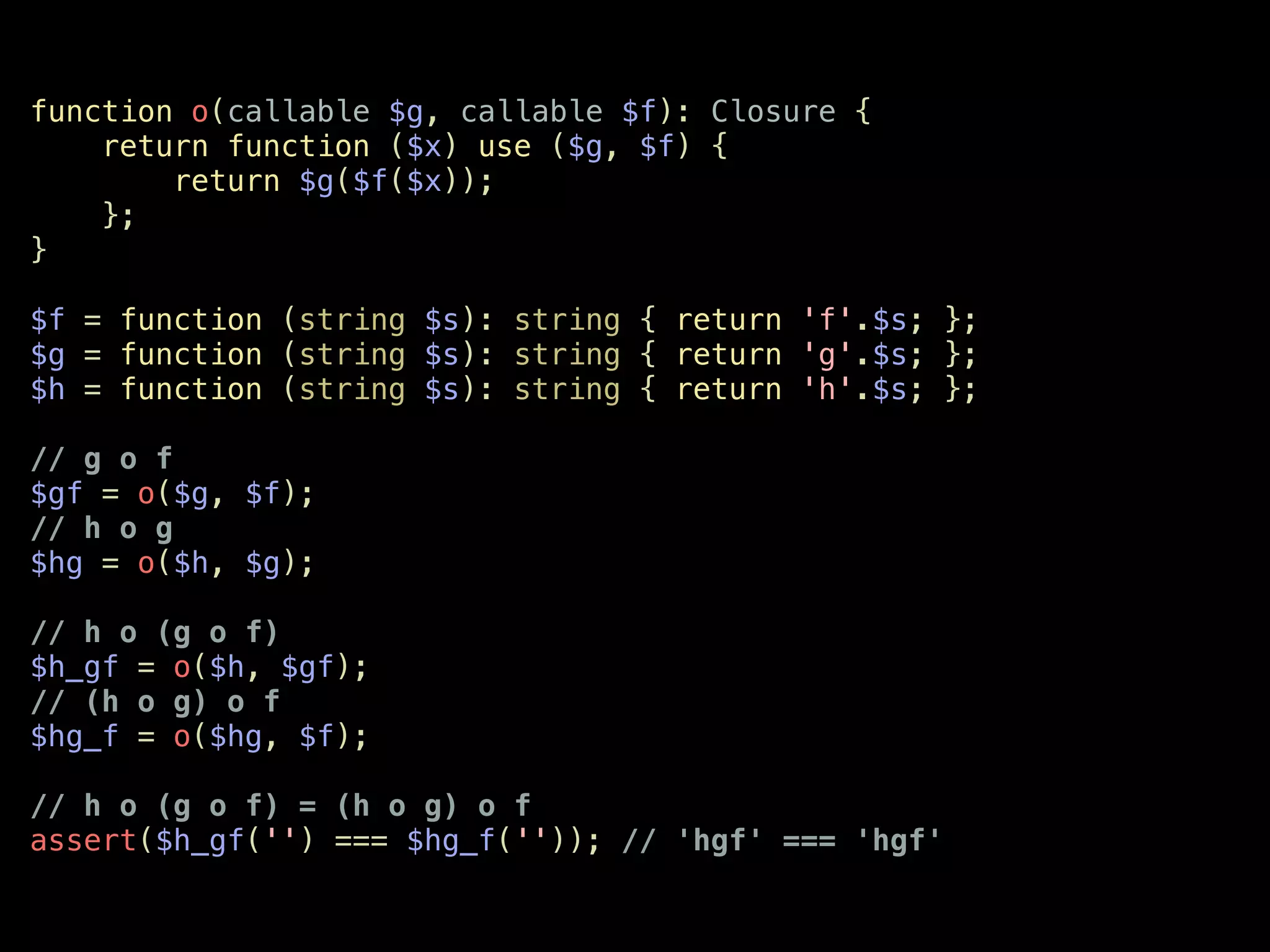
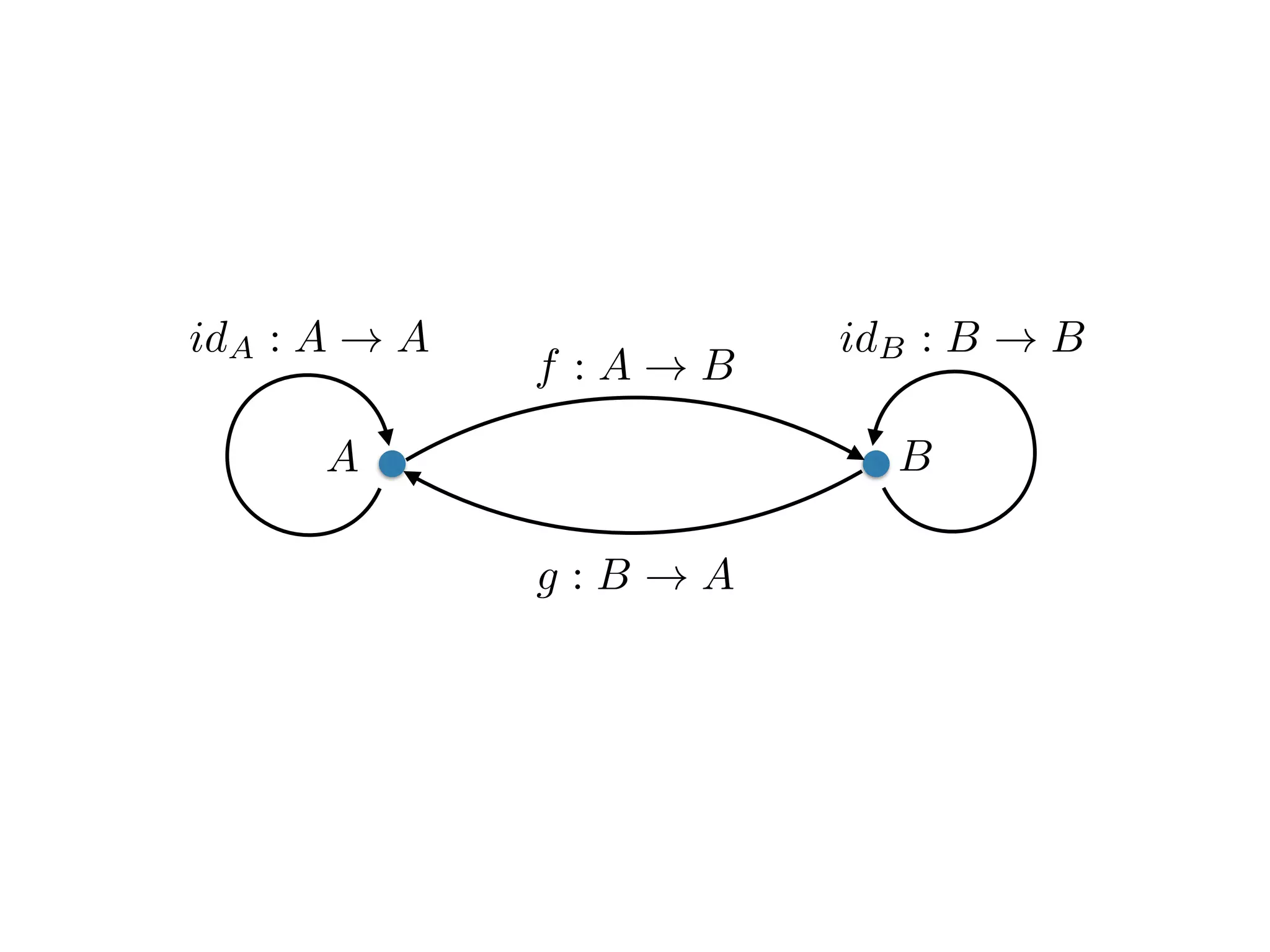
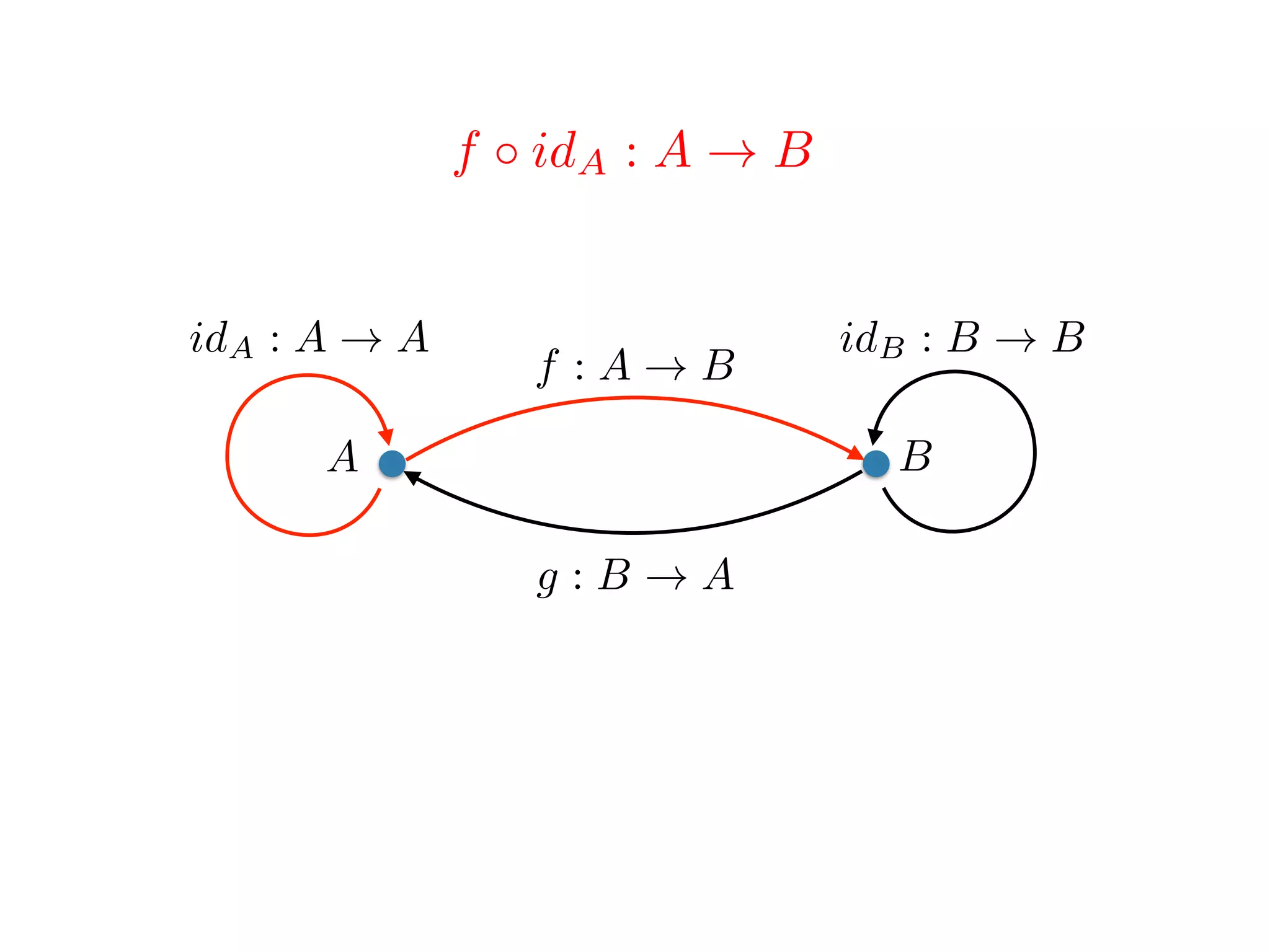
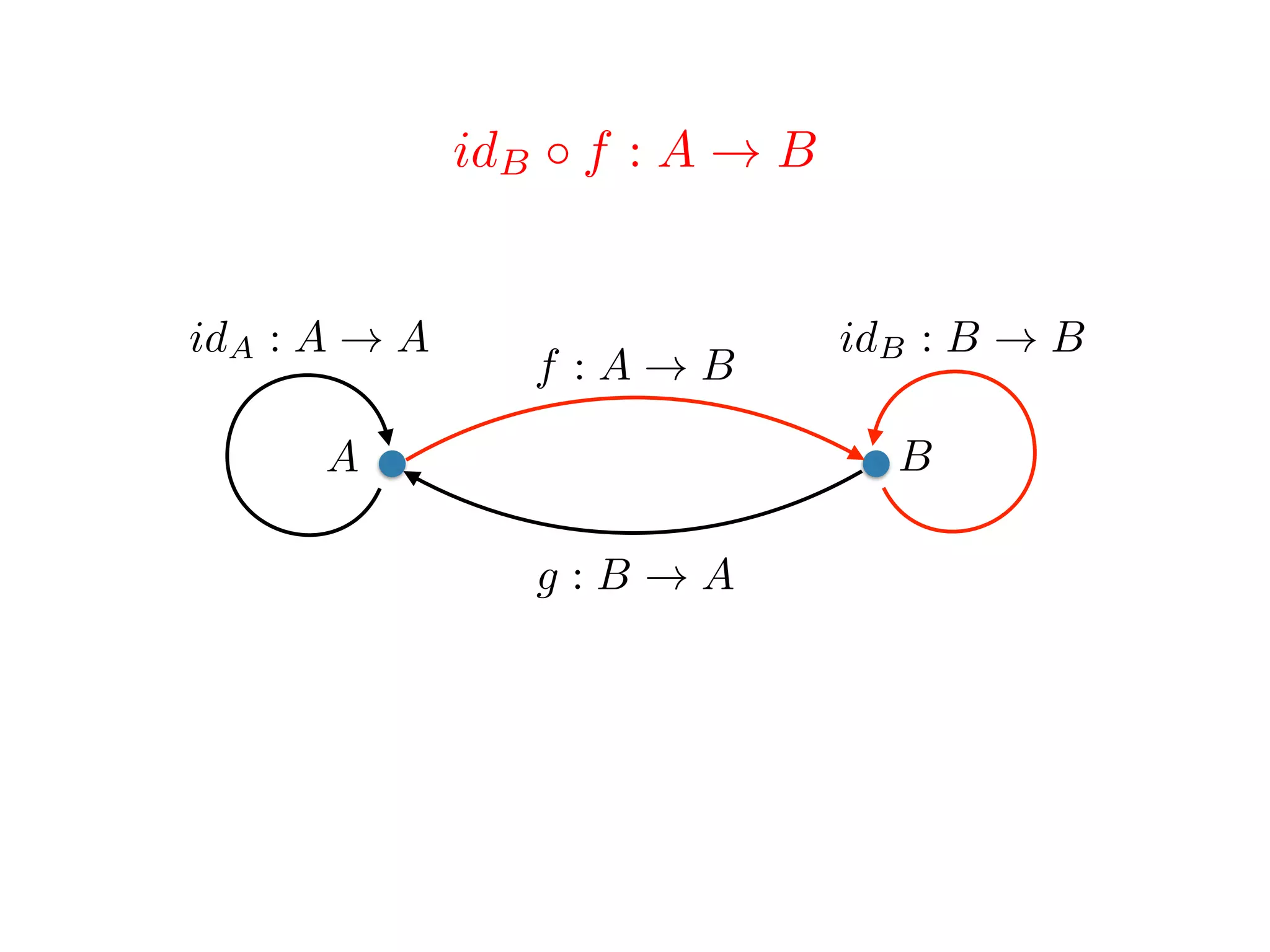
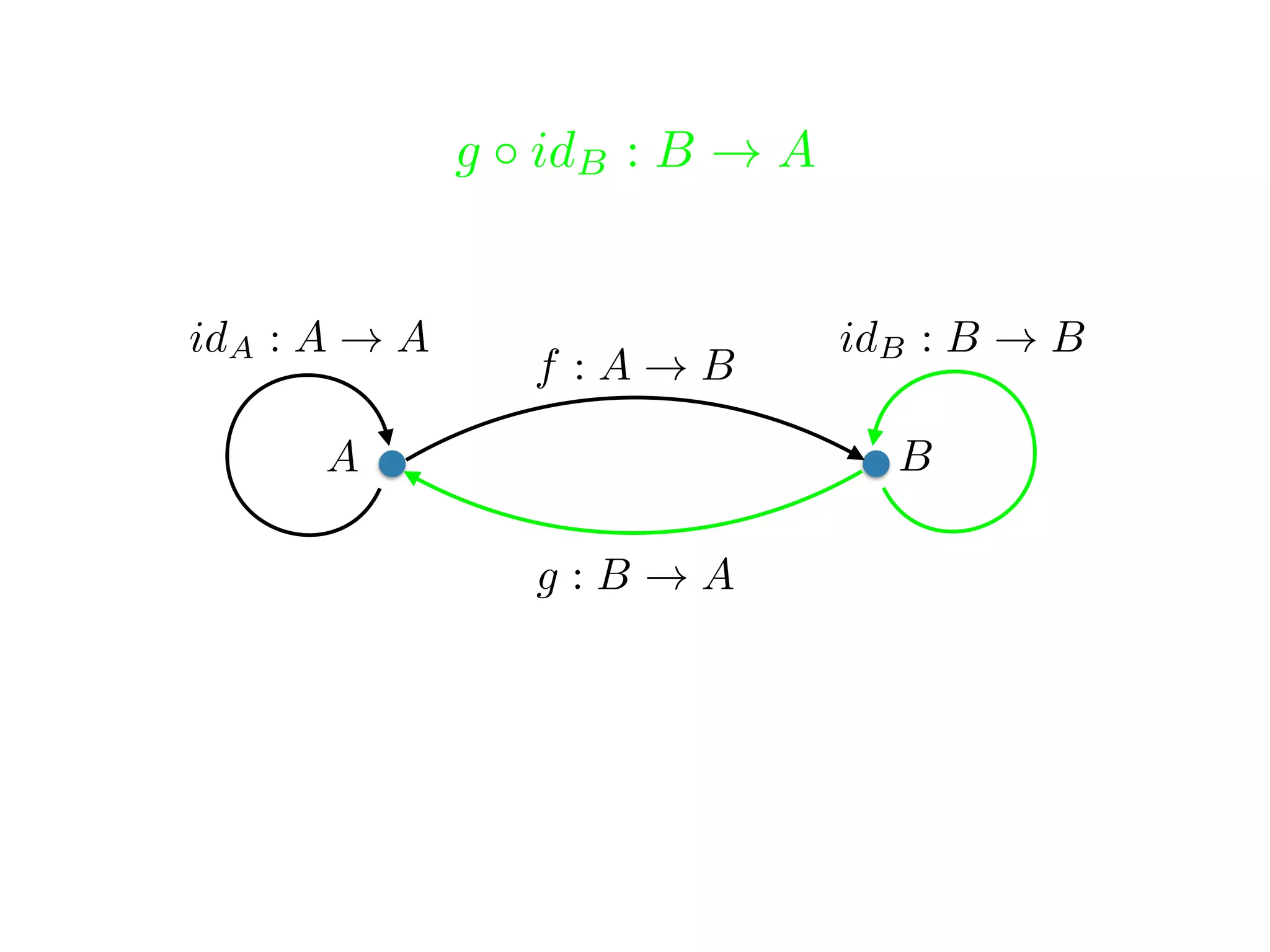
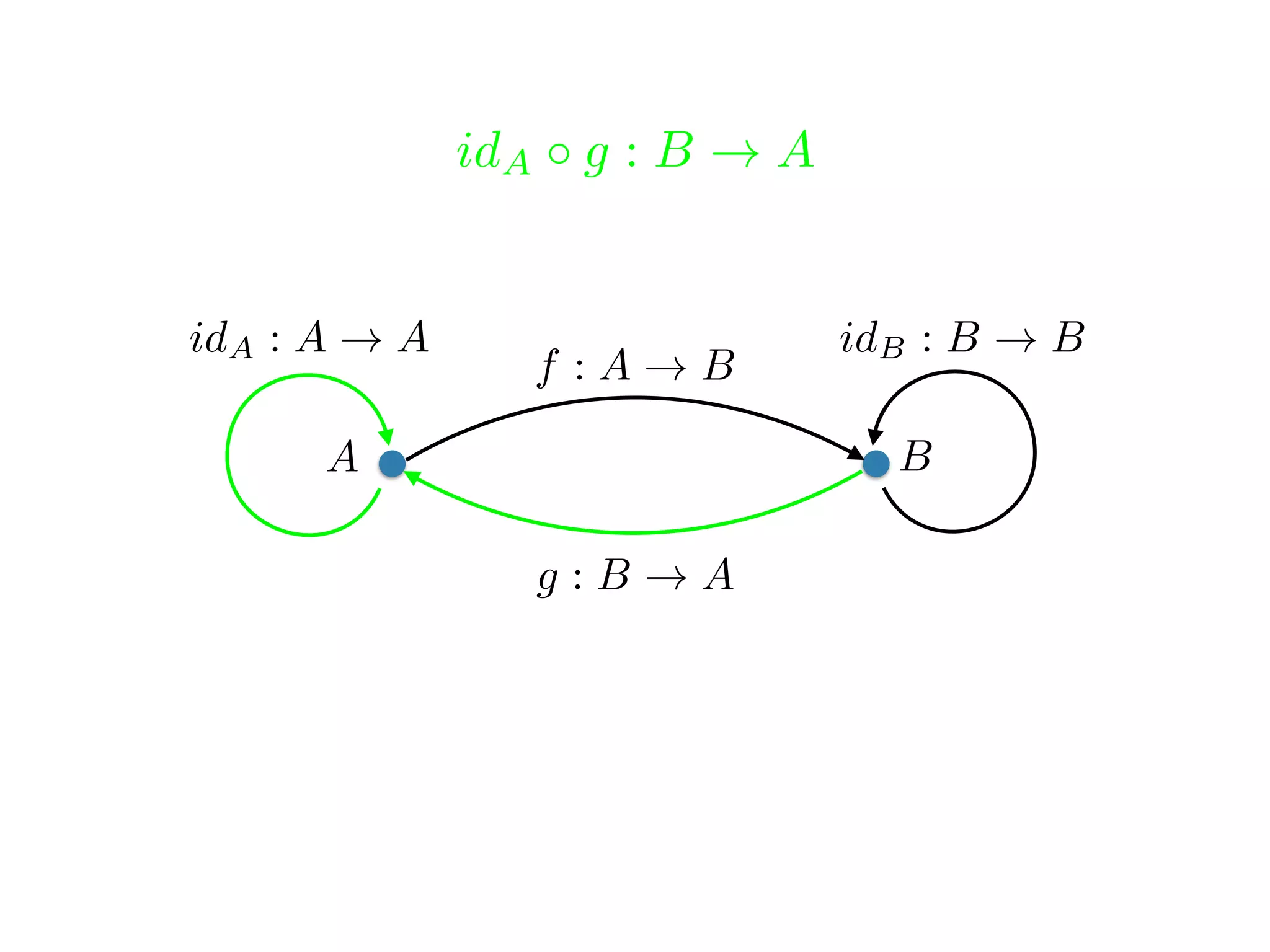
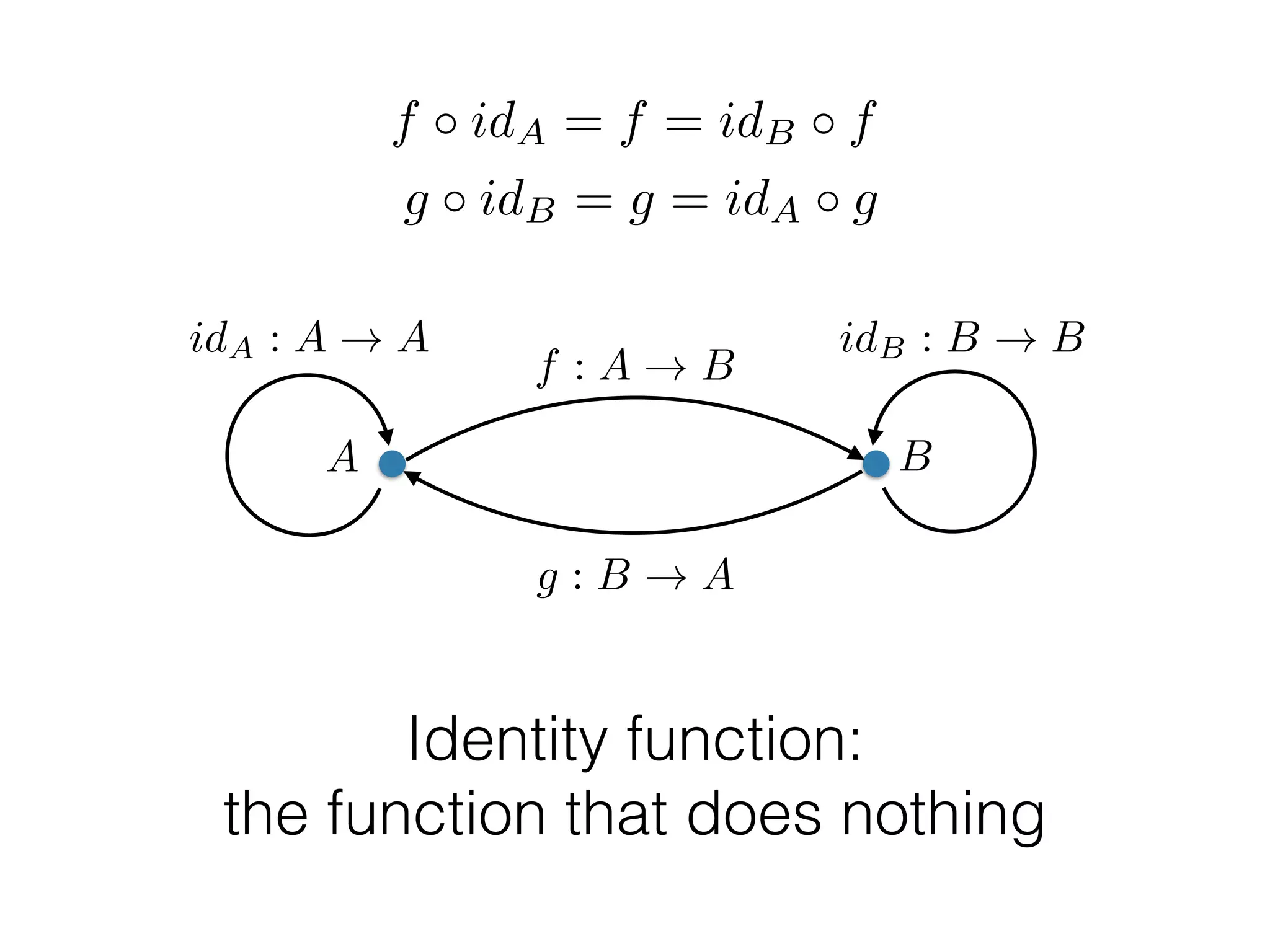
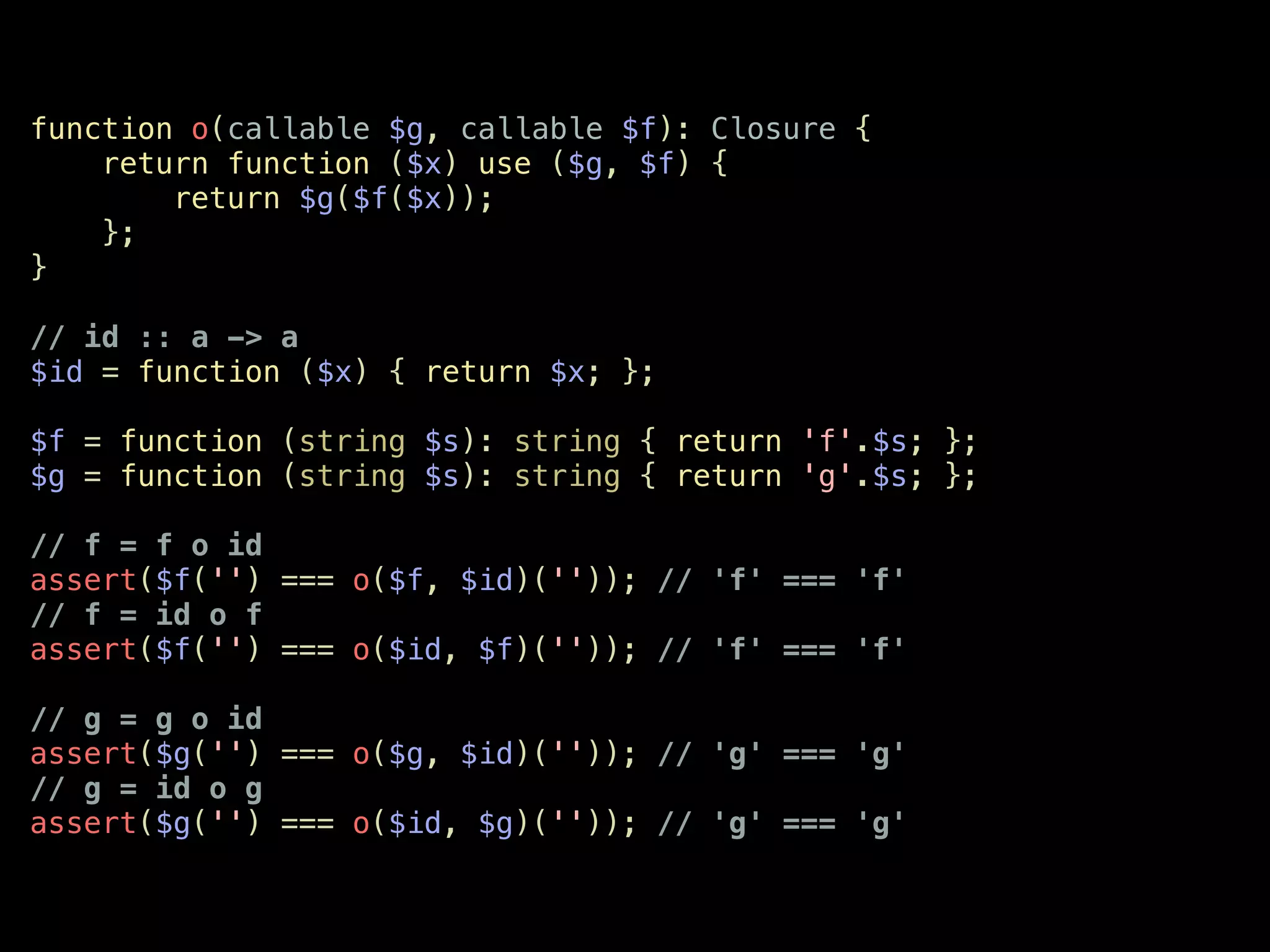

![// compose :: [a -> a] -> (a -> a)
function compose(callable ...$fs): Closure {
$f = array_shift($fs);
$composedFs = count($fs) > 0
? compose(...$fs)
: function ($x) { return $x; }; // our friend, id
// our other friend, little circle
return function ($x) use ($f, $composedFs) {
return $f($composedFs($x));
};
}
$f = function (string $s): string { return 'f'.$s; };
$g = function (string $s): string { return 'g'.$s; };
$h = function (string $s): string { return 'h'.$s; };
$hgf = compose($h, $g, $f);
echo $hgf(''); // 'hgf'](https://image.slidesharecdn.com/keynote151216-161221233845/75/Functional-Programming-in-PHP-67-2048.jpg)

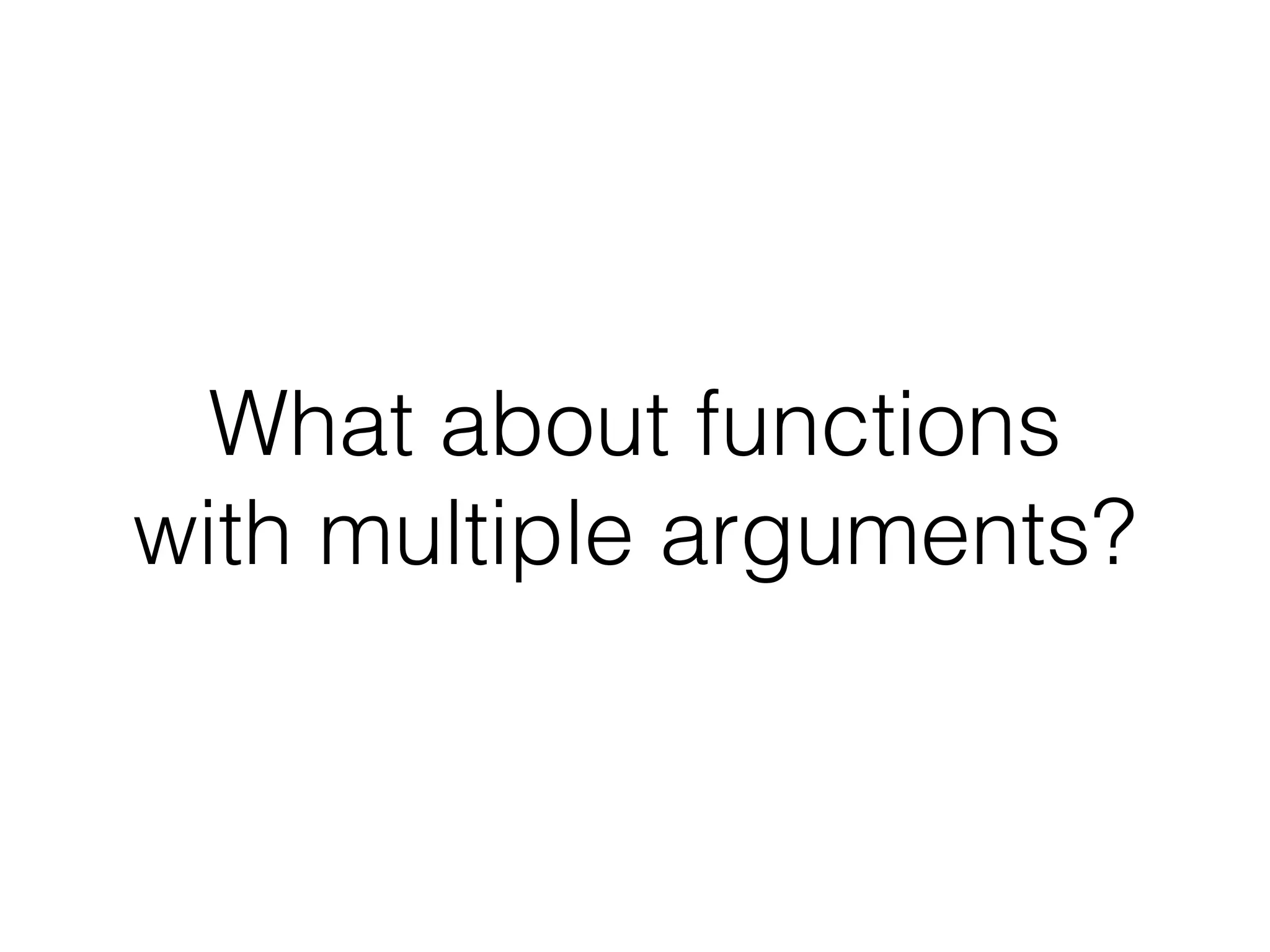
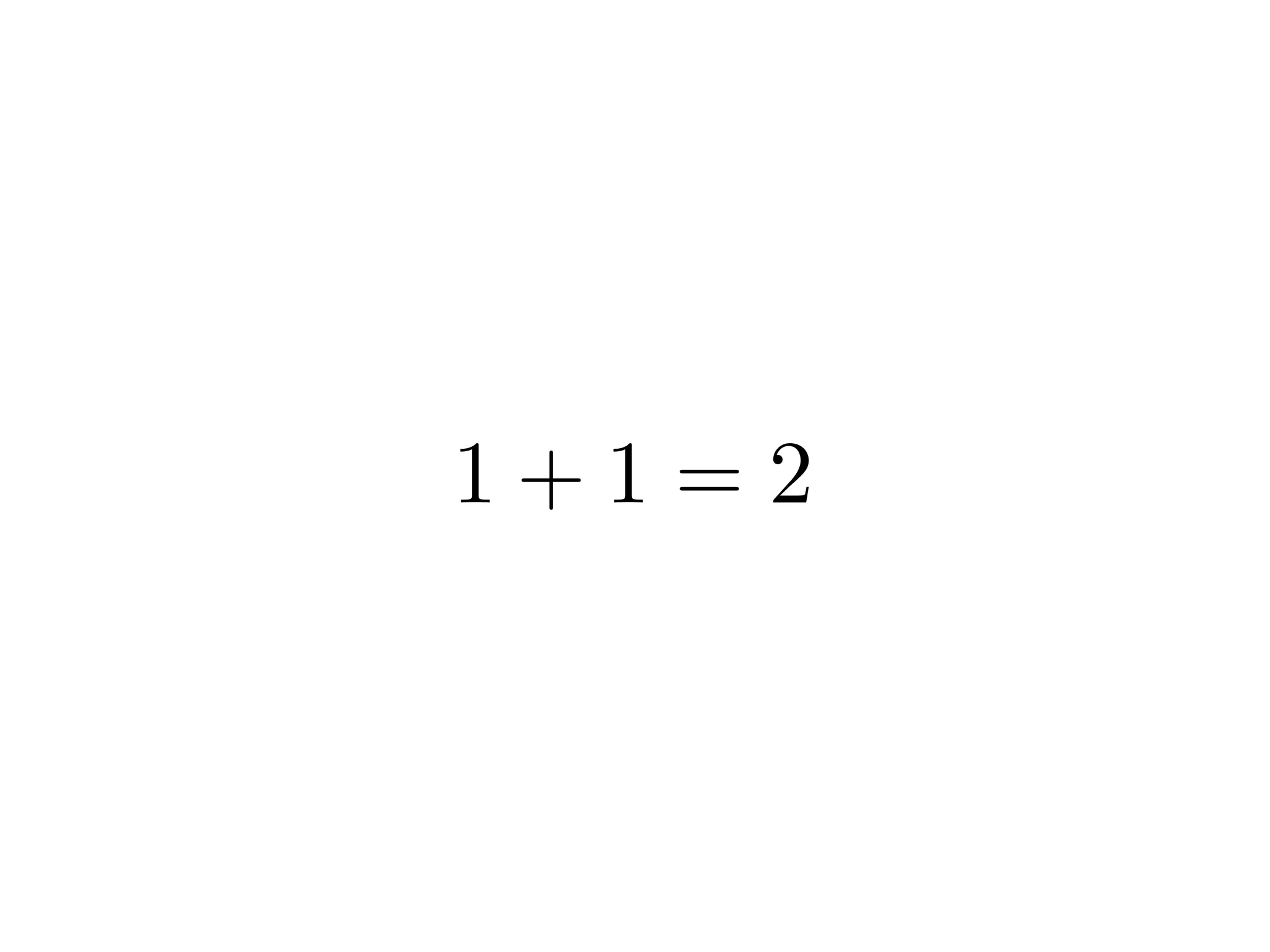
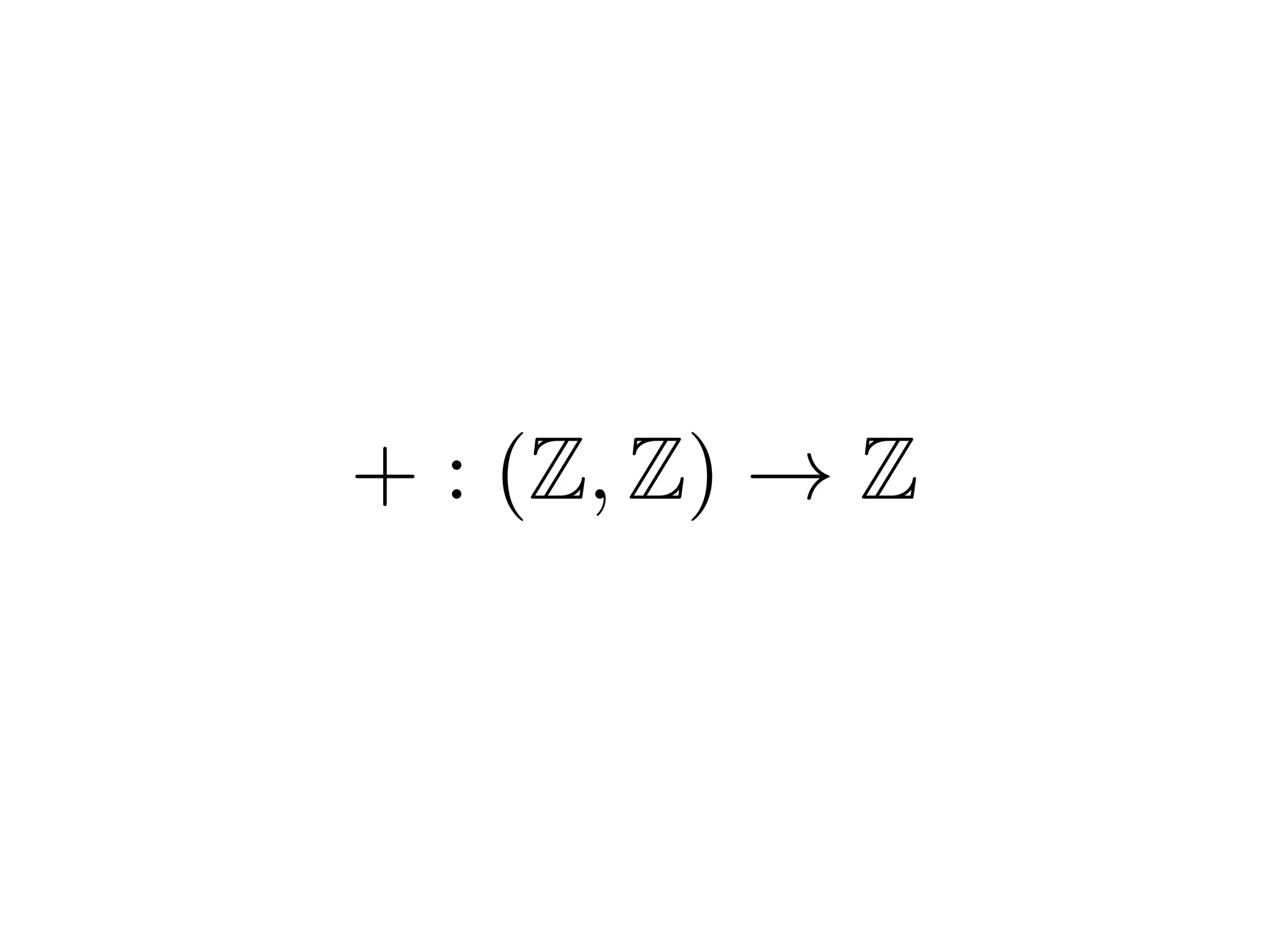
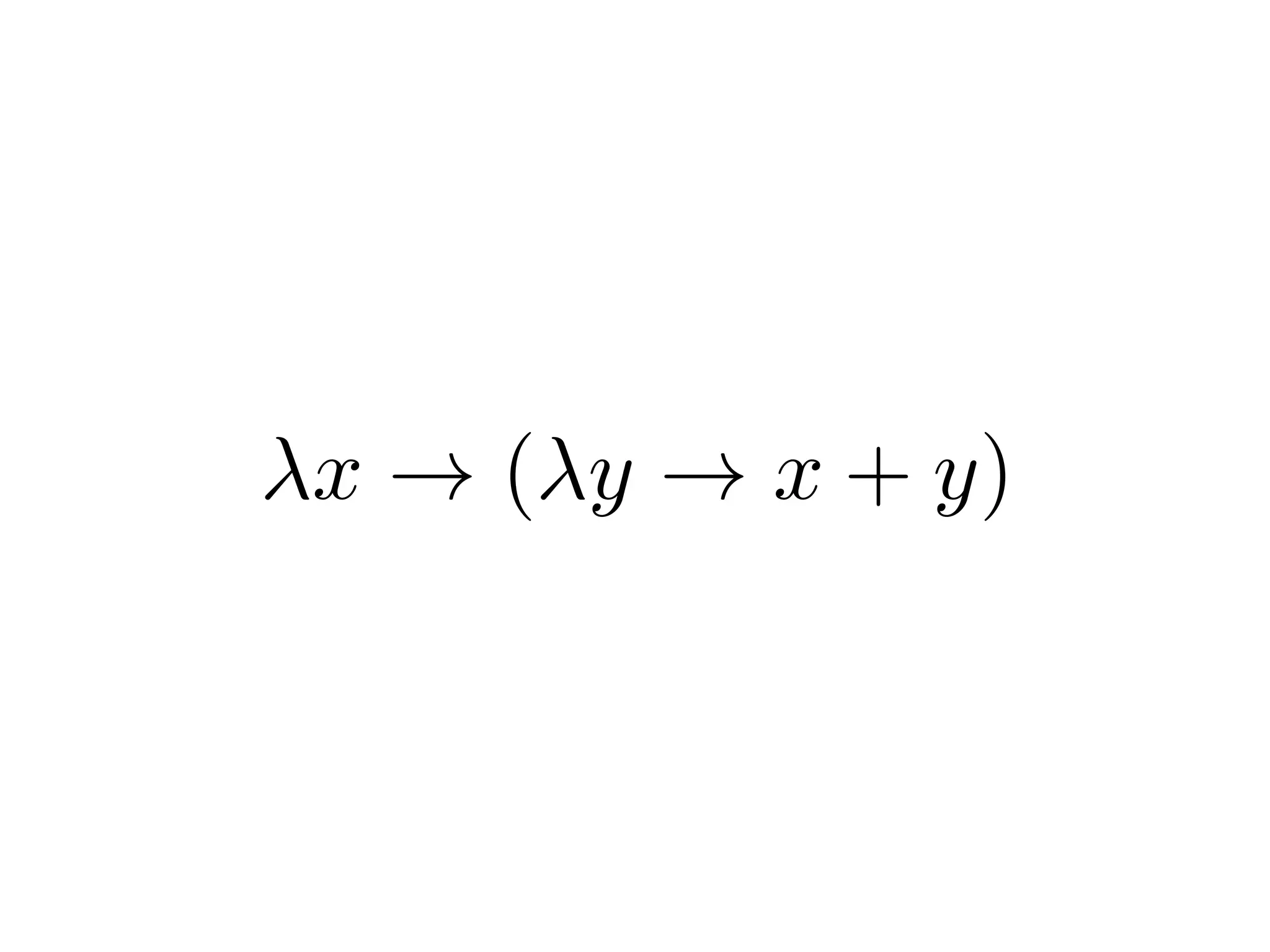
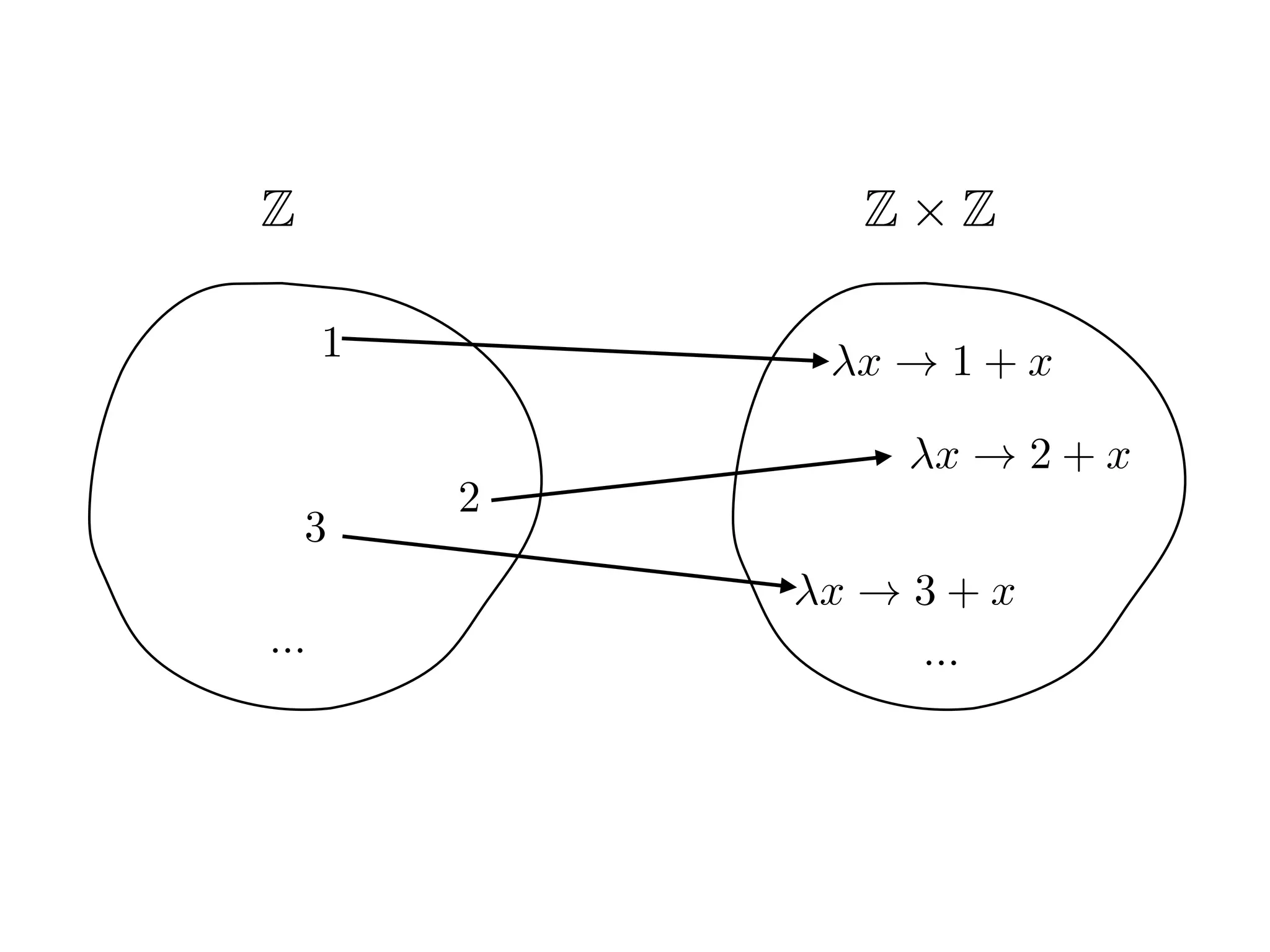
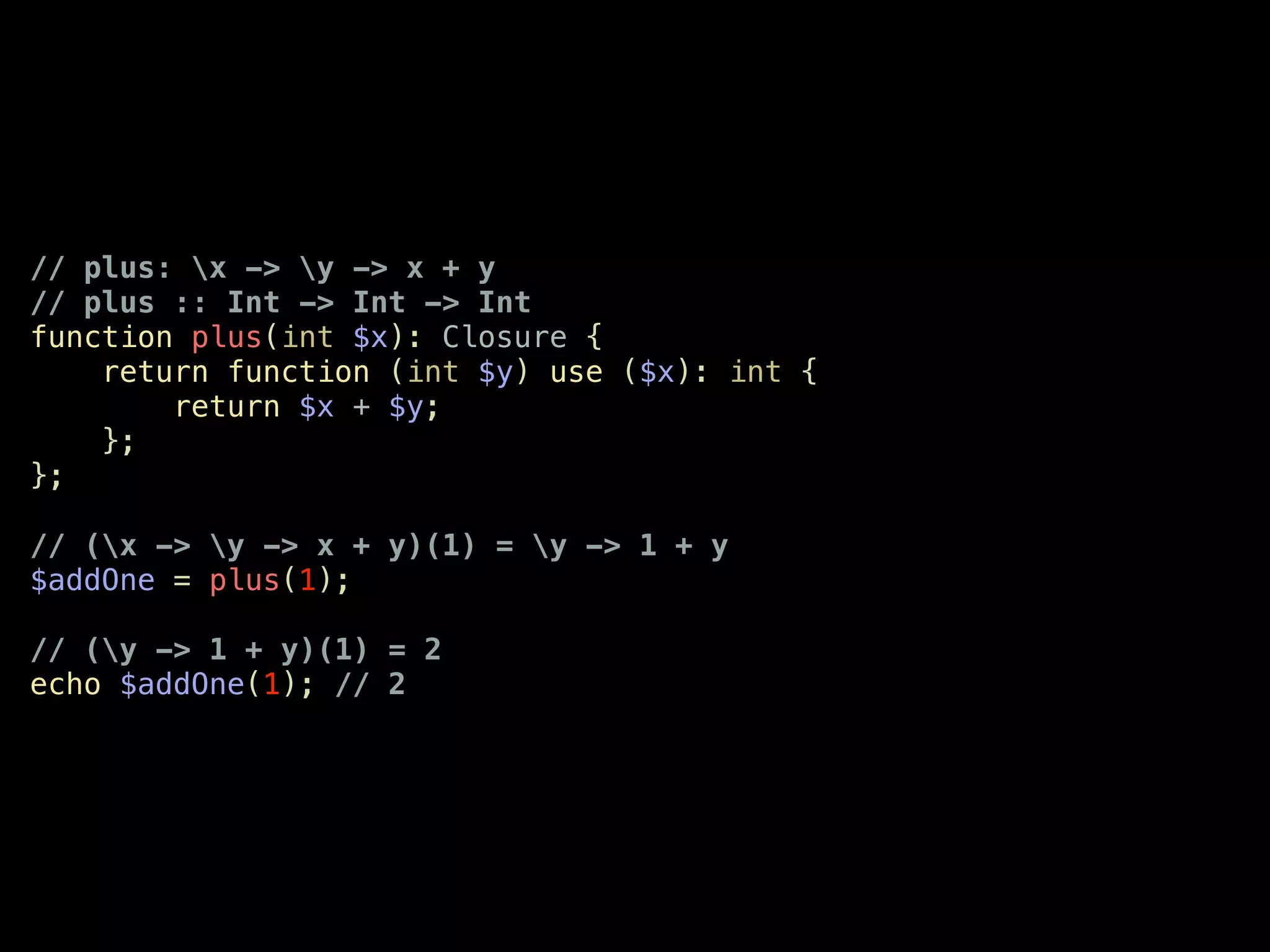
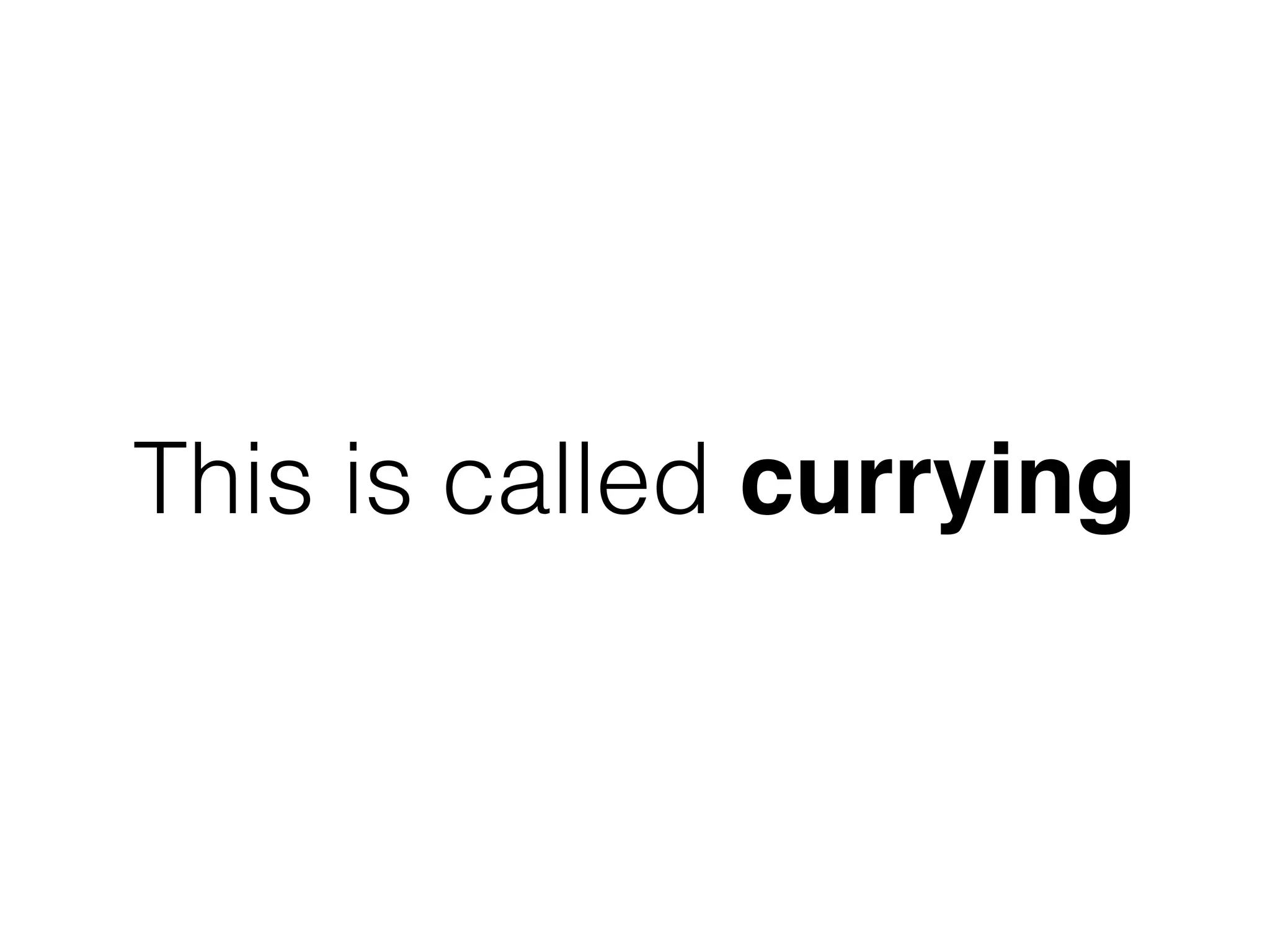
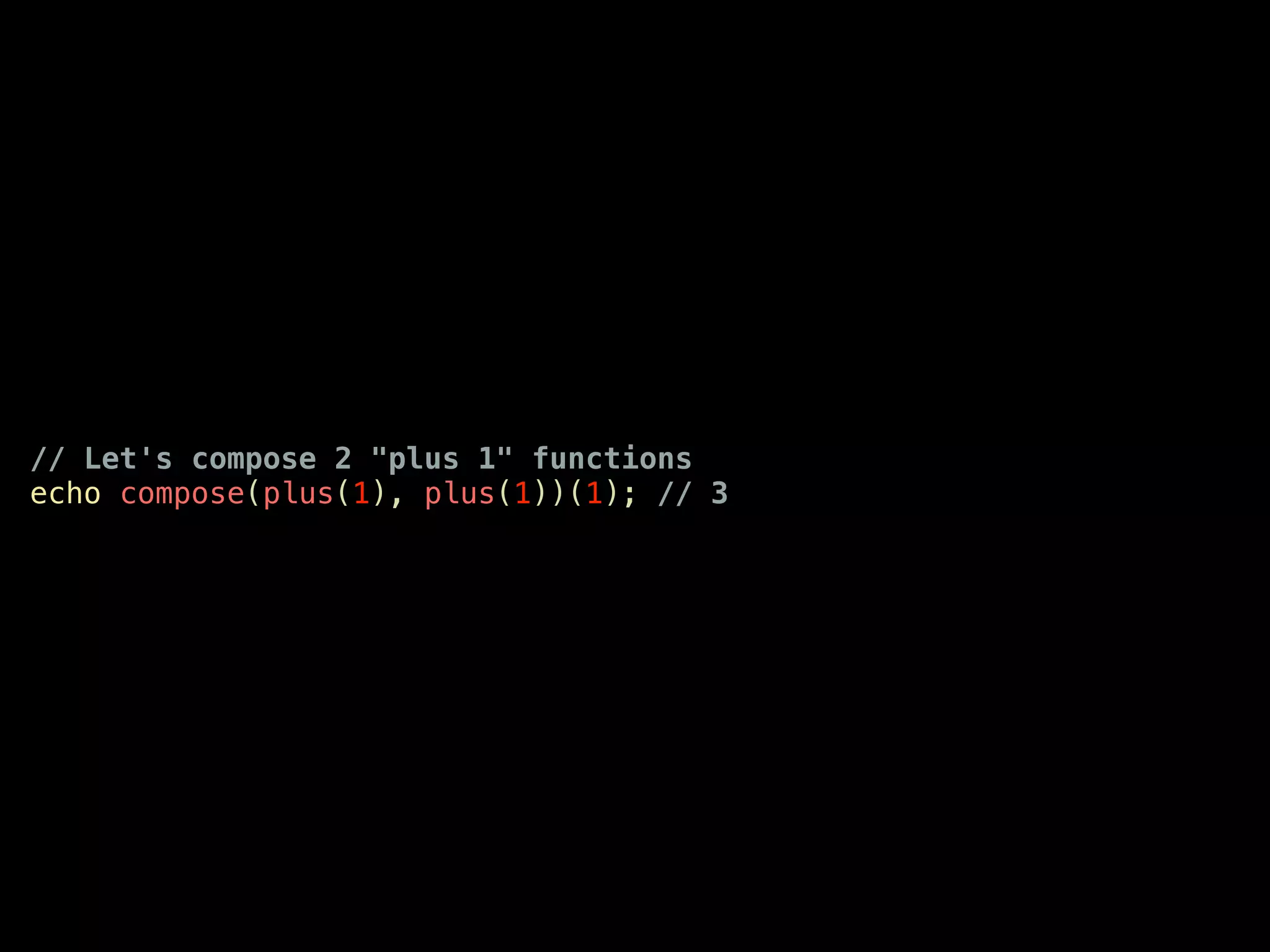

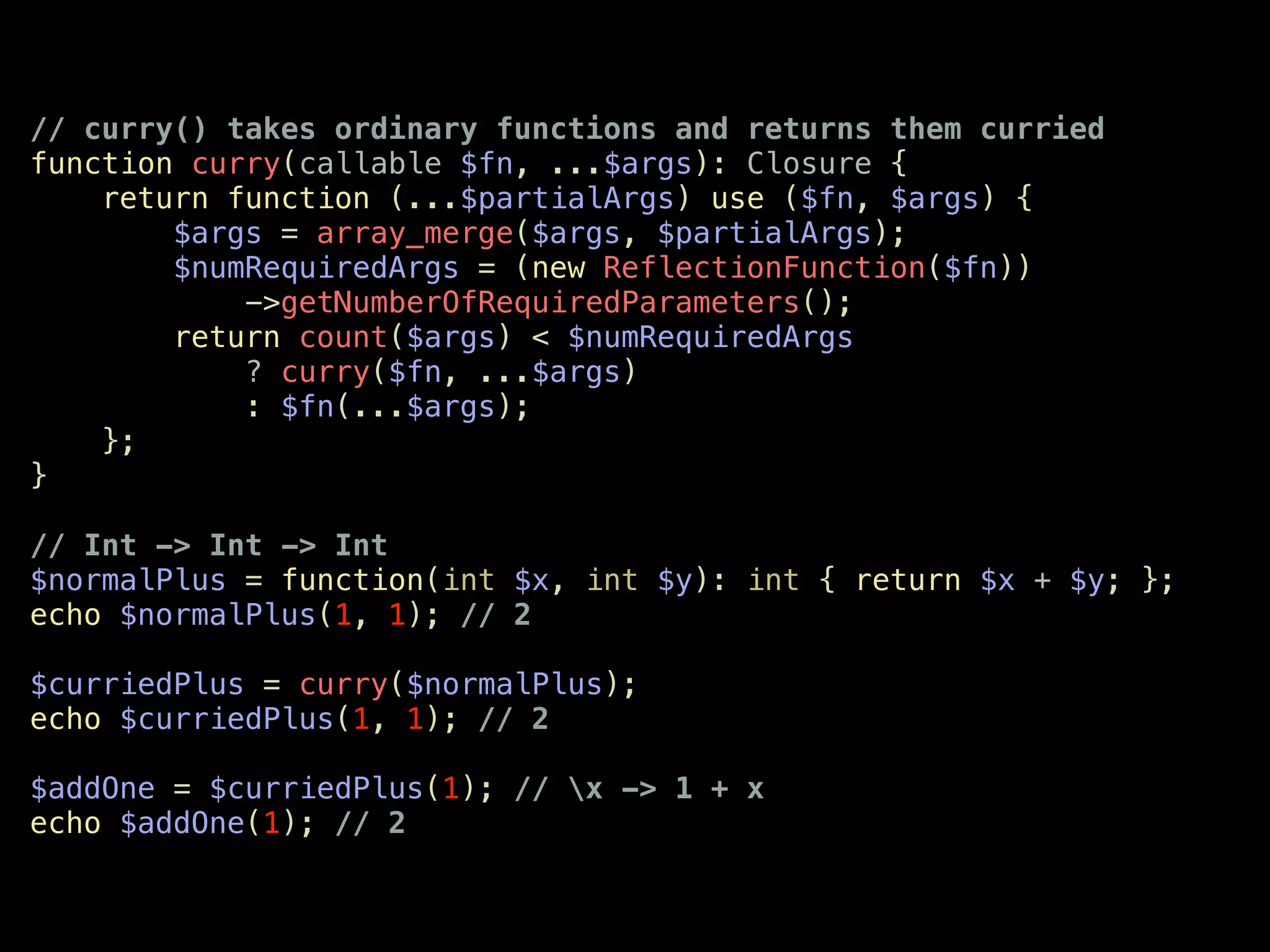
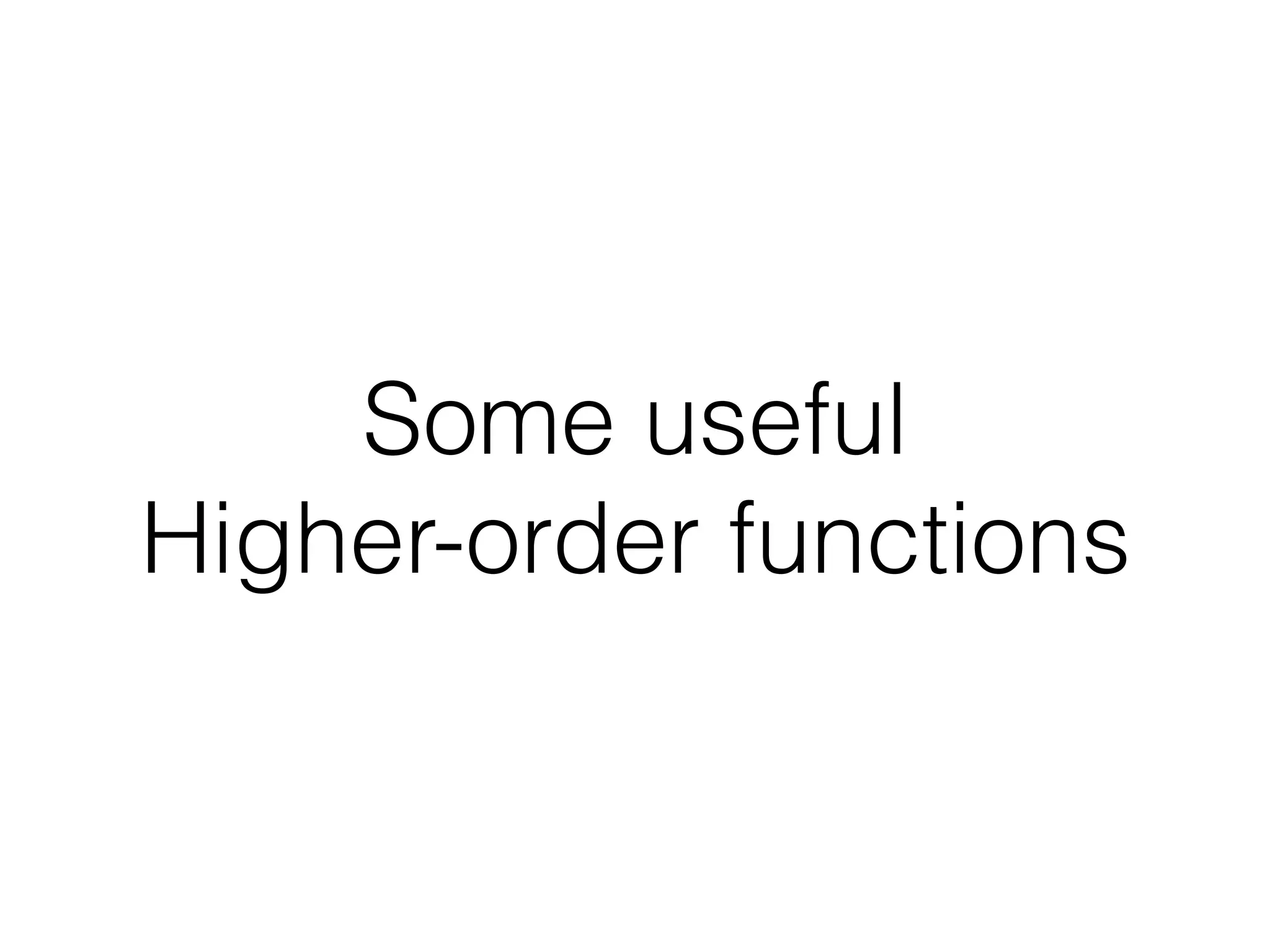
![Map
// map :: (a -> b) -> [a] -> [b]
$map = curry('array_map');
// Int -> Int
$addOne = function (int $x): int { return $x + 1; };
print_r($map($addOne, [1, 2, 3, 4, 5])); // [2, 3, 4, 5, 6]](https://image.slidesharecdn.com/keynote151216-161221233845/75/Functional-Programming-in-PHP-80-2048.jpg)
![Filter
// filter :: (a -> bool) -> [a] -> [a]
$filter = curry(function (callable $f, array $a): array {
return array_filter($a, $f);
});
// Int -> Bool
$isEven = function (int $x): bool { return $x % 2 === 0; };
print_r($filter($isEven, [1, 2, 3, 4, 5])); // [2, 4]](https://image.slidesharecdn.com/keynote151216-161221233845/75/Functional-Programming-in-PHP-81-2048.jpg)
![Left fold aka foldl
// foldl :: (a -> b -> a) -> a -> [b] -> a
$foldl = curry(function (callable $f, $acc, $head, ...$tail) {
$list = count($tail) > 0
? array_merge([$head], $tail)
: $head;
return array_reduce($list, $f, $acc);
});
// Int -> Int -> Int
$plus = curry(function (int $x, int $y): int { return $x + $y; });
// [Int] -> Int
$sum = $foldl($plus, 0);
echo $sum([1, 2, 3, 4, 5]); // 15
echo $sum(1, 2, 3, 4, 5); // 15](https://image.slidesharecdn.com/keynote151216-161221233845/75/Functional-Programming-in-PHP-82-2048.jpg)
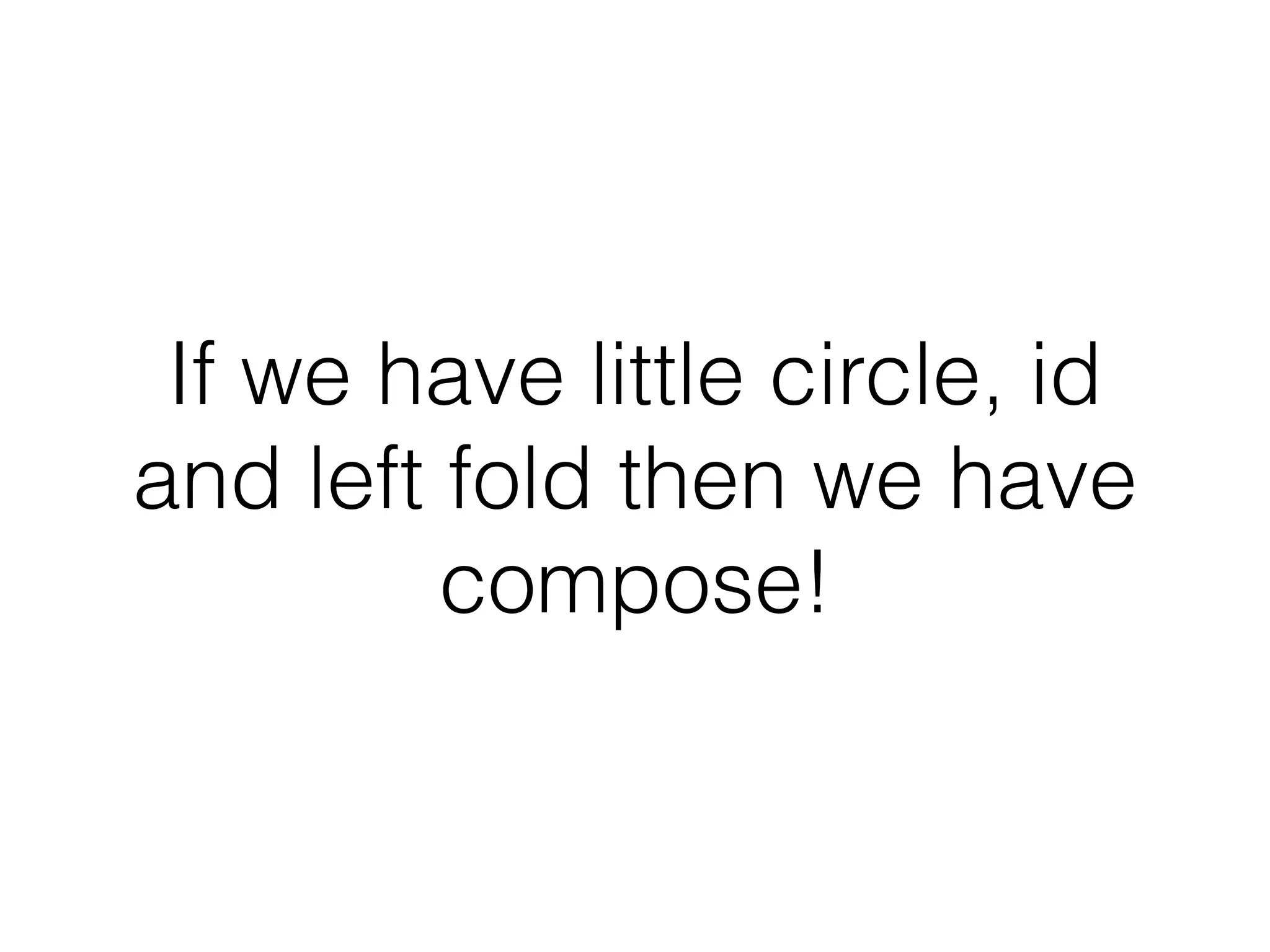
![$id = function ($x) { return $x; };
$o = function (callable $g, callable $f): Closure {
return function ($x) use ($g, $f) {
return $g($f($x));
};
};
$foldl = curry(function (callable $f, $acc, $head, ...$tail) {
$list = count($tail) > 0
? array_merge([$head], $tail)
: $head;
return array_reduce($list, $f, $acc);
});](https://image.slidesharecdn.com/keynote151216-161221233845/75/Functional-Programming-in-PHP-84-2048.jpg)
![$id = function ($x) { return $x; };
$o = function (callable $g, callable $f): Closure {
return function ($x) use ($g, $f) {
return $g($f($x));
};
};
$foldl = curry(function (callable $f, $acc, $head, ...$tail) {
$list = count($tail) > 0
? array_merge([$head], $tail)
: $head;
return array_reduce($list, $f, $acc);
});
$compose = $foldl($o, $id);
$f = function (string $s): string { return 'f'.$s; };
$g = function (string $s): string { return 'g'.$s; };
$h = function (string $s): string { return 'h'.$s; };
$hgf = $compose($h, $g, $f);
echo $hgf(''); // 'hgf'](https://image.slidesharecdn.com/keynote151216-161221233845/75/Functional-Programming-in-PHP-85-2048.jpg)
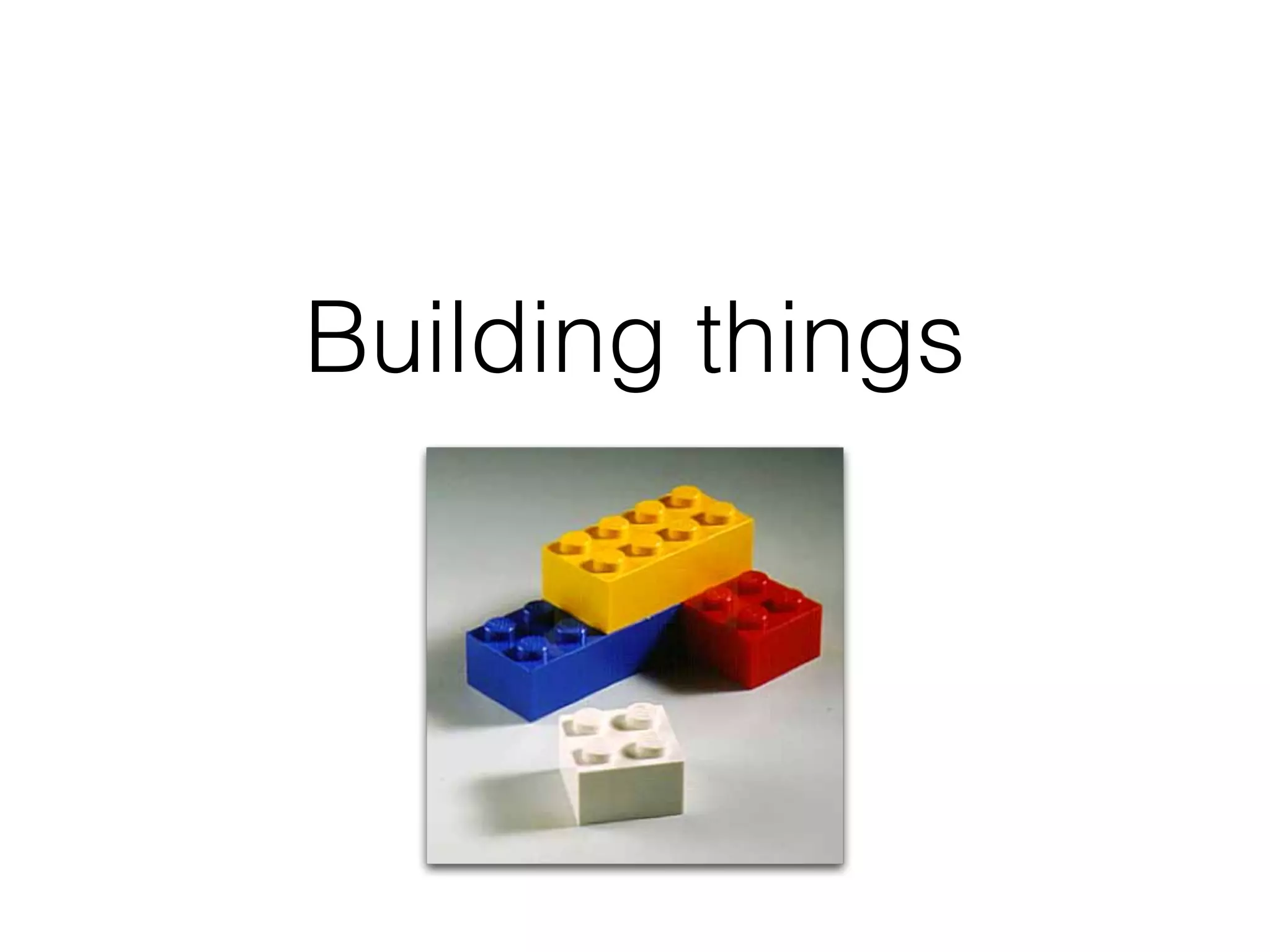
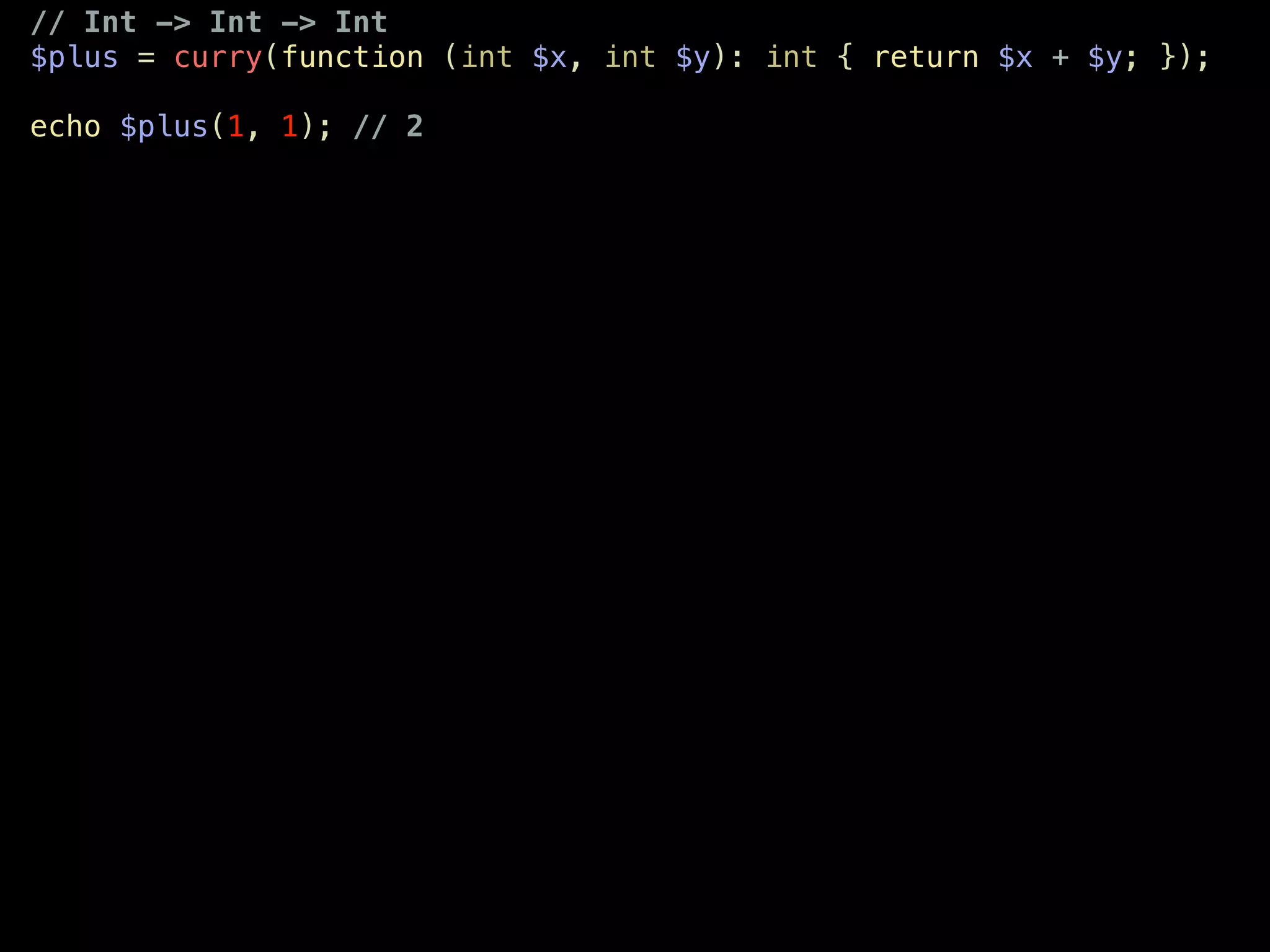
![// Int -> Int -> Int
$plus = curry(function (int $x, int $y): int { return $x + $y; });
echo $plus(1, 1); // 2
// [Int] -> Int
$sum = $foldl($plus, 0);
echo $sum([1, 2, 3, 4, 5]); // 15](https://image.slidesharecdn.com/keynote151216-161221233845/75/Functional-Programming-in-PHP-88-2048.jpg)
![// Int -> Int -> Int
$plus = curry(function (int $x, int $y): int { return $x + $y; });
echo $plus(1, 1); // 2
// [Int] -> Int
$sum = $foldl($plus, 0);
echo $sum([1, 2, 3, 4, 5]); // 15
// [[Int]] -> Int
$sumMatrix = $compose($sum, $map($sum));
$matrix = [
[1, 1, 1, 1, 1],
[2, 2, 2, 2, 2],
[3, 3, 3, 3, 3],
[4, 4, 4, 4, 4],
[5, 5, 5, 5, 5],
];
echo $sumMatrix($matrix); // 75](https://image.slidesharecdn.com/keynote151216-161221233845/75/Functional-Programming-in-PHP-89-2048.jpg)
![// Int -> Int -> Int
$plus = curry(function (int $x, int $y): int { return $x + $y; });
echo $plus(1, 1); // 2
// [Int] -> Int
$sum = $foldl($plus, 0);
echo $sum([1, 2, 3, 4, 5]); // 15
// [[Int]] -> Int
$sumMatrix = $compose($sum, $map($sum));
$matrix = [
[1, 1, 1, 1, 1],
[2, 2, 2, 2, 2],
[3, 3, 3, 3, 3],
[4, 4, 4, 4, 4],
[5, 5, 5, 5, 5],
];
echo $sumMatrix($matrix); // 75
// [[Int]] -> [[Int]]
$addOneToMatrix = $map($map($plus(1)));
echo $sumMatrix($addOneToMatrix($matrix)); // 100](https://image.slidesharecdn.com/keynote151216-161221233845/75/Functional-Programming-in-PHP-90-2048.jpg)
![// slice :: String -> String -> [String]
$slice = curry('explode');
// concat :: String -> [String] -> String
$concat = curry('implode');
// concat :: String -> String -> Bool
$match = curry('preg_match');](https://image.slidesharecdn.com/keynote151216-161221233845/75/Functional-Programming-in-PHP-91-2048.jpg)
![// slice :: String -> String -> [String]
$slice = curry('explode');
// concat :: String -> [String] -> String
$concat = curry('implode');
// concat :: String -> String -> Bool
$match = curry('preg_match');
// head :: String -> Char
$head = function (string $s): string { return $s[0]; };
// isWord :: String -> Bool
$isWord = $match('/[a-z]/i');](https://image.slidesharecdn.com/keynote151216-161221233845/75/Functional-Programming-in-PHP-92-2048.jpg)
![// slice :: String -> String -> [String]
$slice = curry('explode');
// concat :: String -> [String] -> String
$concat = curry('implode');
// concat :: String -> String -> Bool
$match = curry('preg_match');
// head :: String -> Char
$head = function (string $s): string { return $s[0]; };
// isWord :: String -> Bool
$isWord = $match('/[a-z]/i');
// initials :: String -> String
$initials = $compose(
$concat(' '),
$map('strtoupper'),
$map($head),
$filter($isWord),
$slice(' ')
);
echo $initials('This is rather cool :)'); // T I R C](https://image.slidesharecdn.com/keynote151216-161221233845/75/Functional-Programming-in-PHP-93-2048.jpg)
![// slice :: String -> String -> [String]
$slice = curry('explode');
// concat :: String -> [String] -> String
$concat = curry('implode');
// concat :: String -> String -> Bool
$match = curry('preg_match');
// head :: String -> Char
$head = function (string $s): string { return $s[0]; };
// isWord :: String -> Bool
$isWord = $match('/[a-z]/i');
// initials :: String -> String
$initials = $compose(
$concat(' '),
$map($compose('strtoupper', $head)),
$filter($isWord),
$slice(' ')
);
echo $initials('This is rather cool :)'); // T I R C](https://image.slidesharecdn.com/keynote151216-161221233845/75/Functional-Programming-in-PHP-94-2048.jpg)
![// slice :: String -> String -> [String]
$slice = curry('explode');
// concat :: String -> [String] -> String
$concat = curry('implode');
// concat :: String -> String -> Bool
$match = curry('preg_match');
// head :: String -> Char
$head = function (string $s): string { return $s[0]; };
// isWord :: String -> Bool
$isWord = $match('/[a-z]/i');
// initials :: String -> String
$initials = $compose(
$concat(' '),
$map($compose('strtoupper', $head)),
$filter($isWord),
$slice(' ')
);
echo $initials('This is rather cool :)'); // T I R C
Optimisation for free](https://image.slidesharecdn.com/keynote151216-161221233845/75/Functional-Programming-in-PHP-95-2048.jpg)
